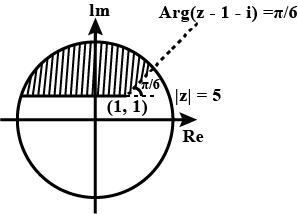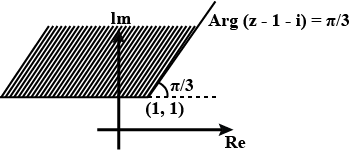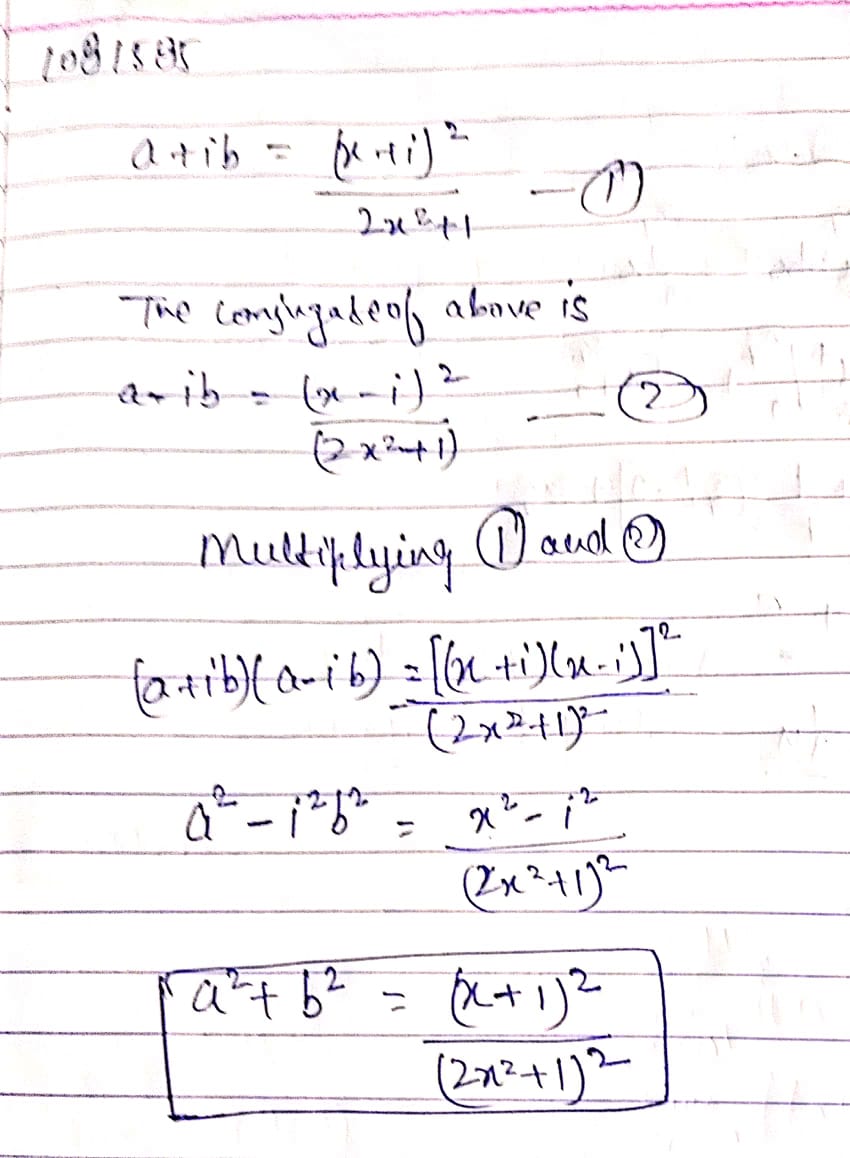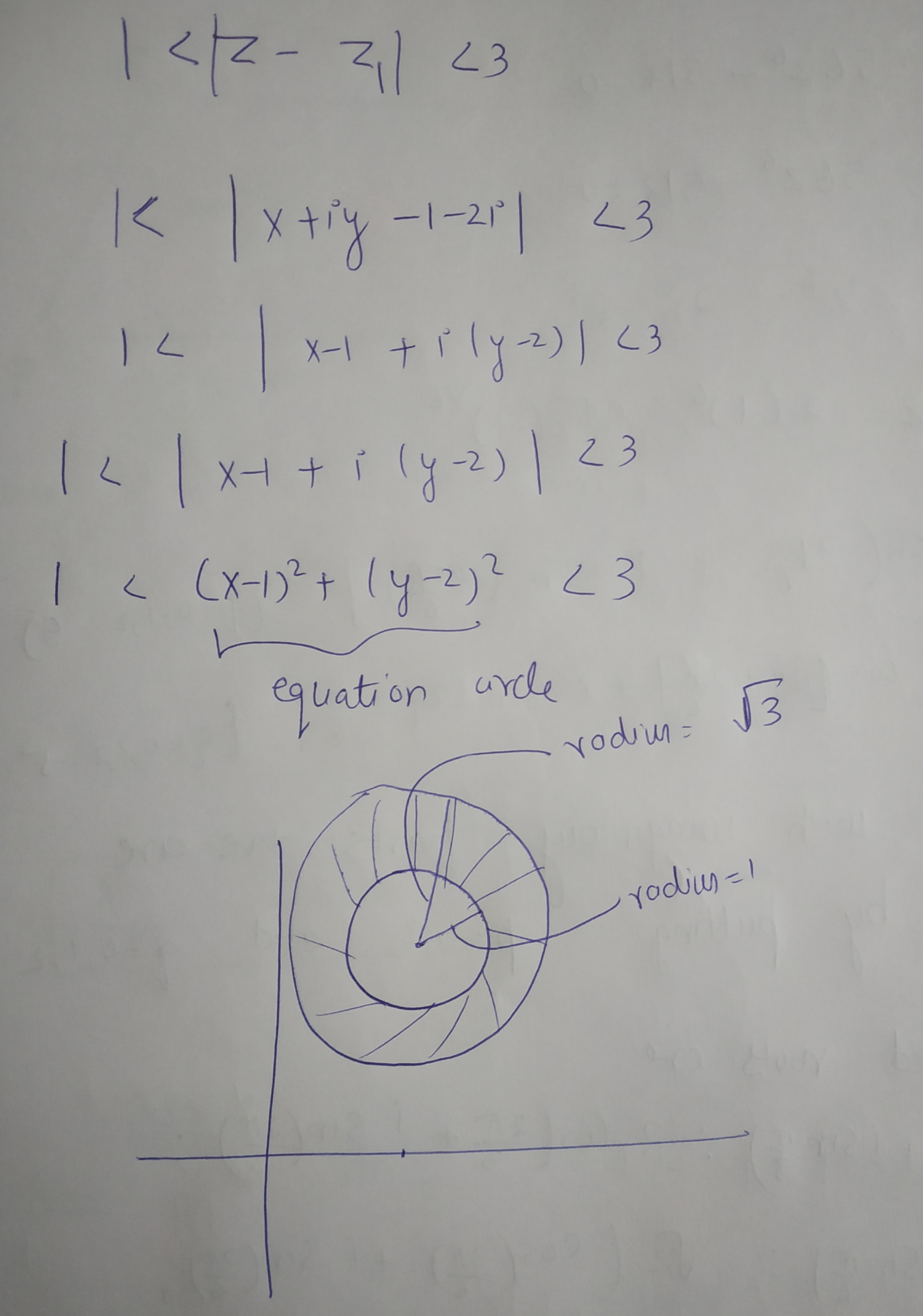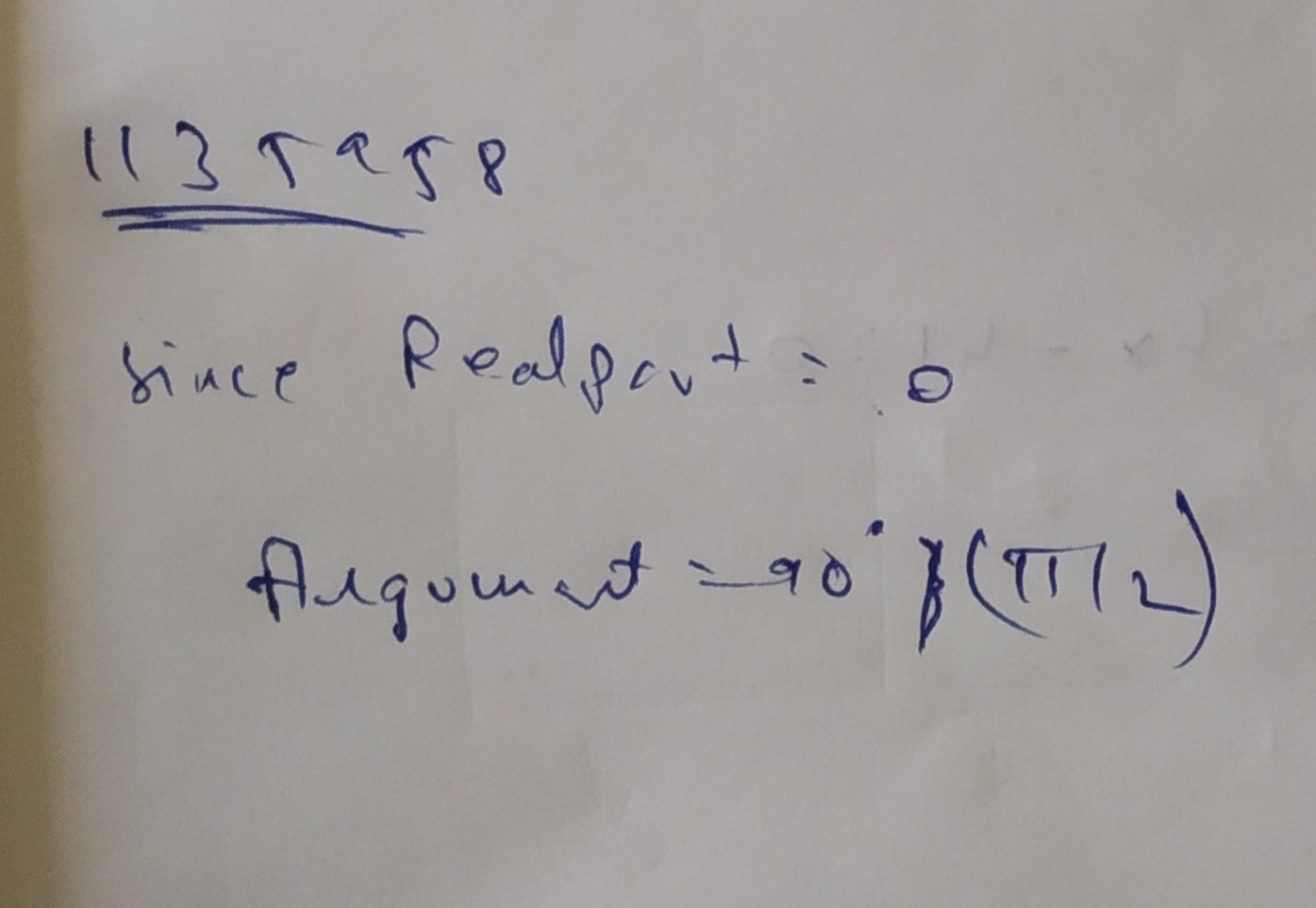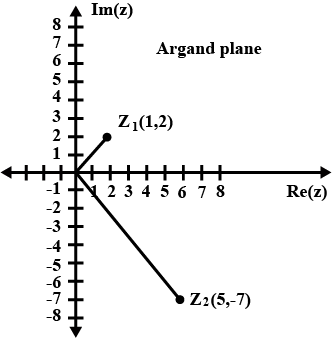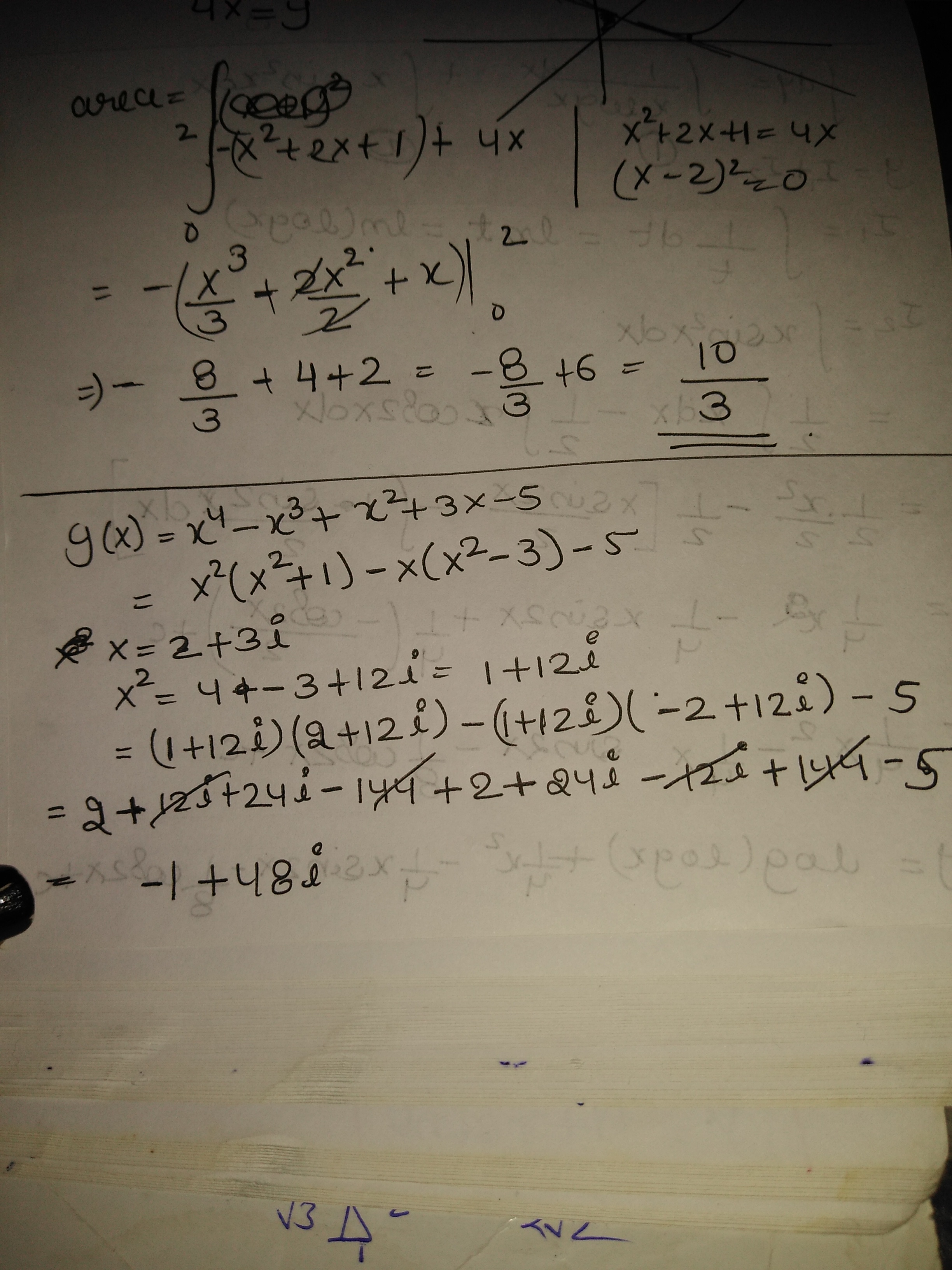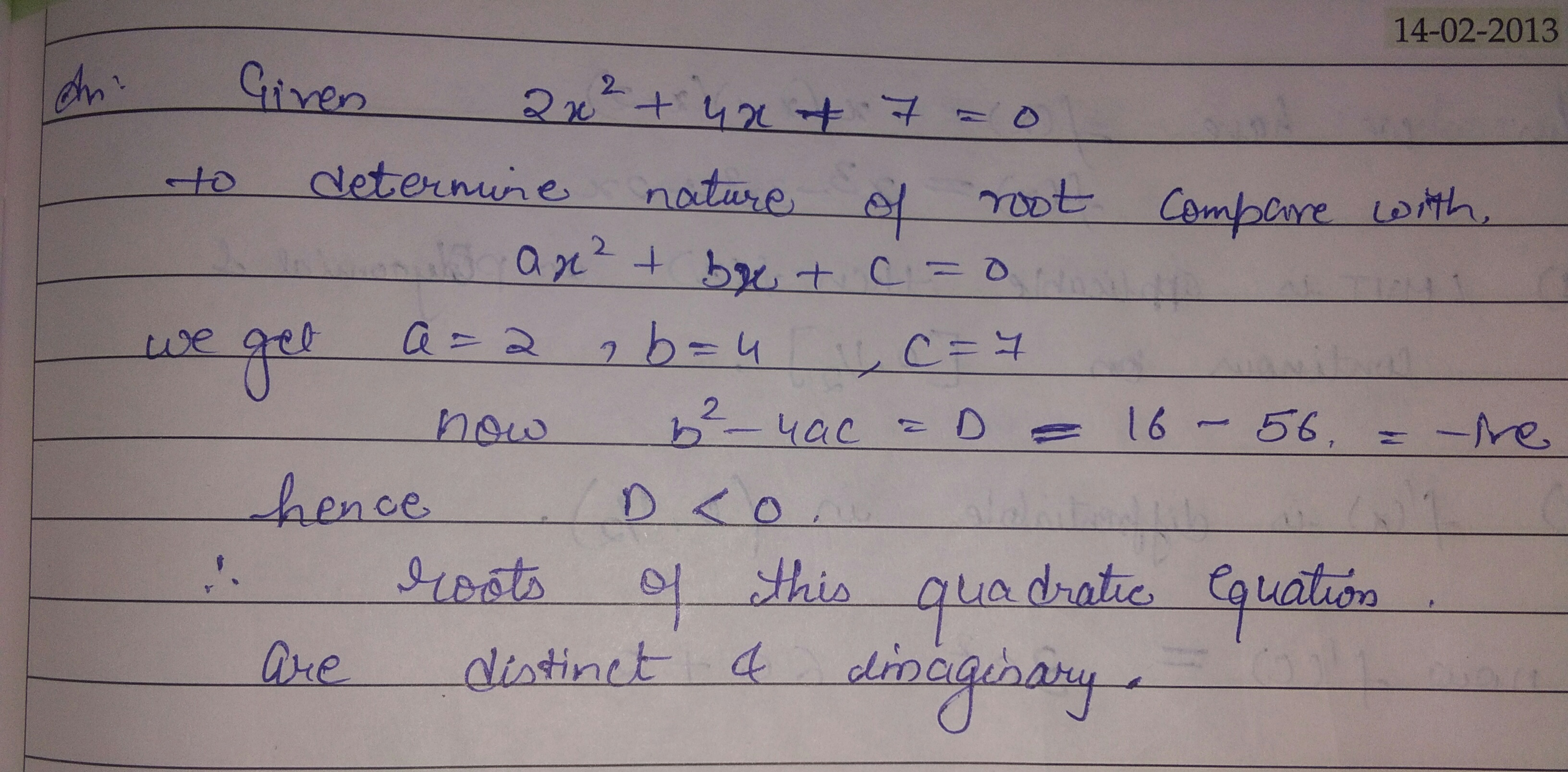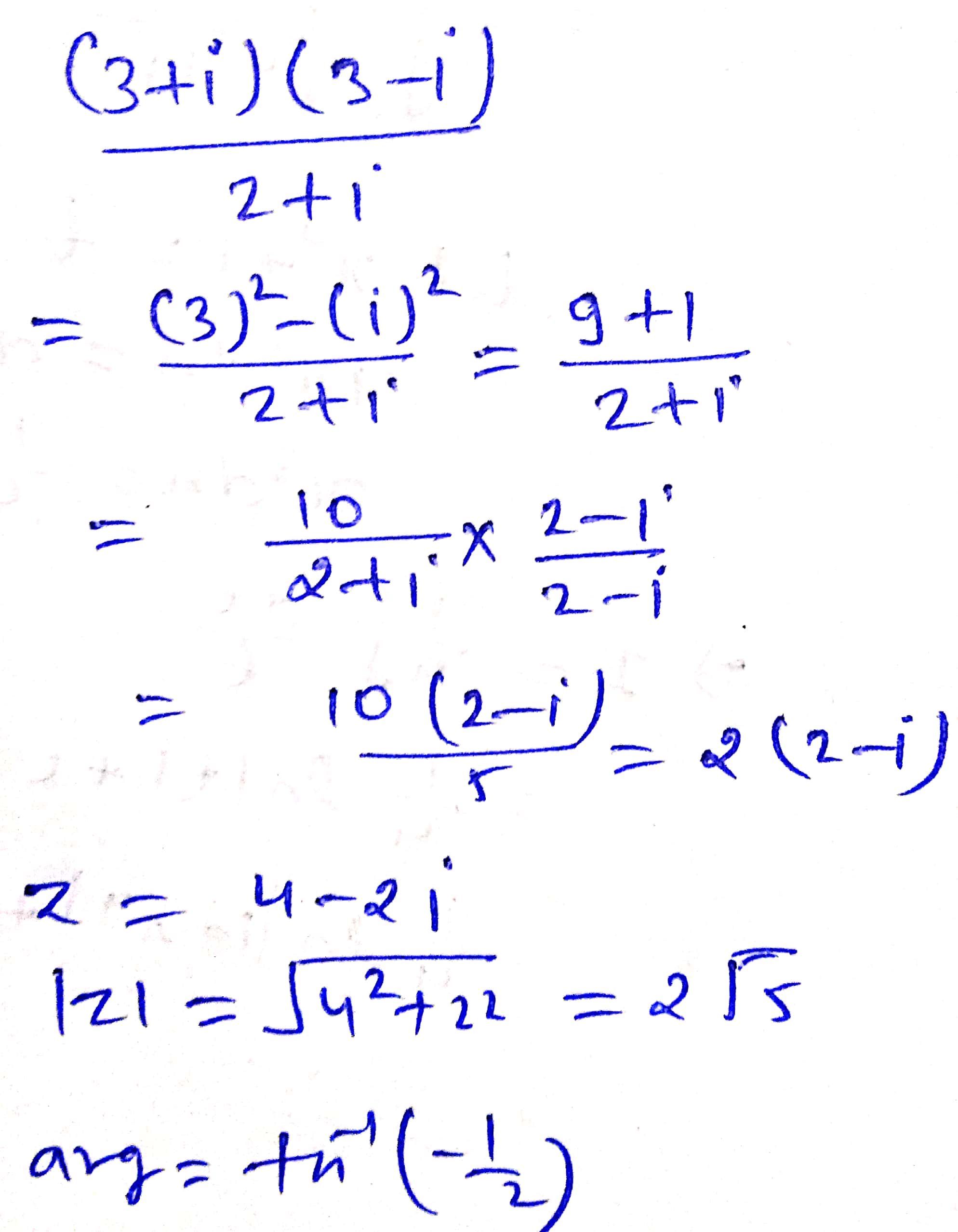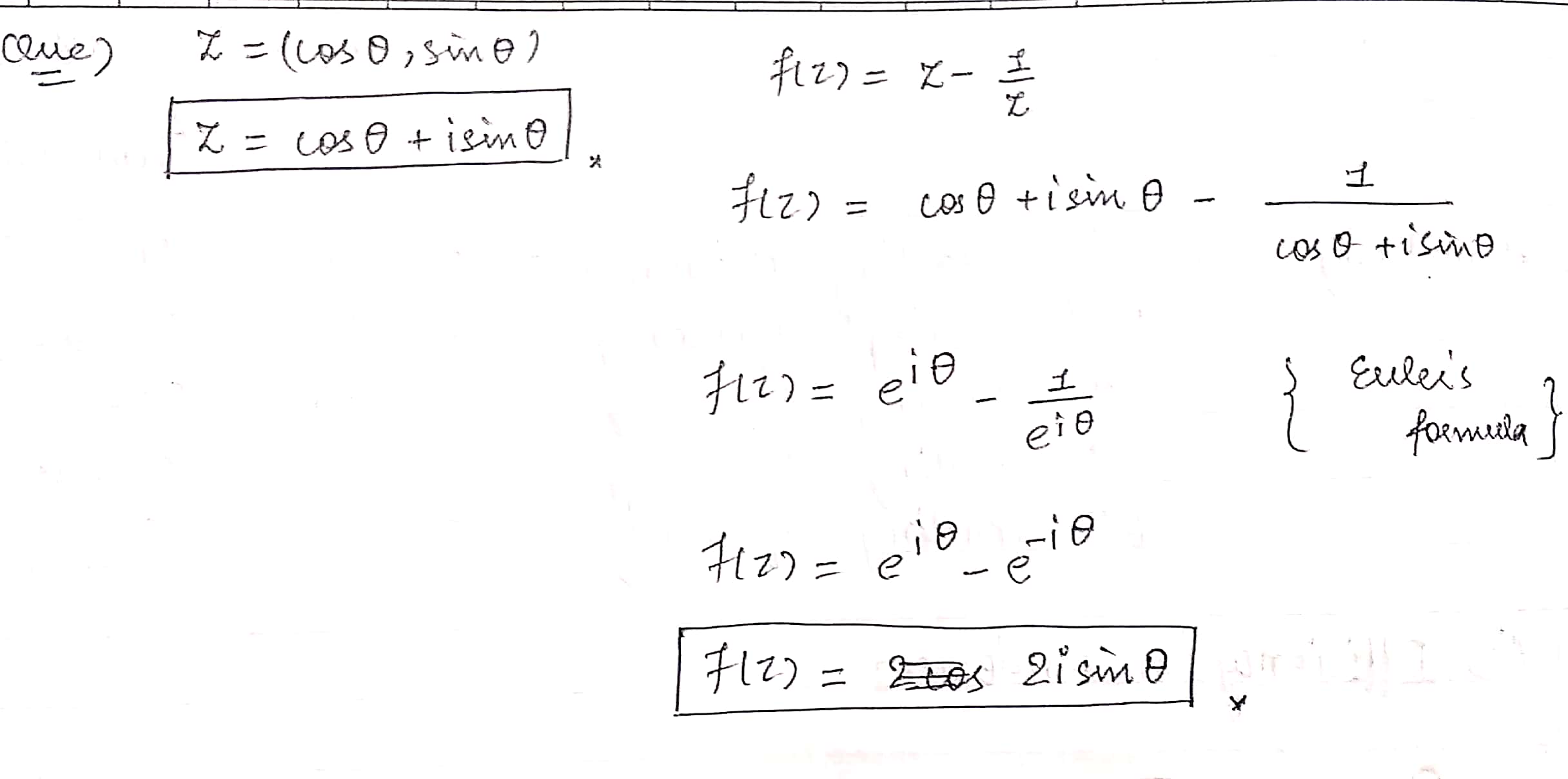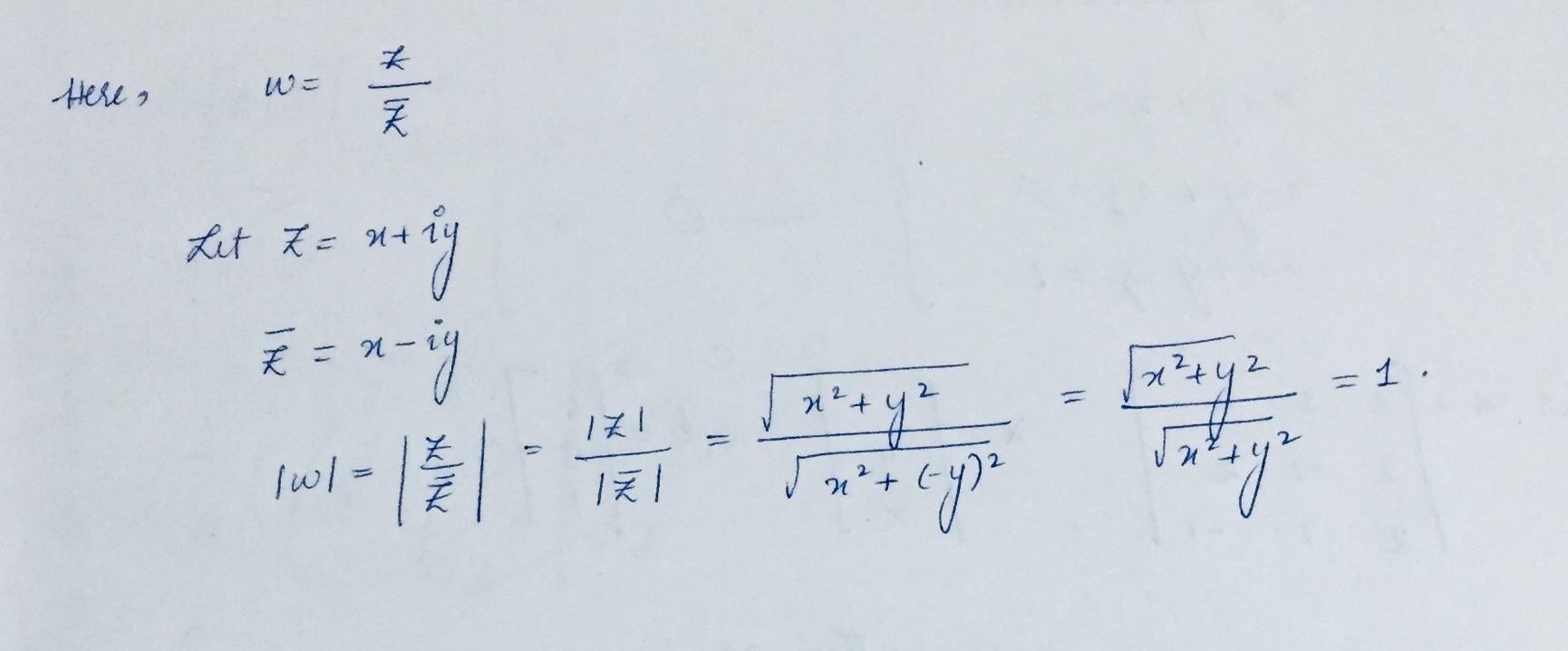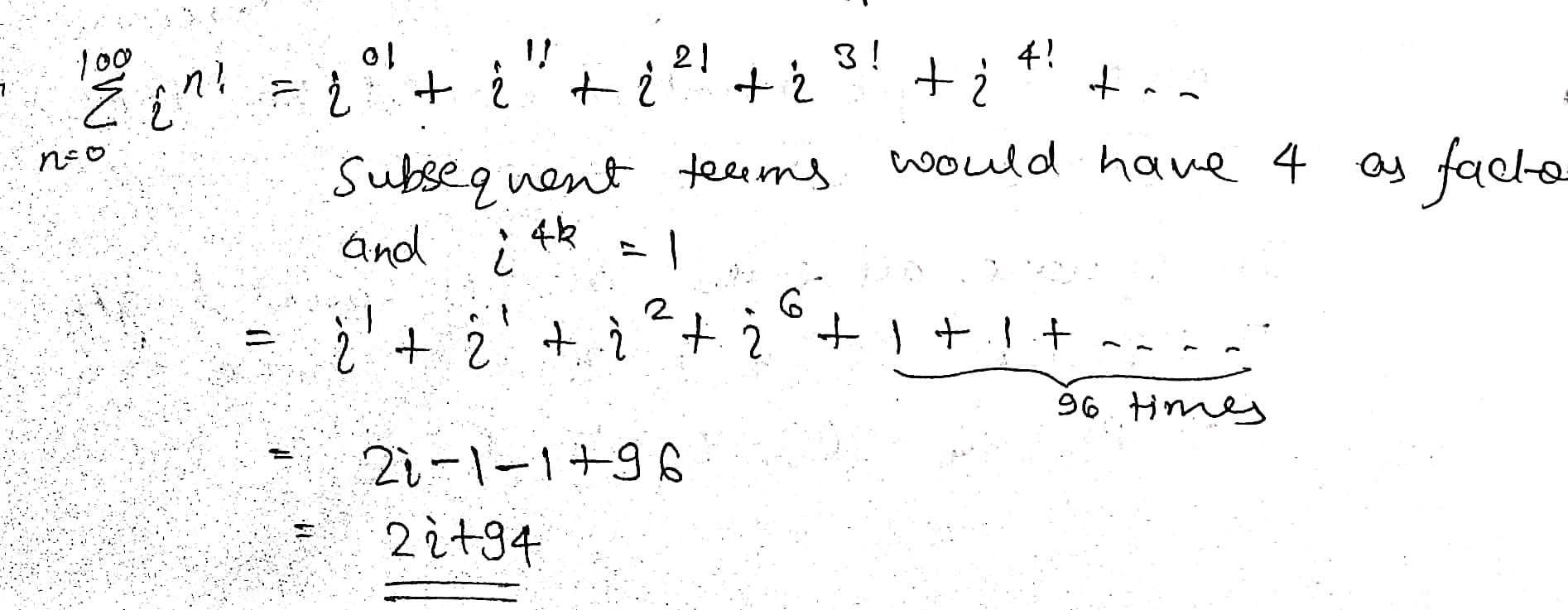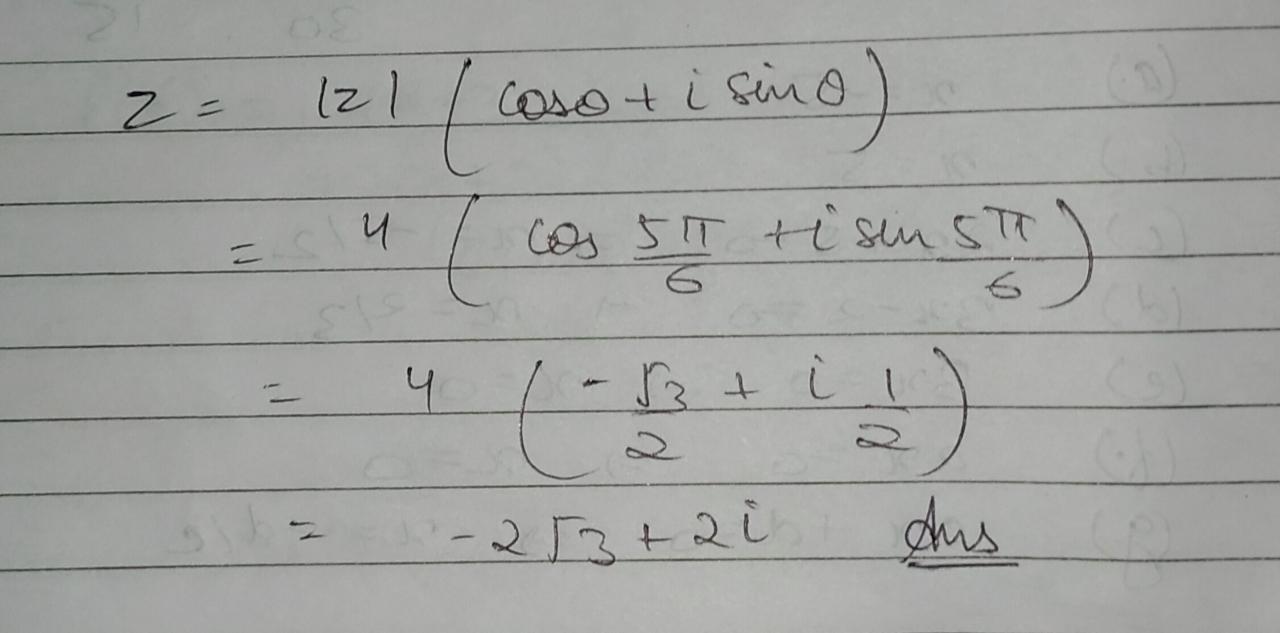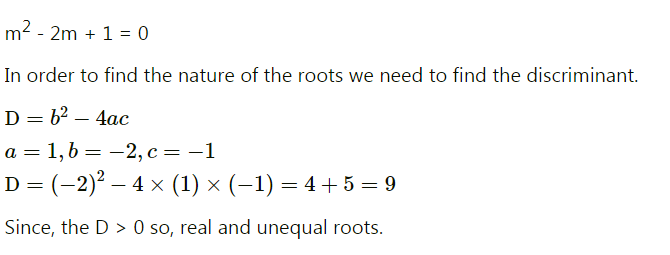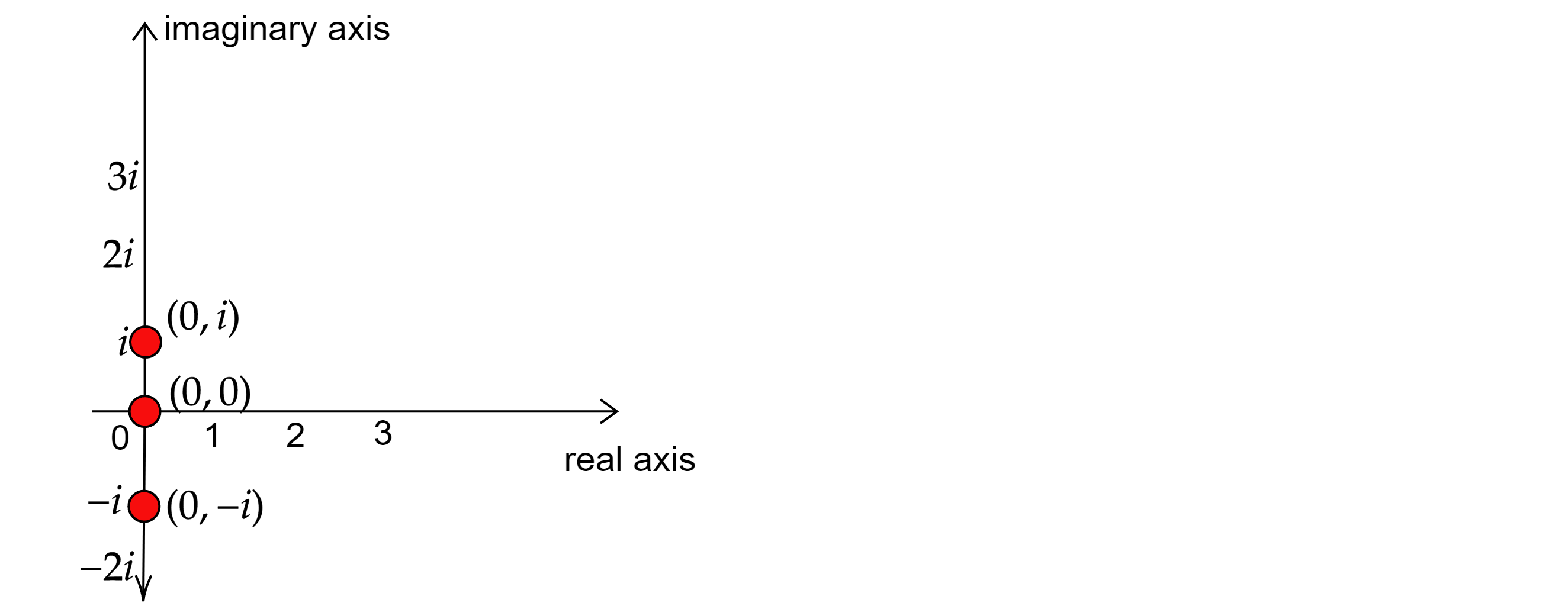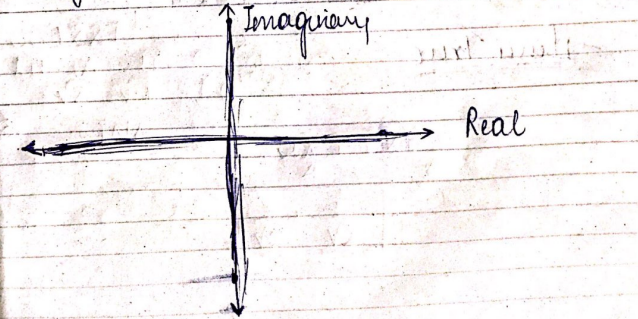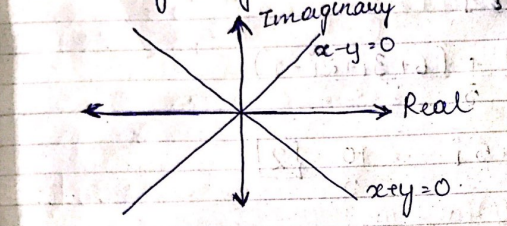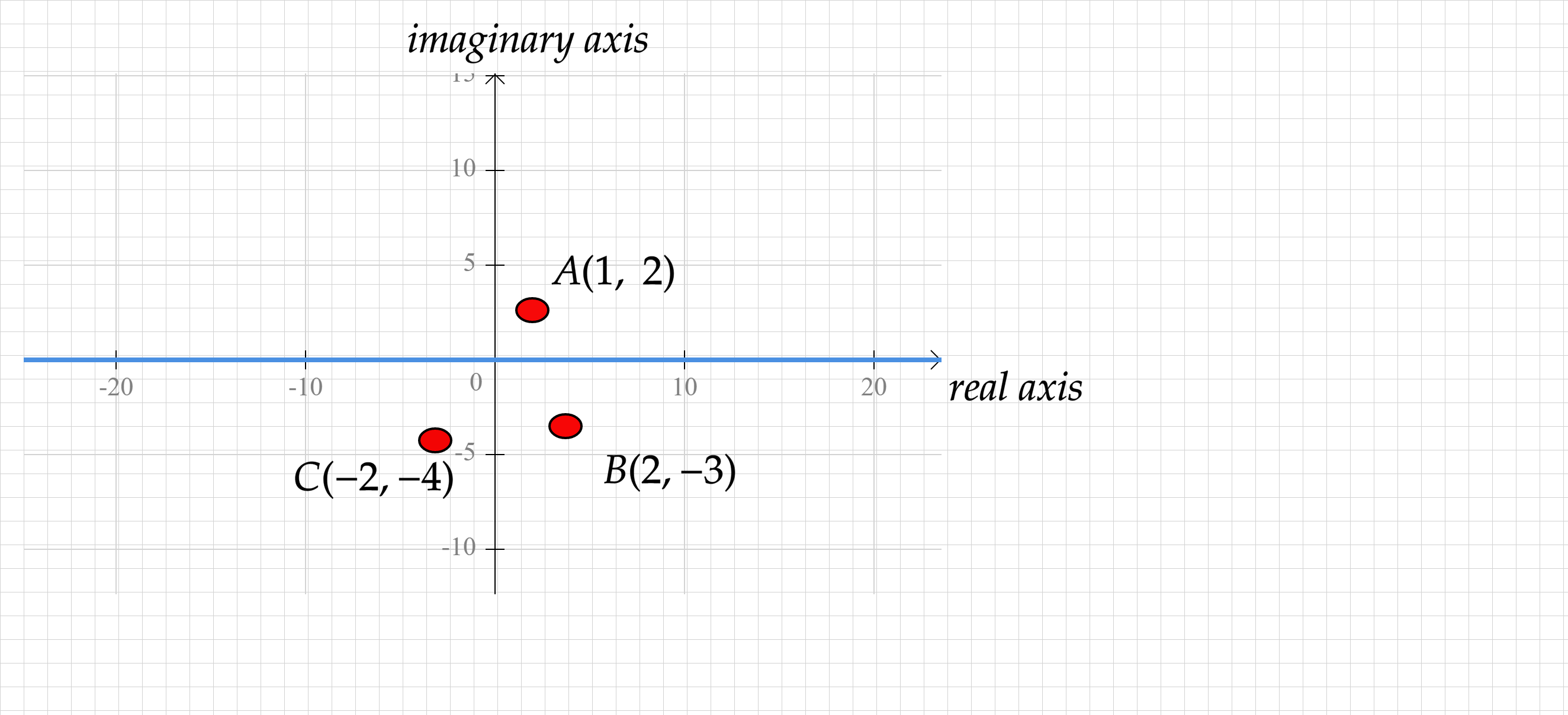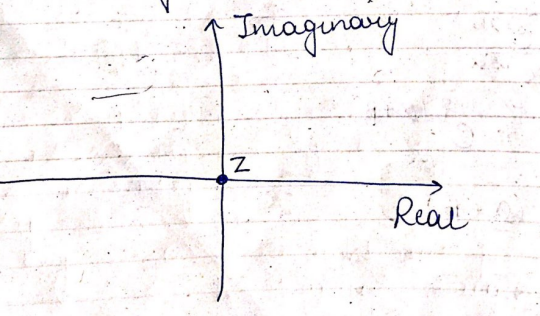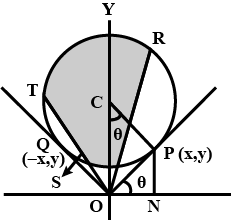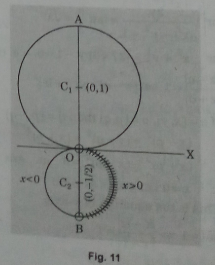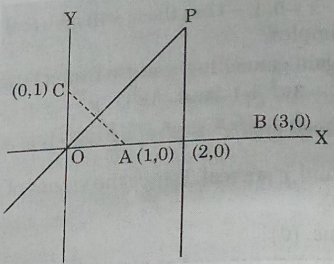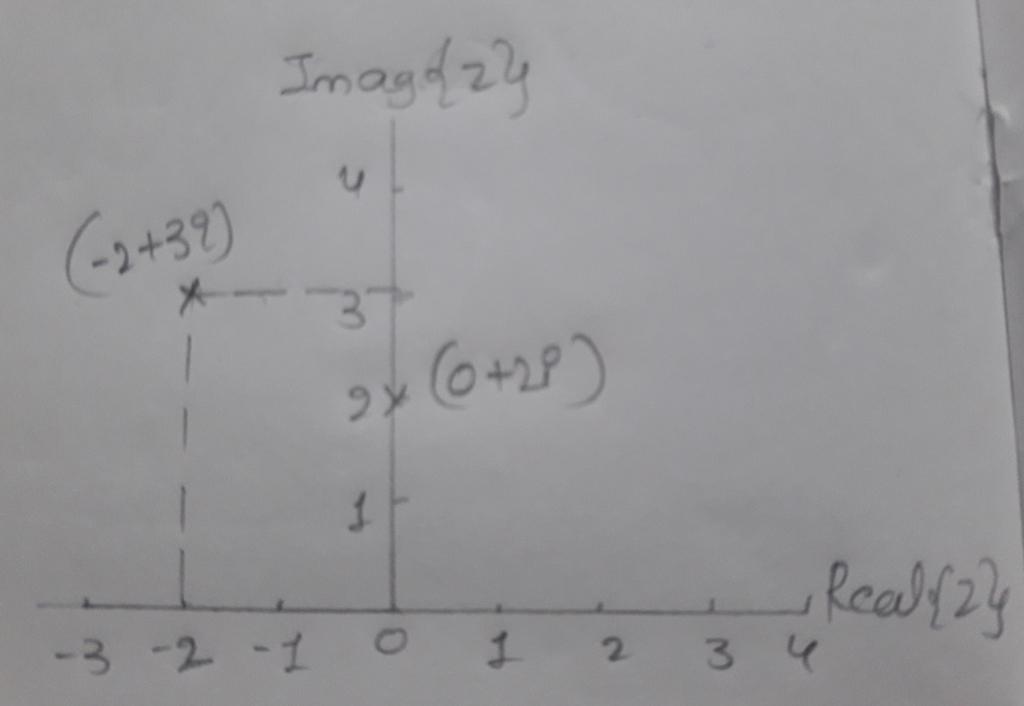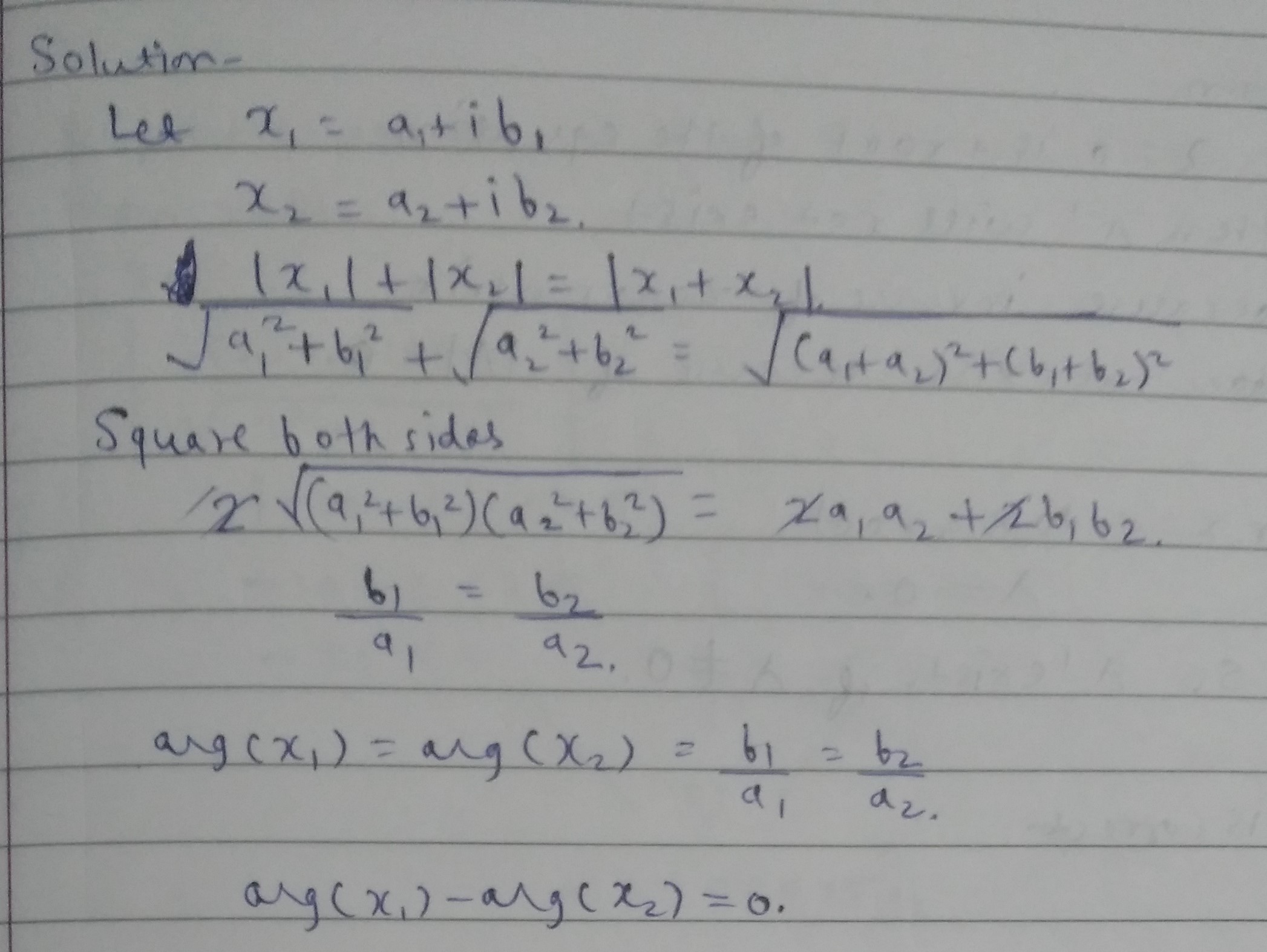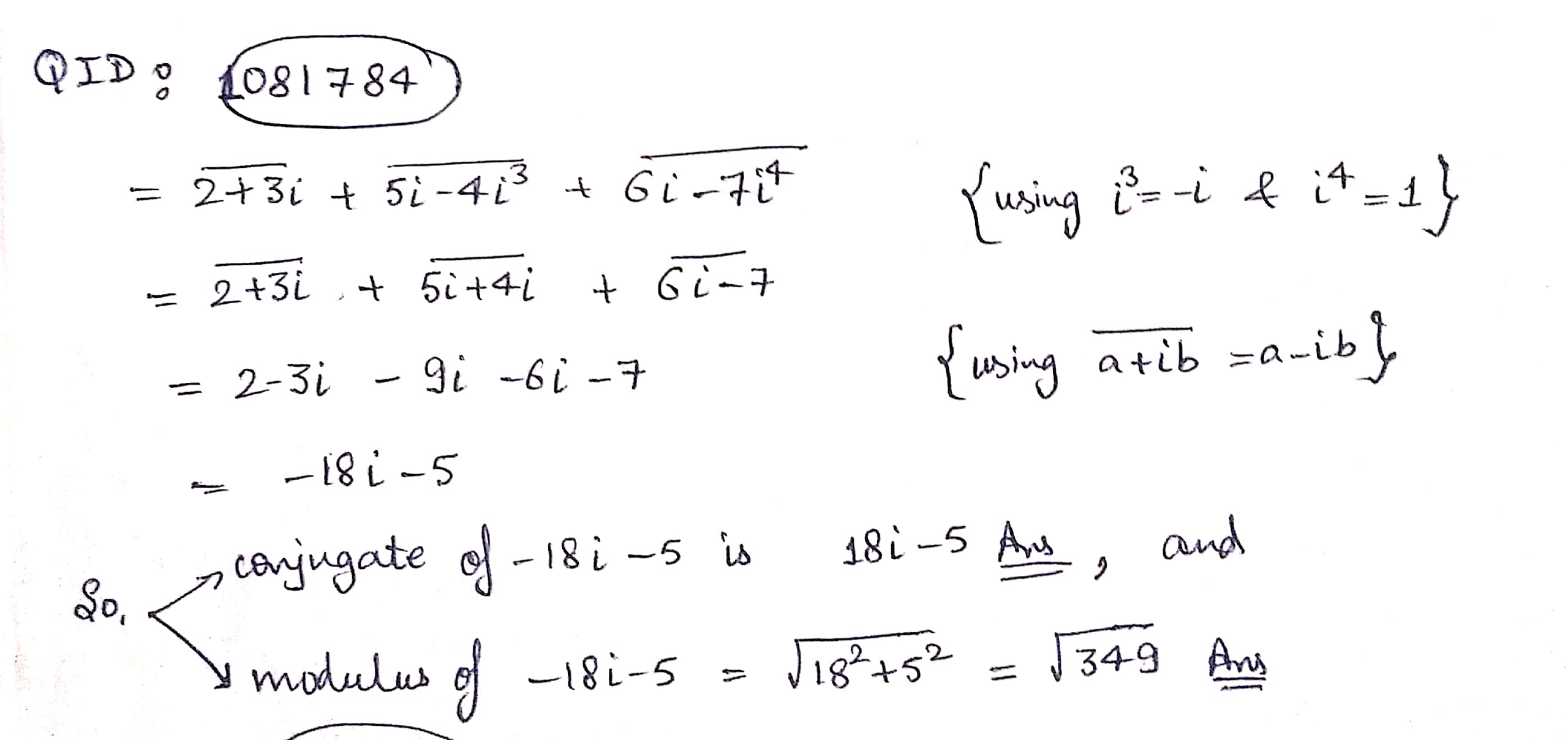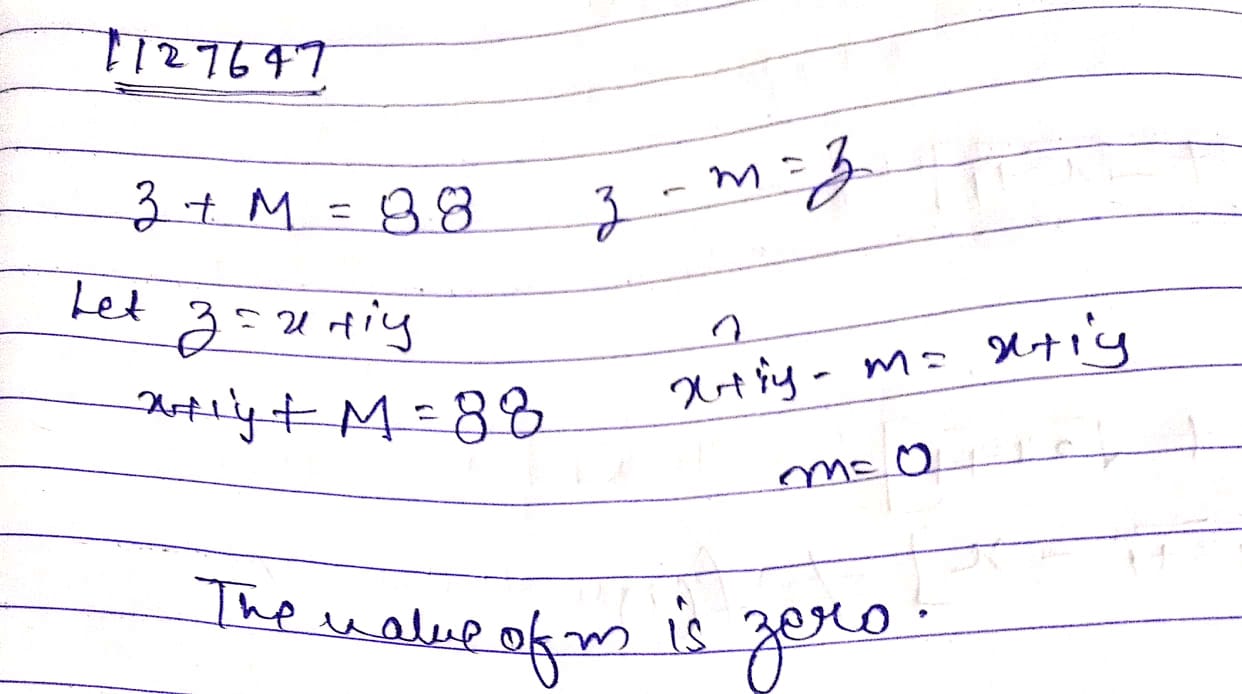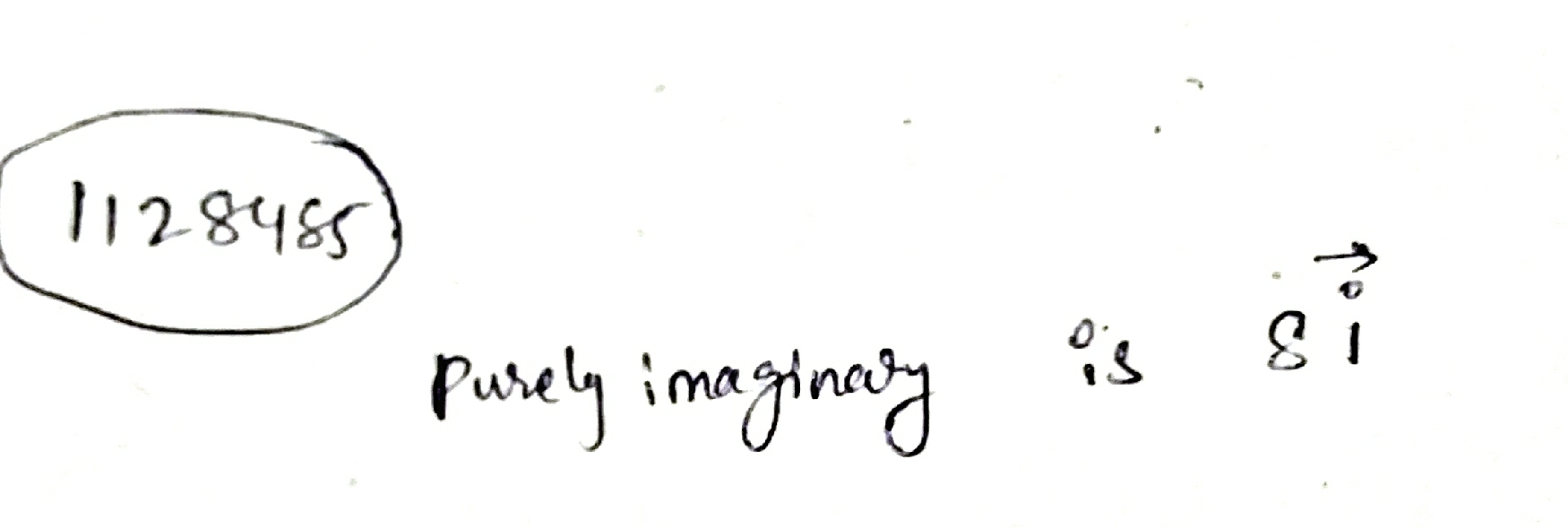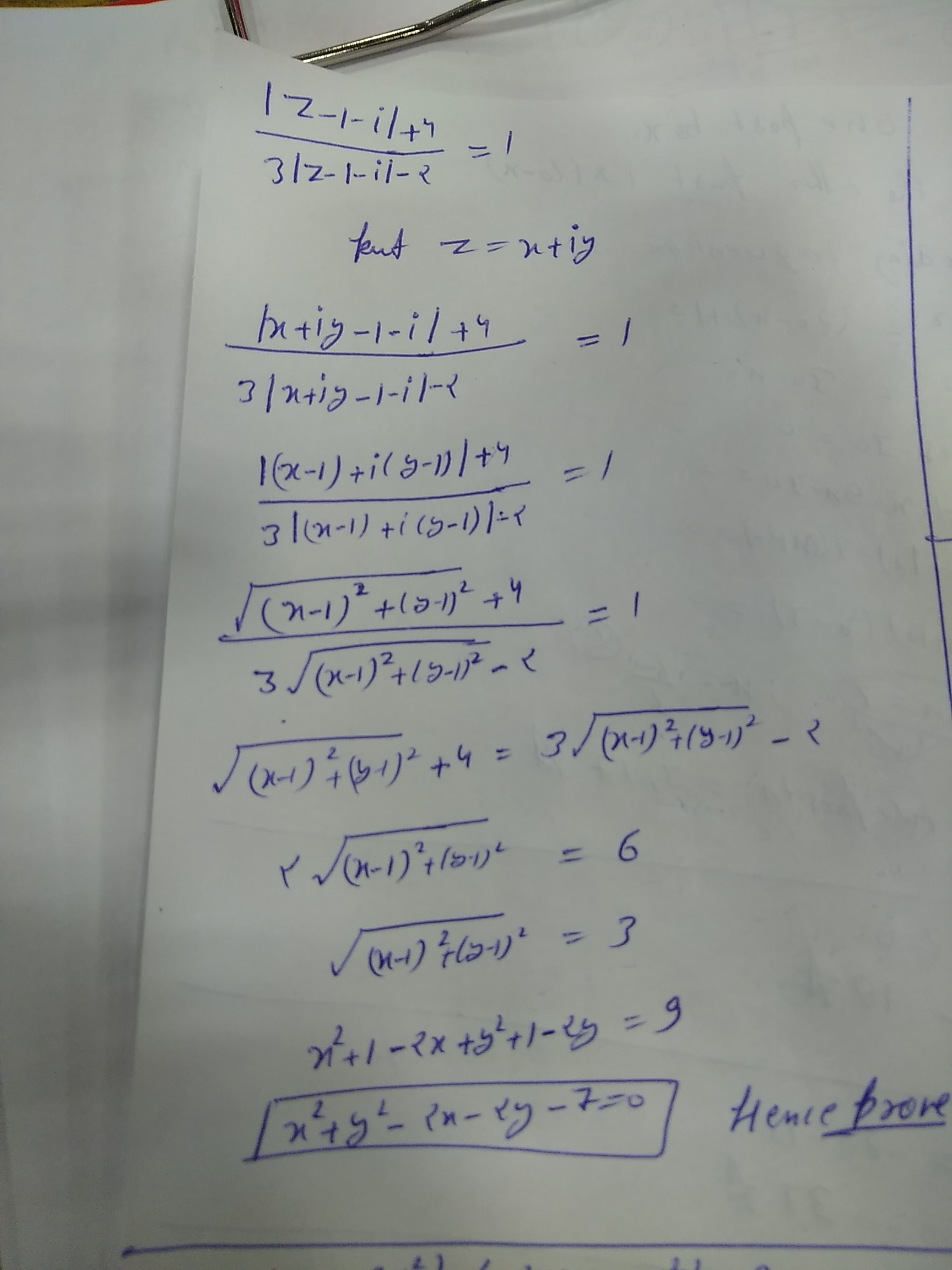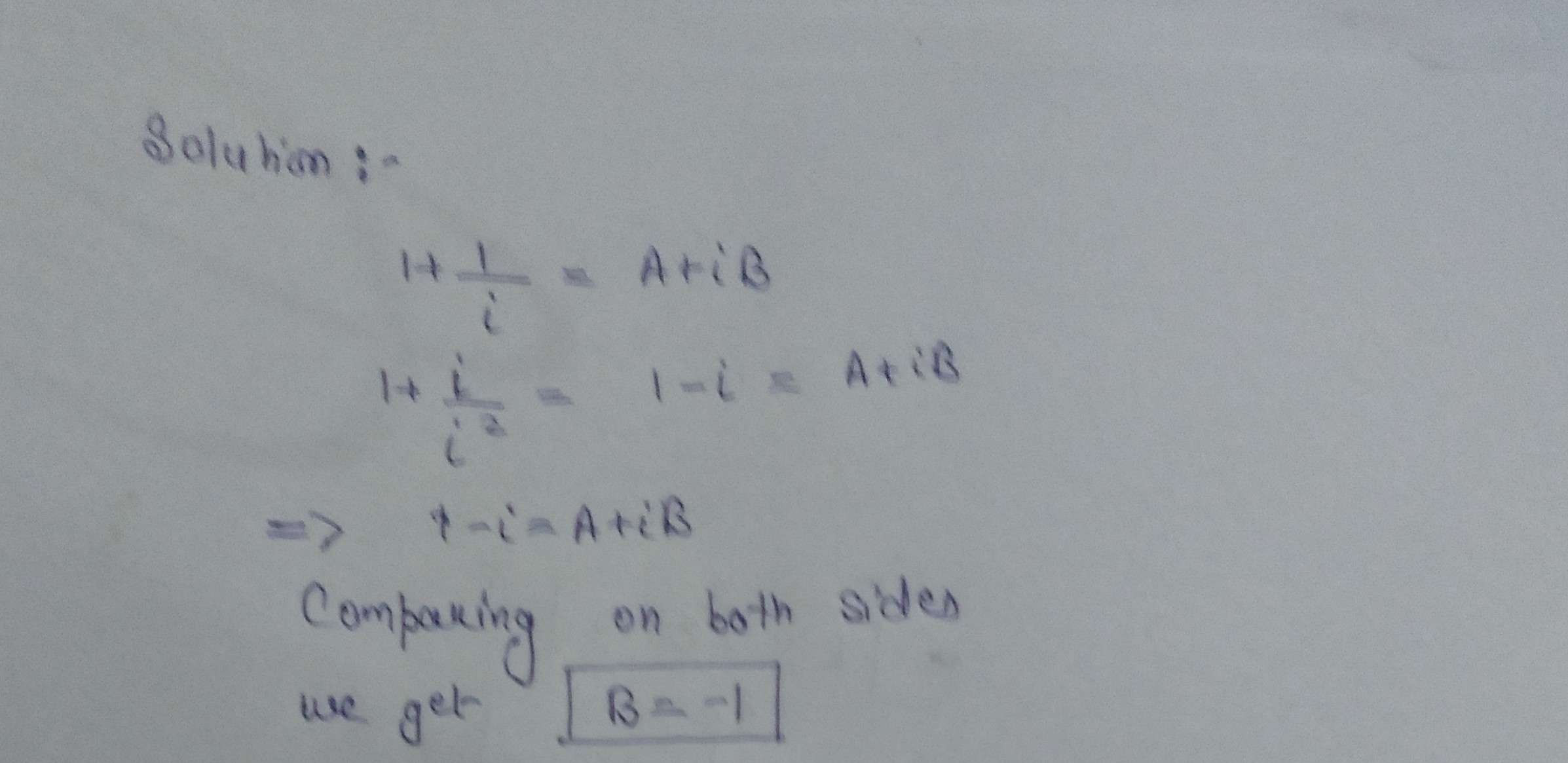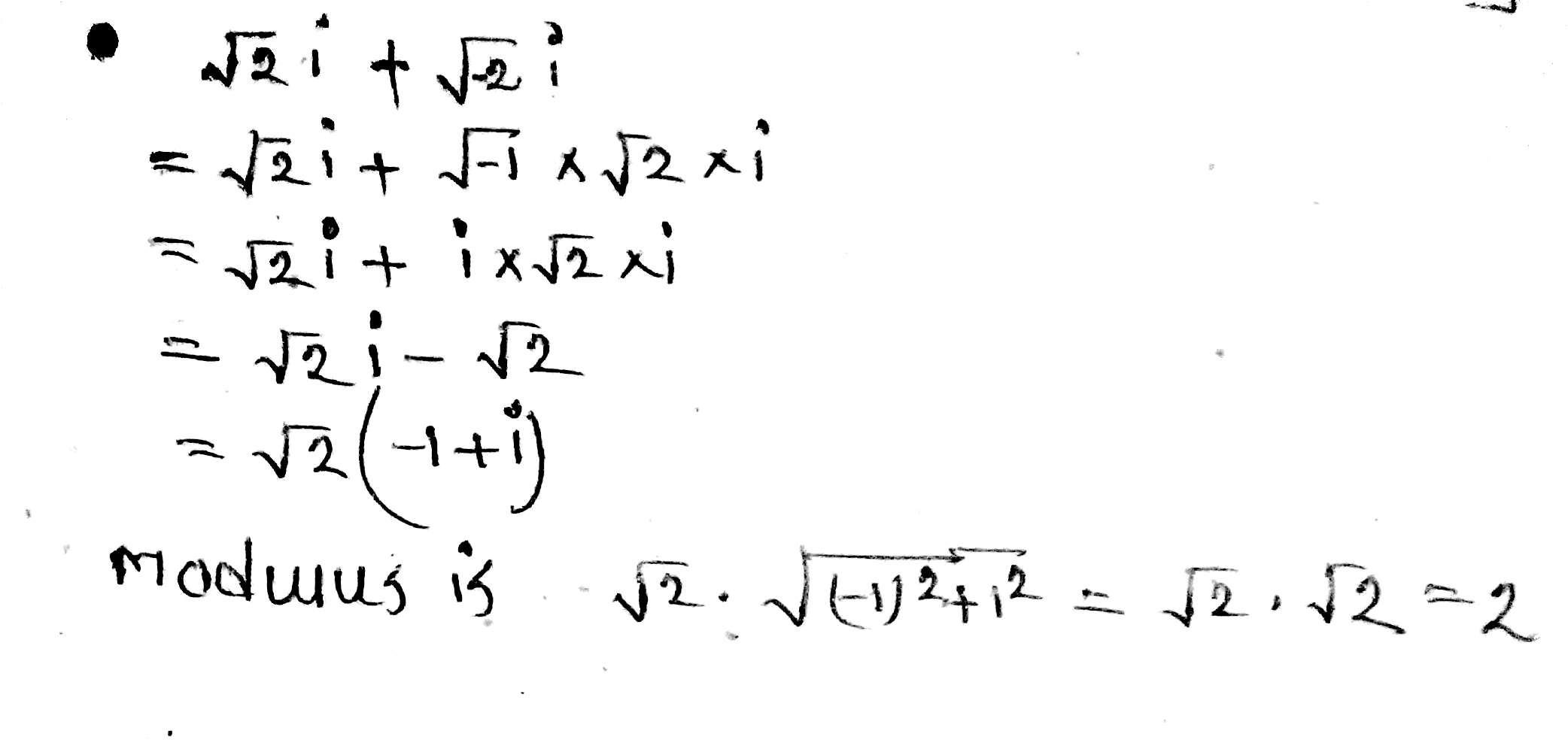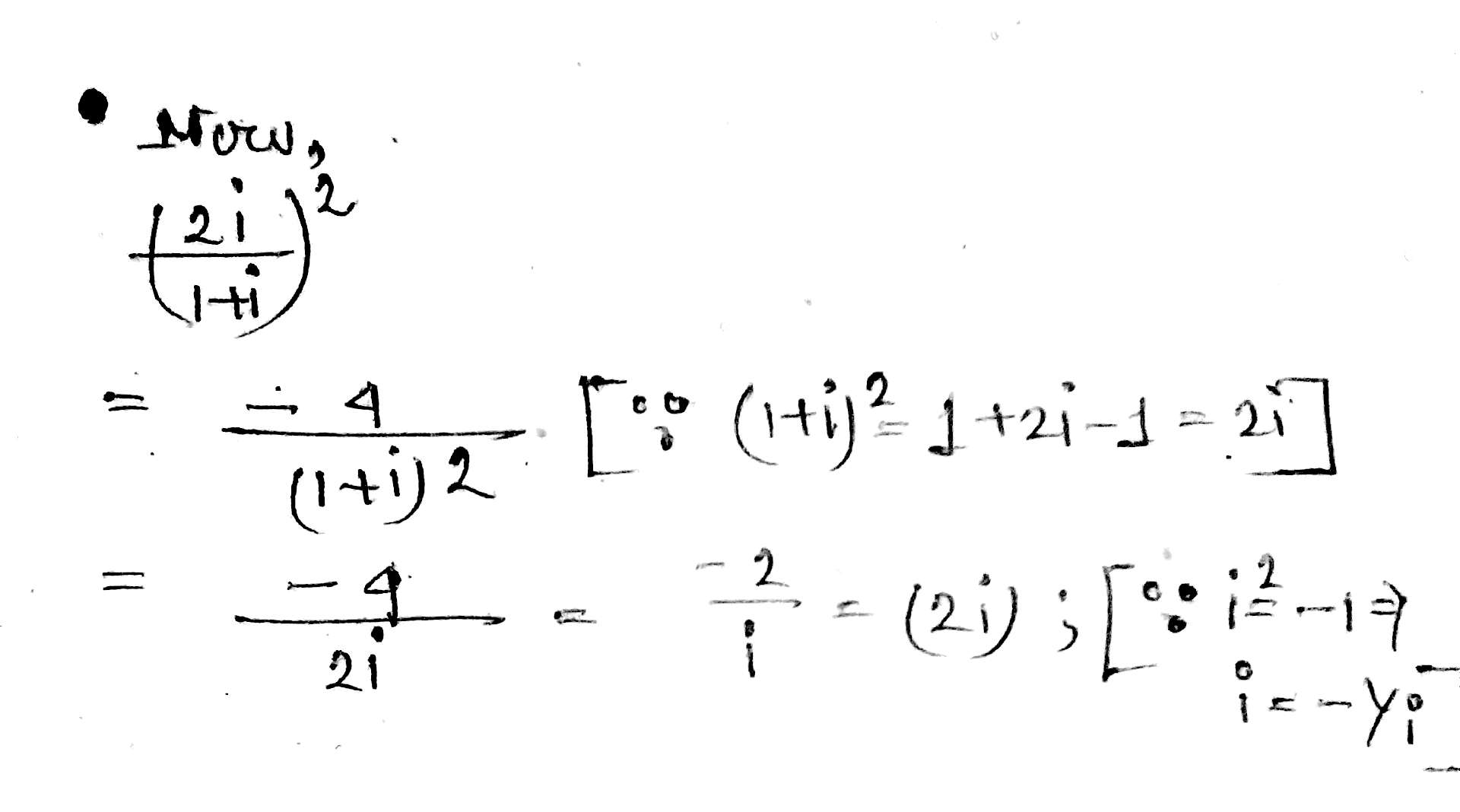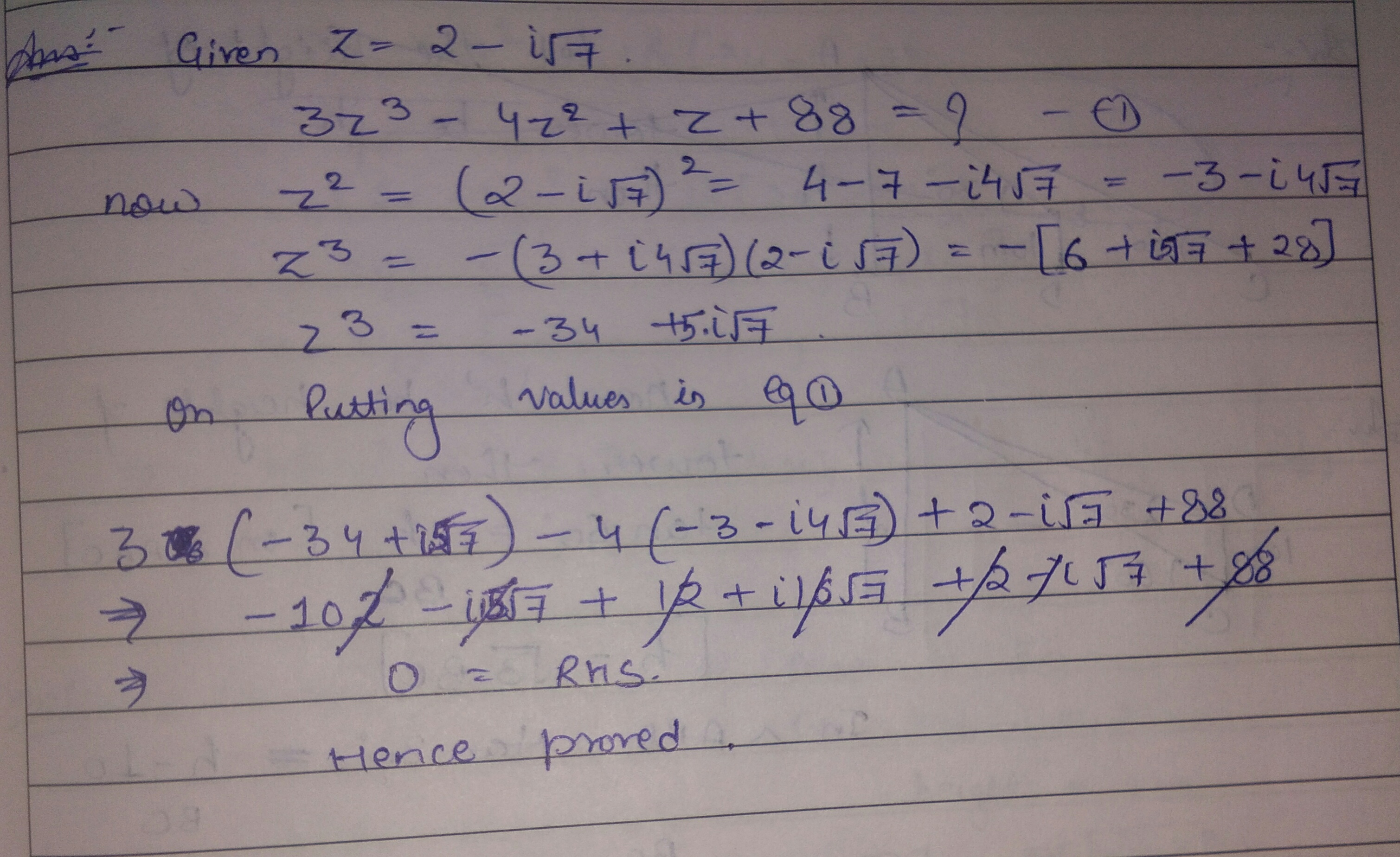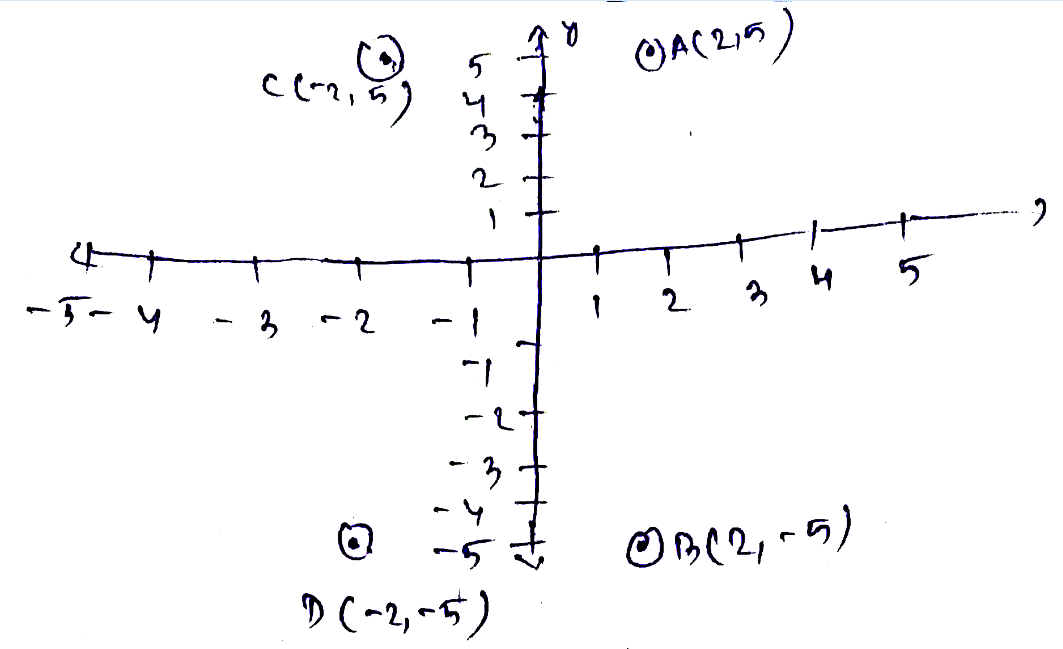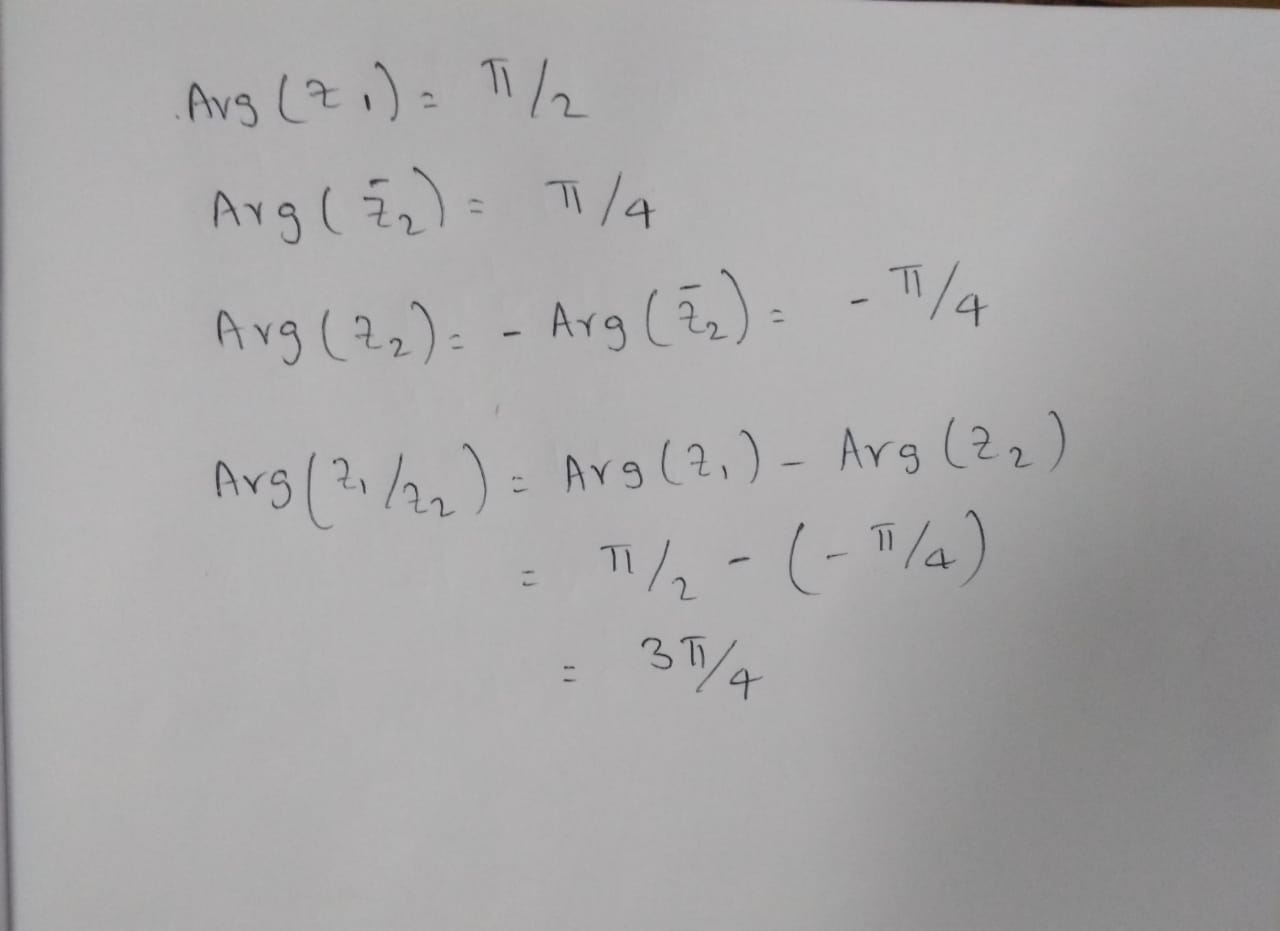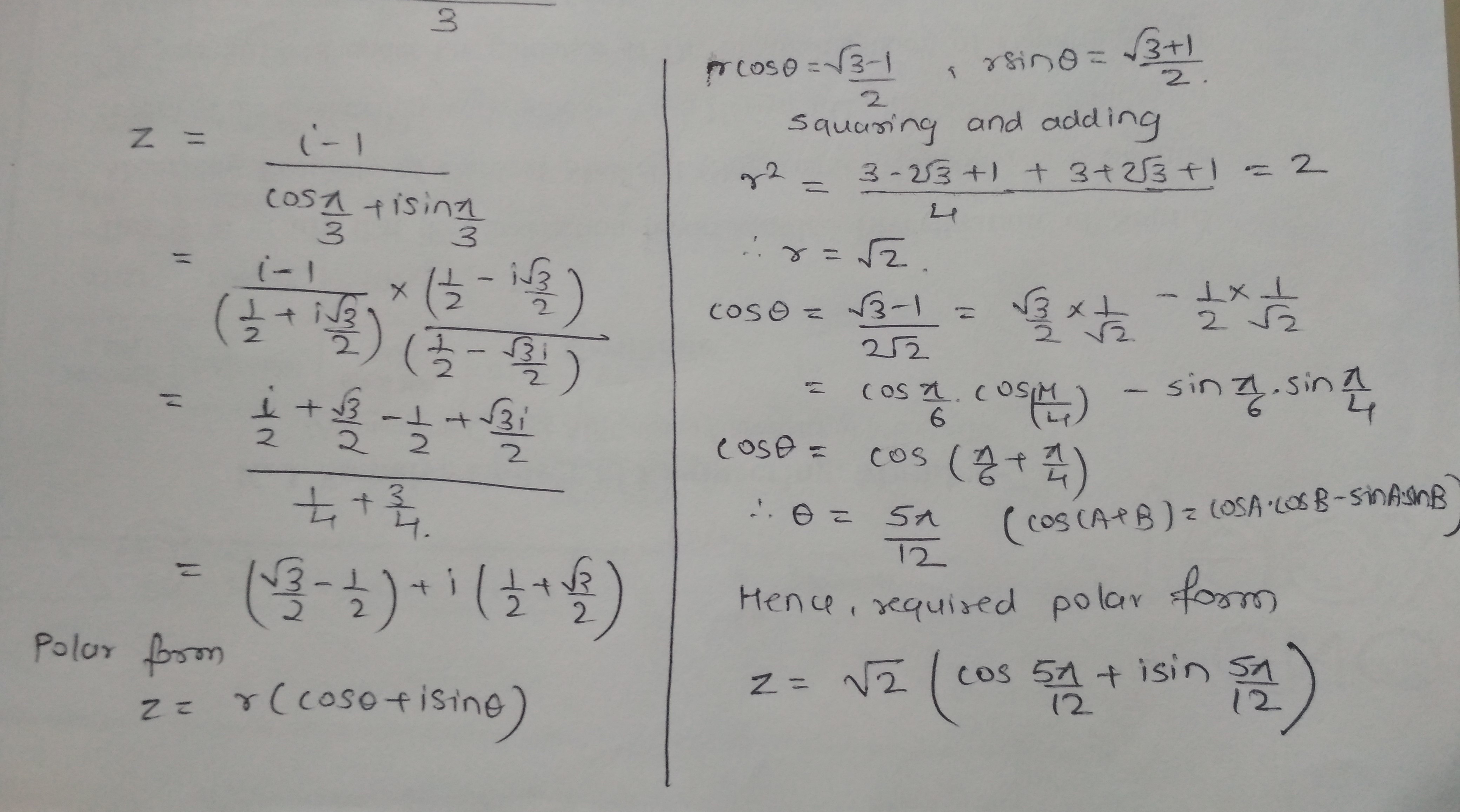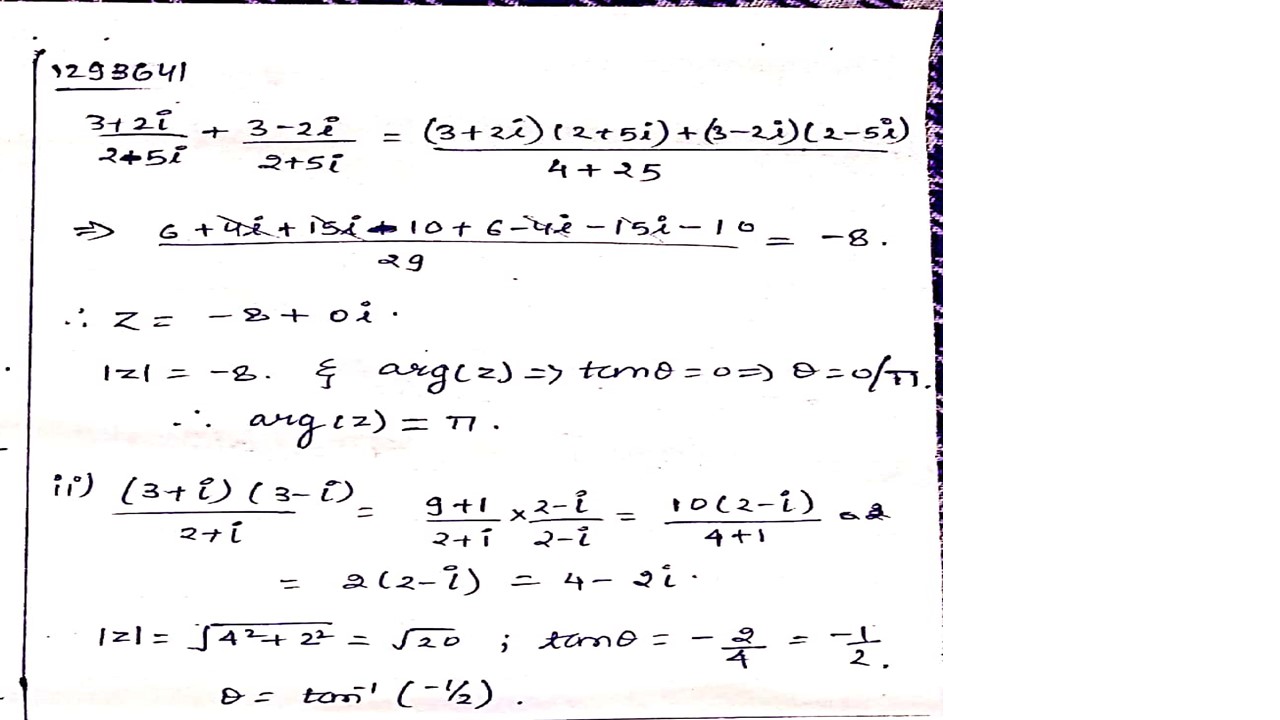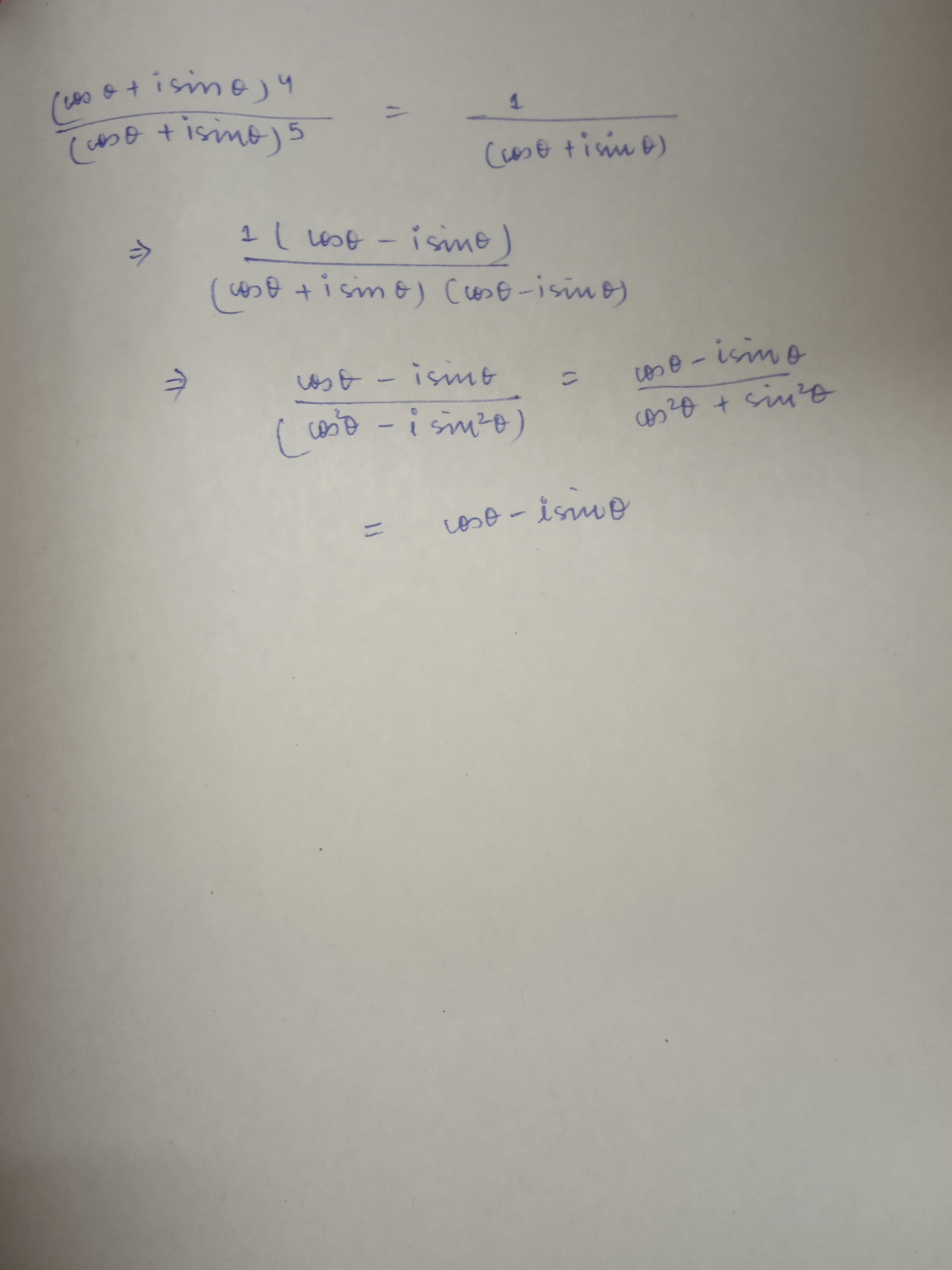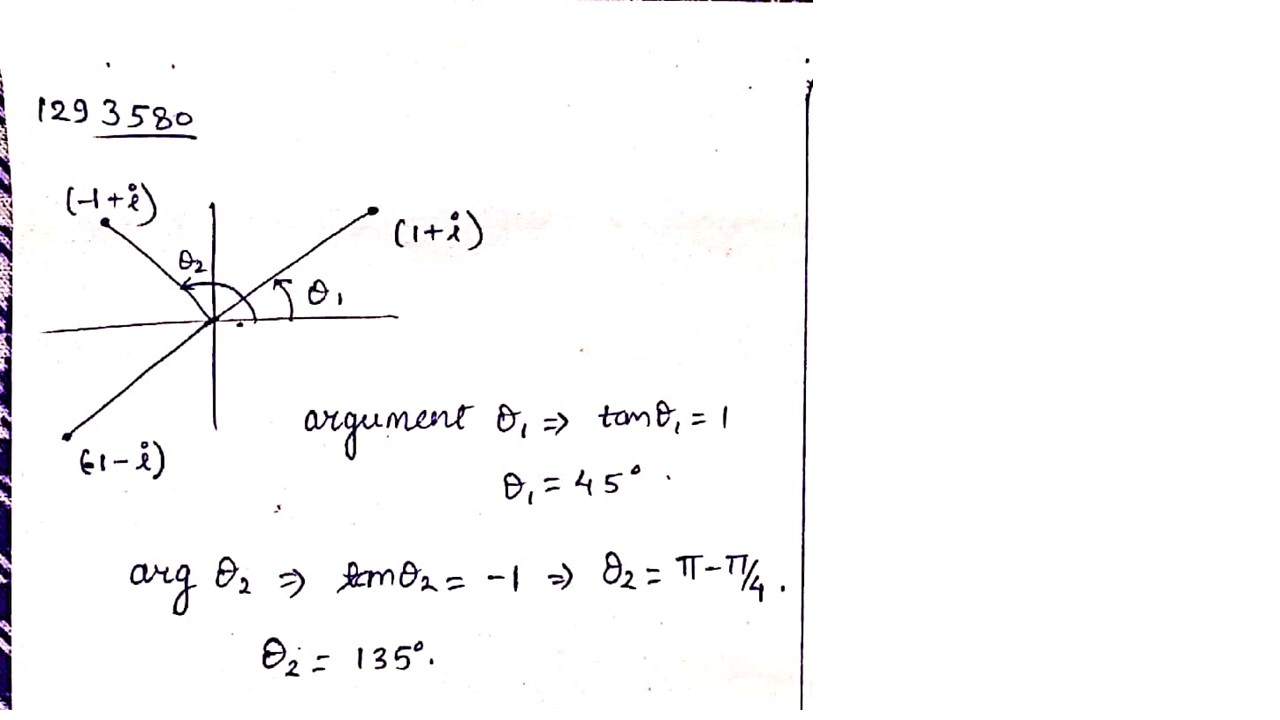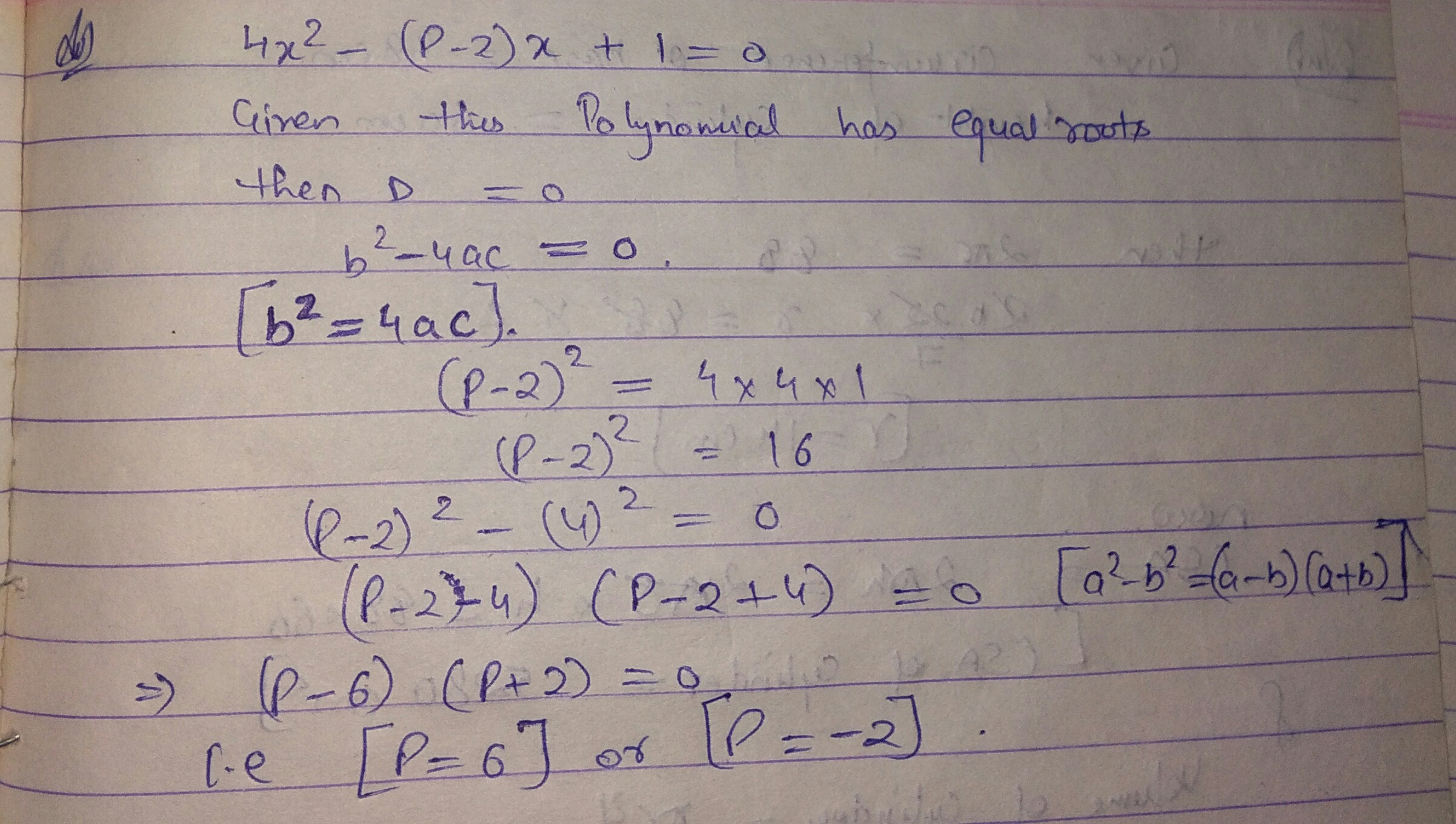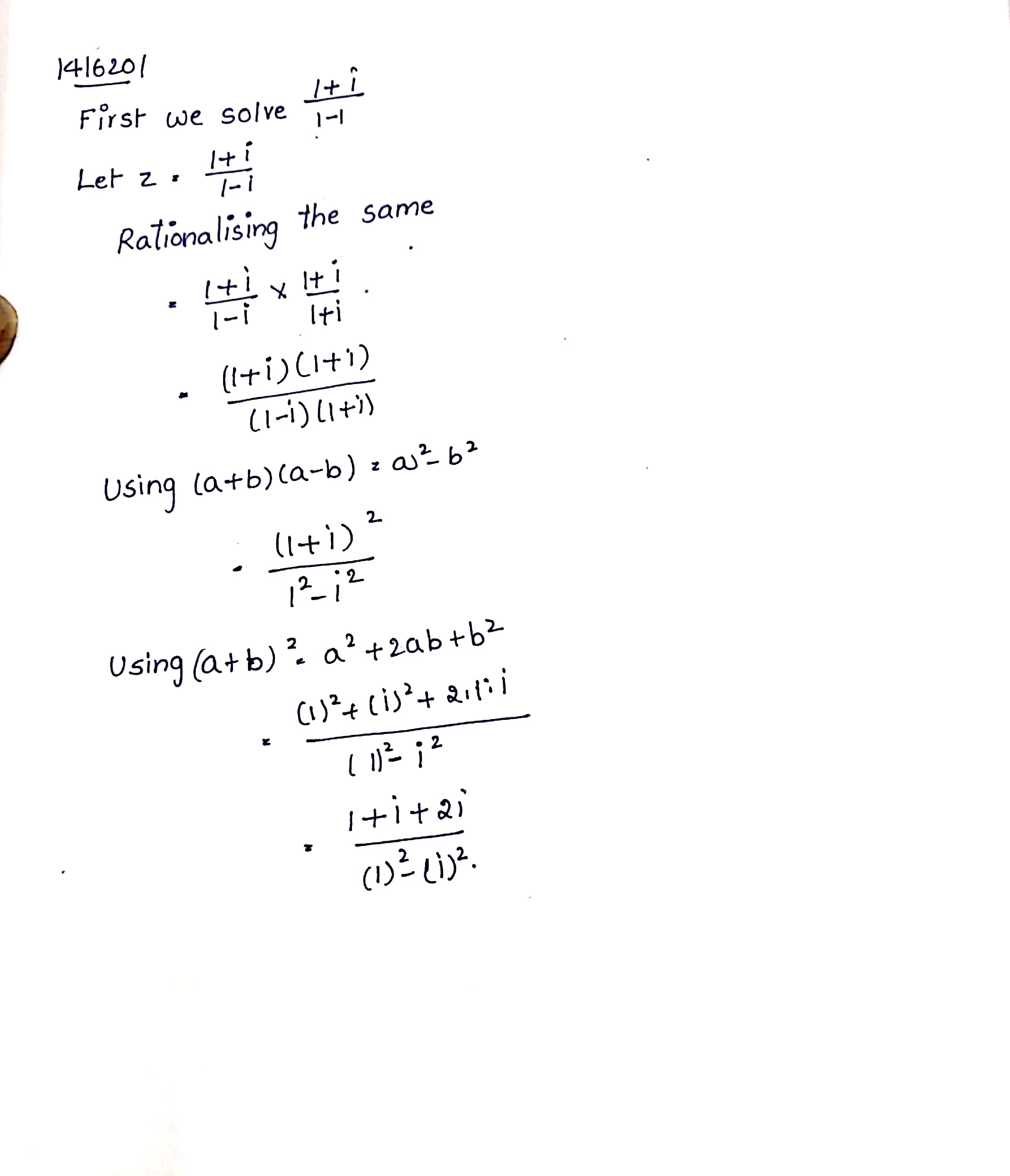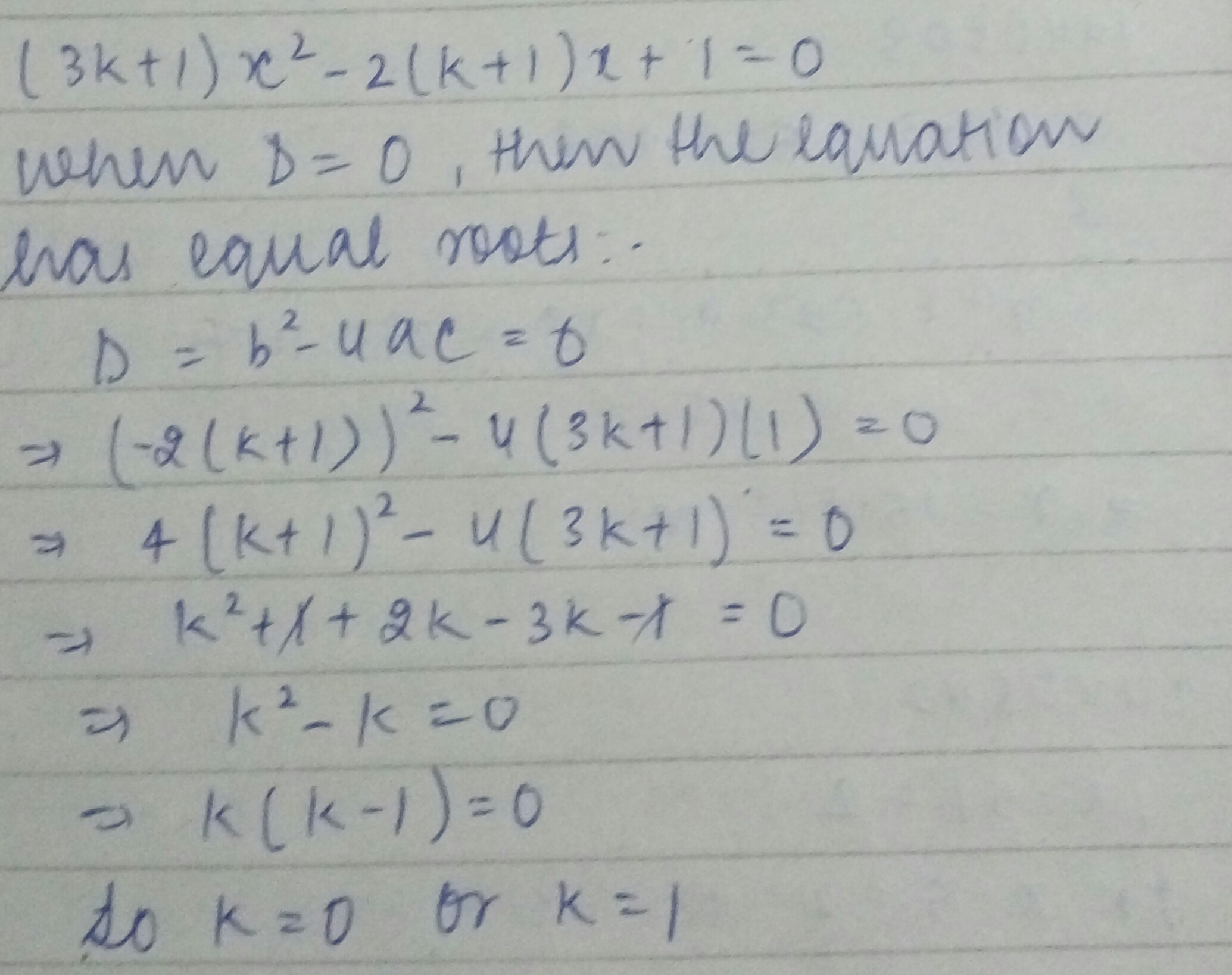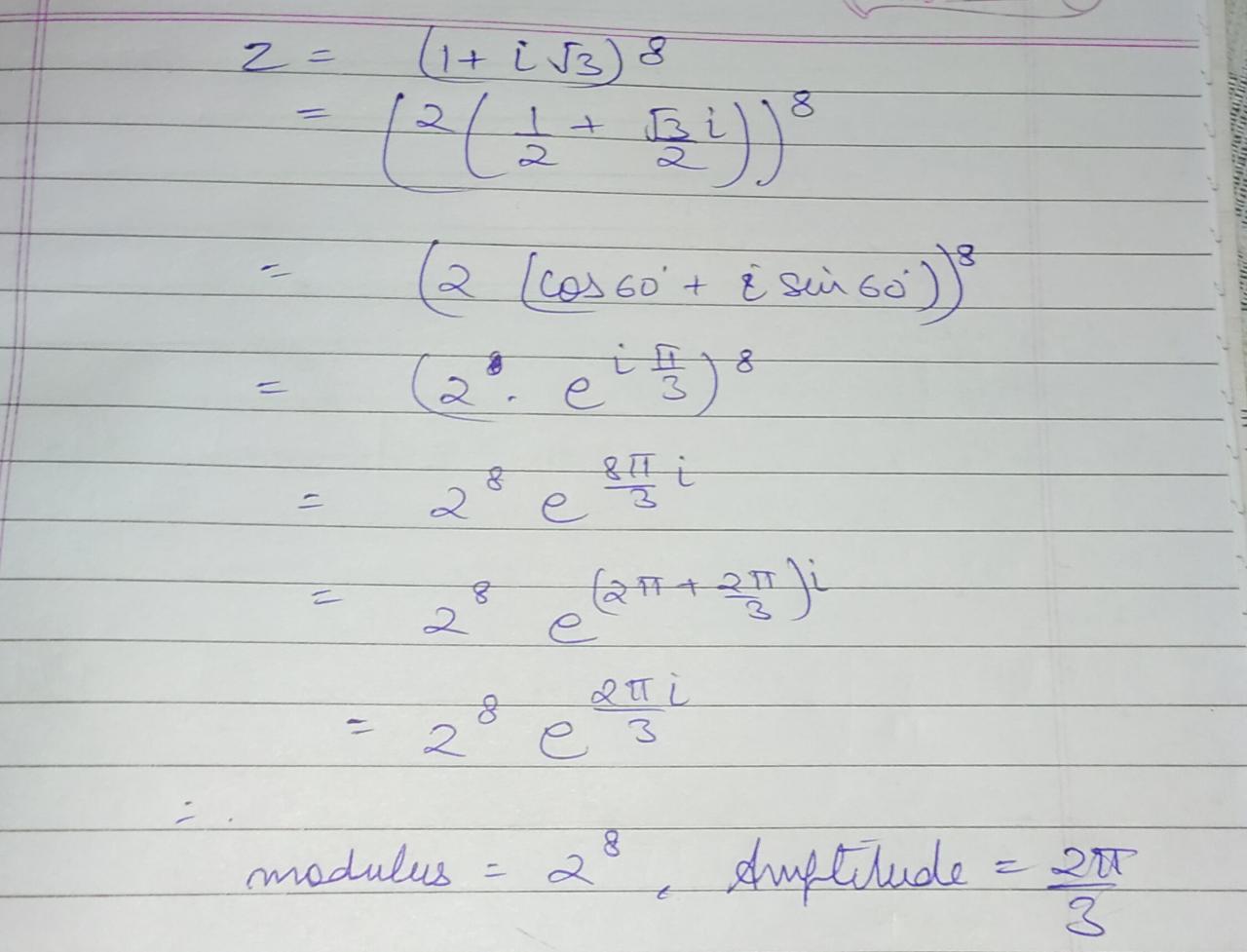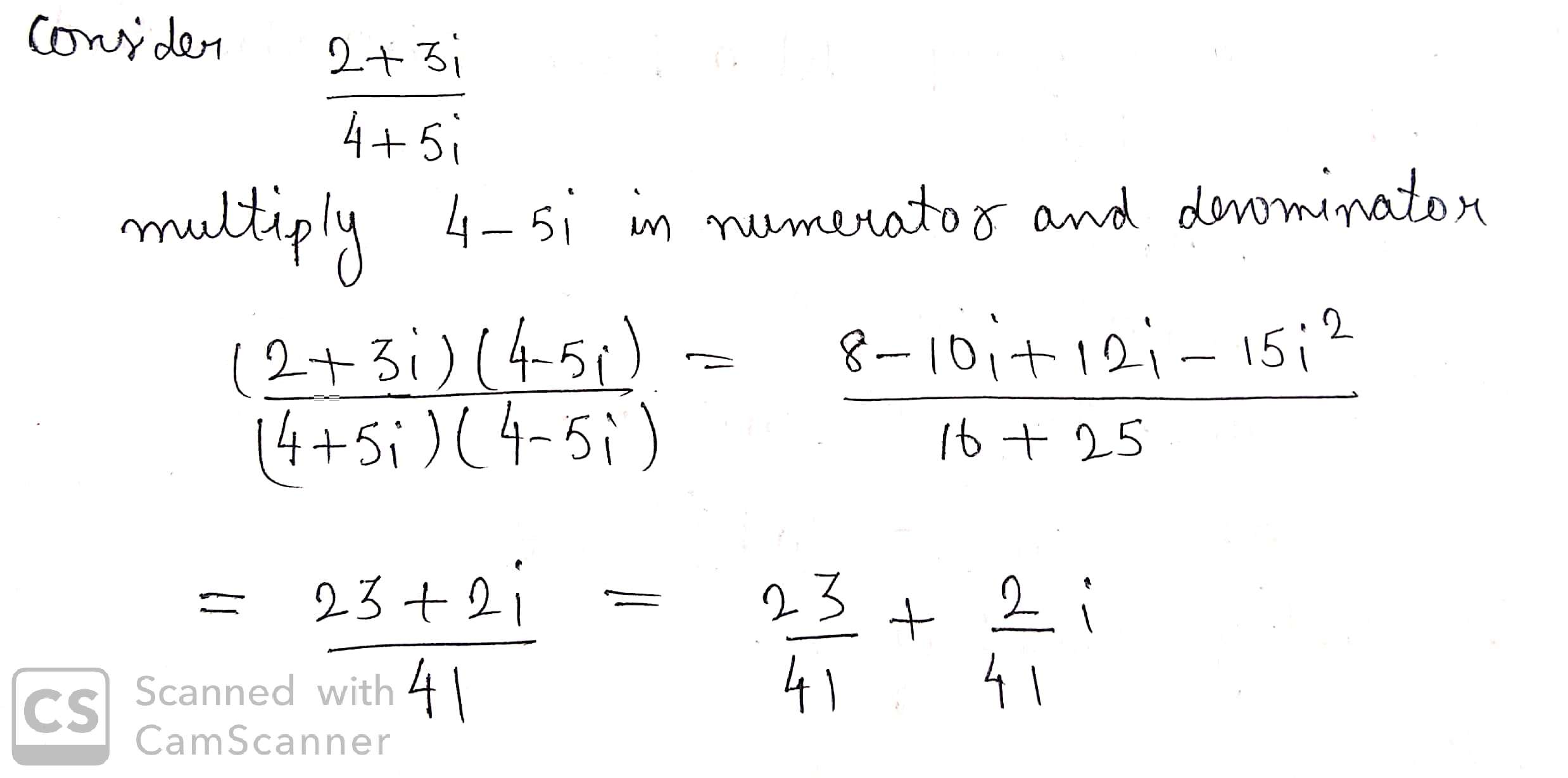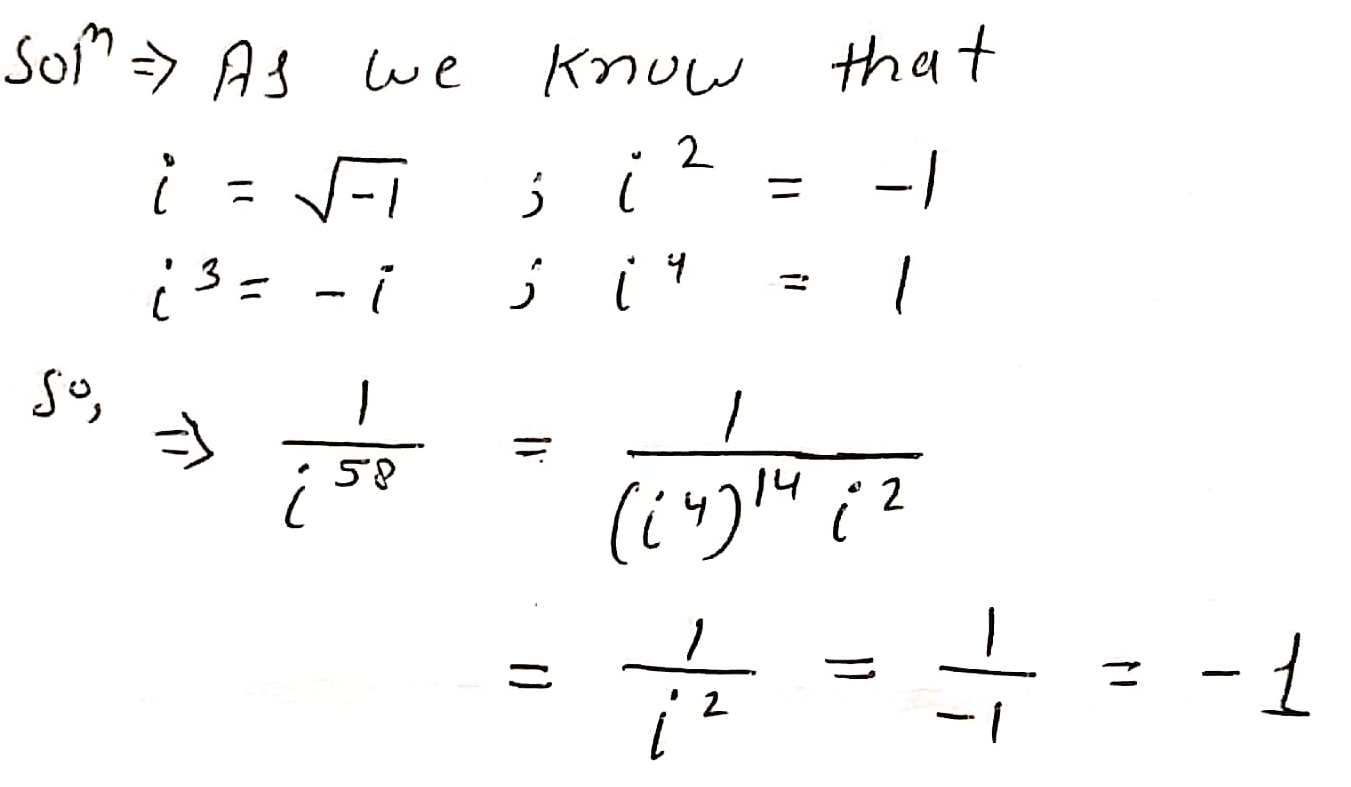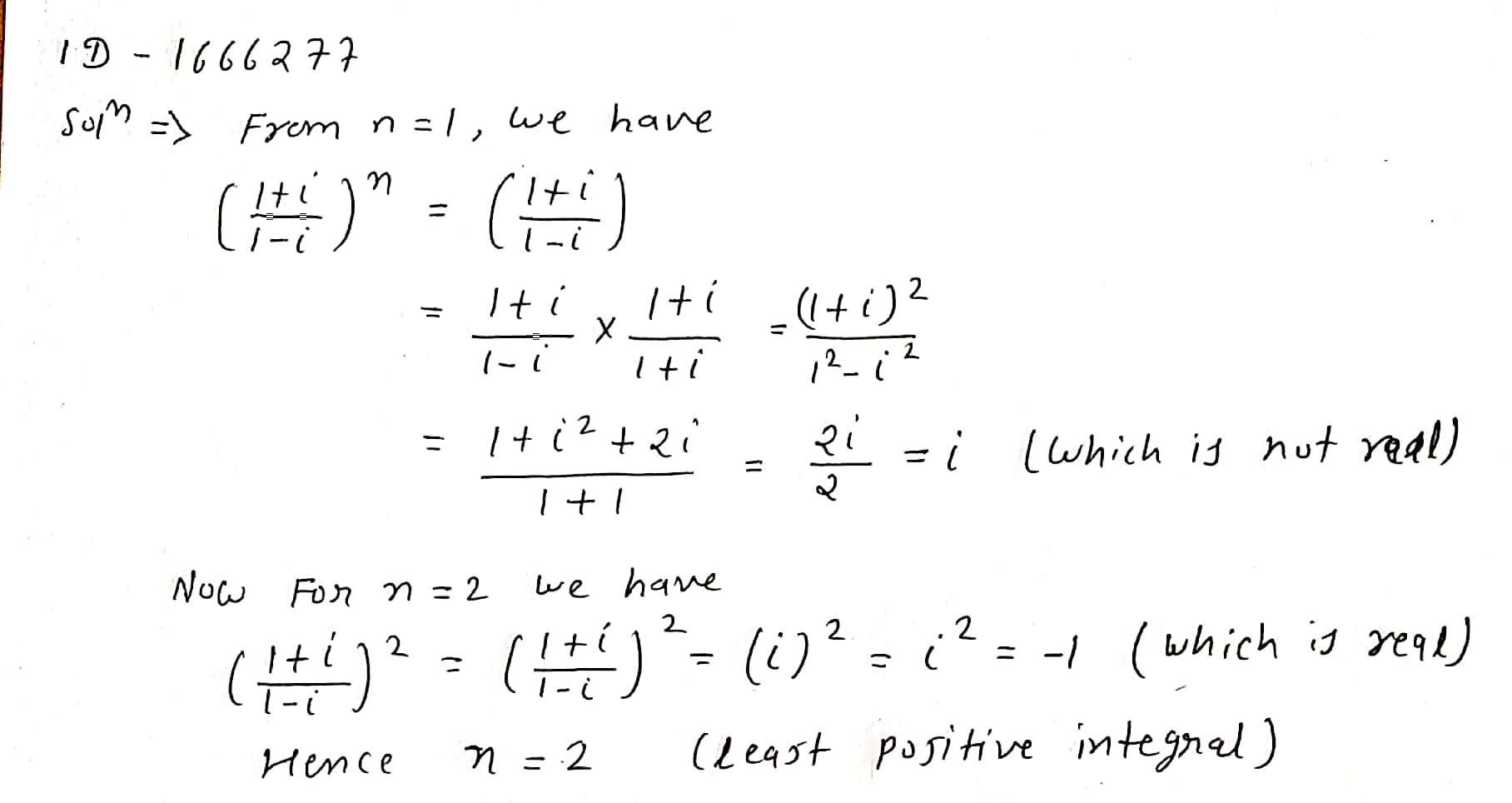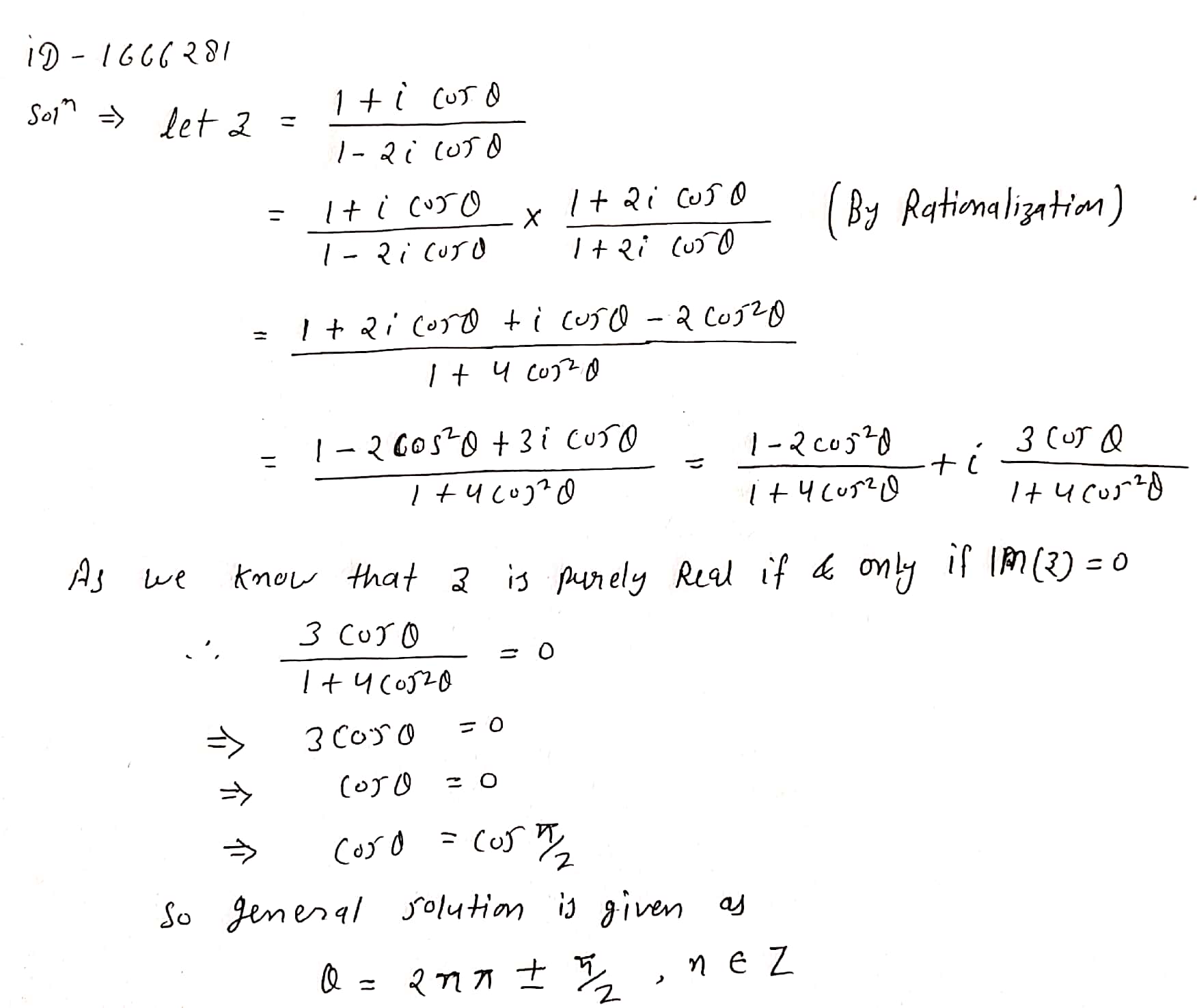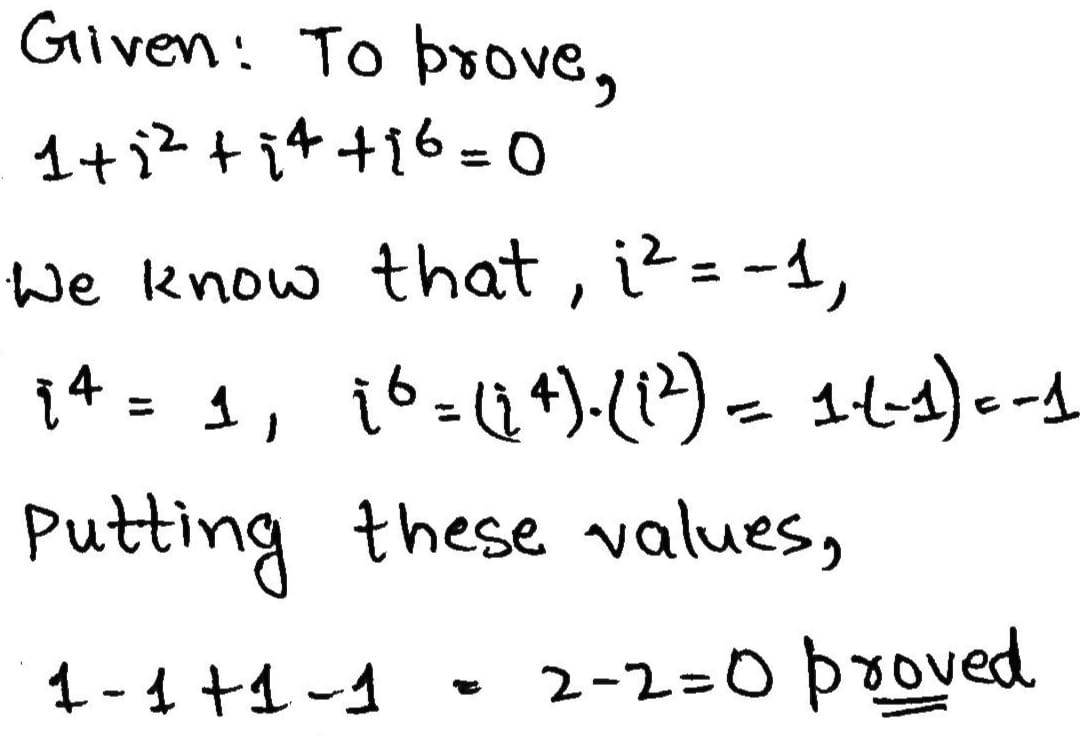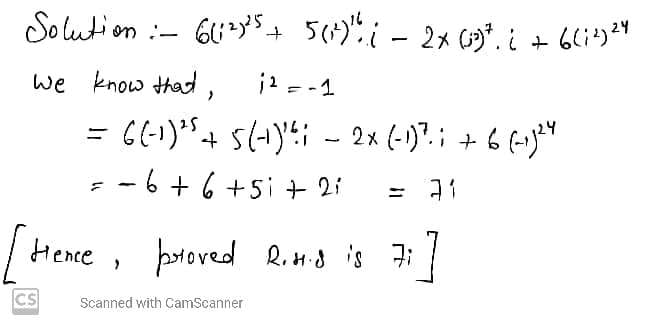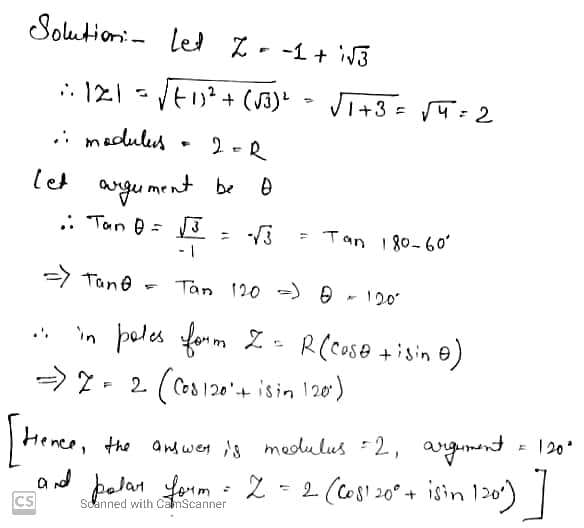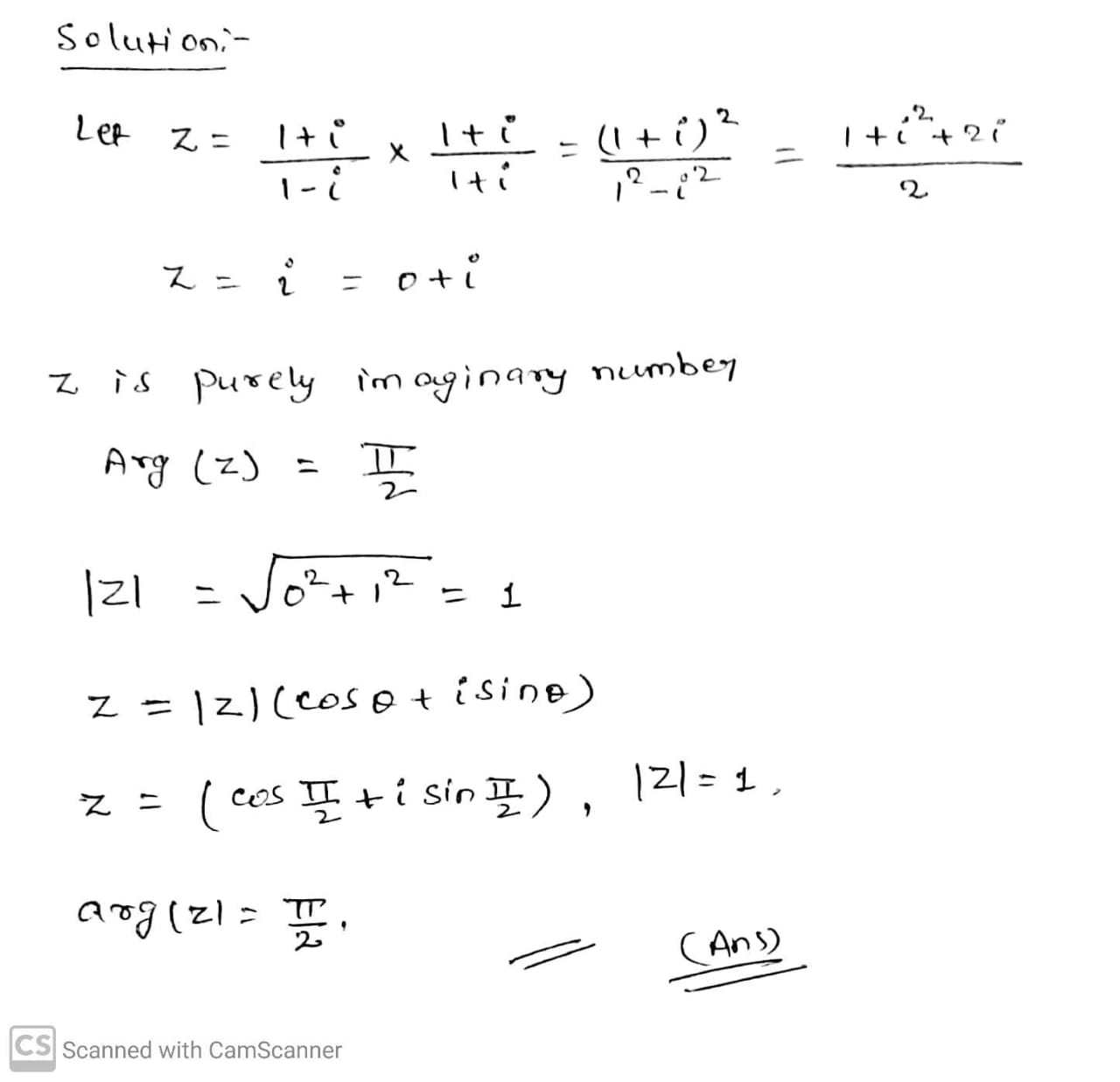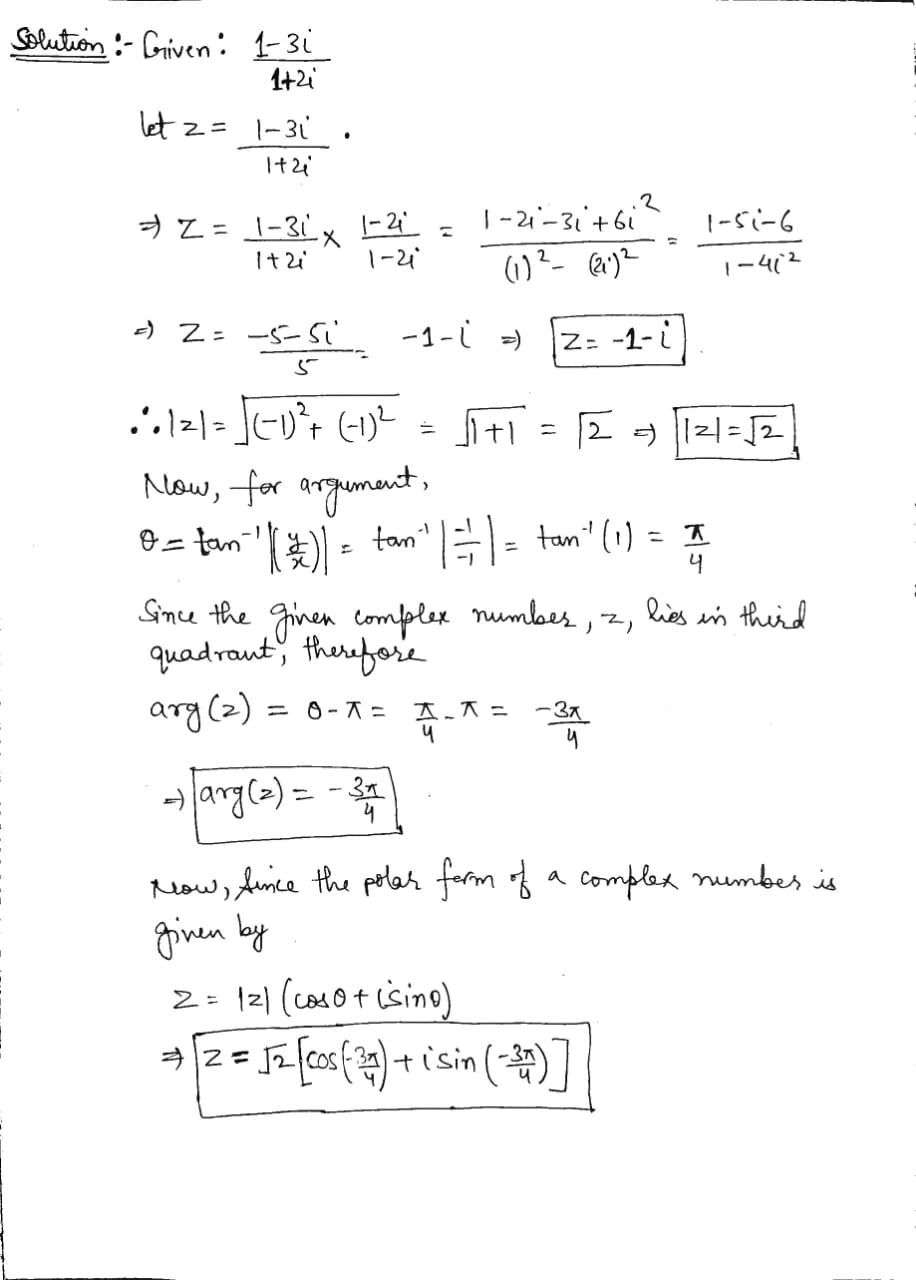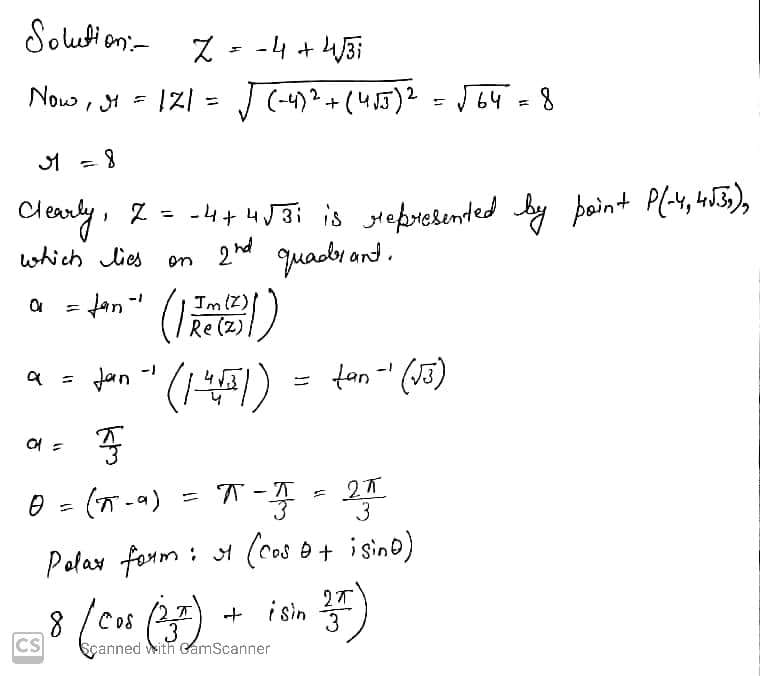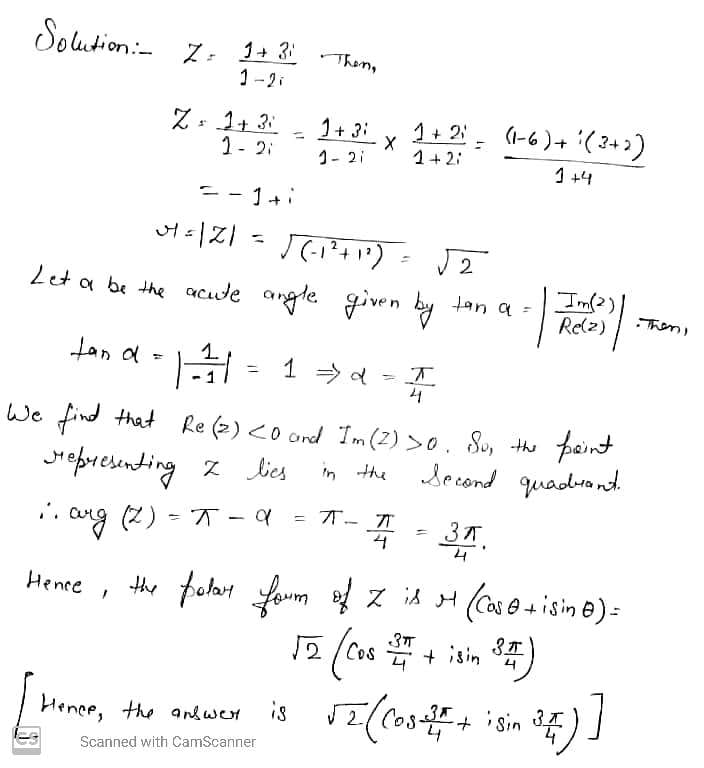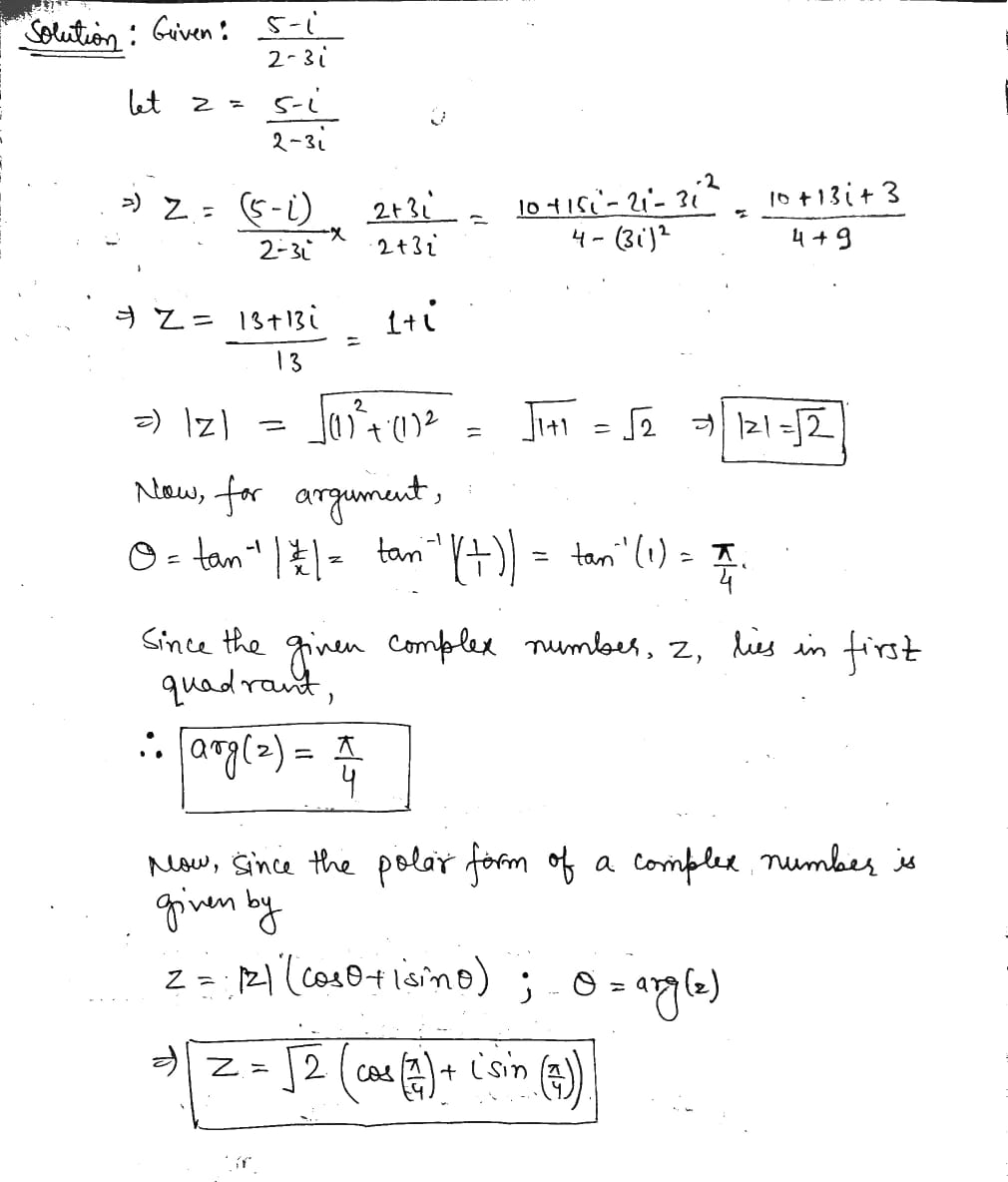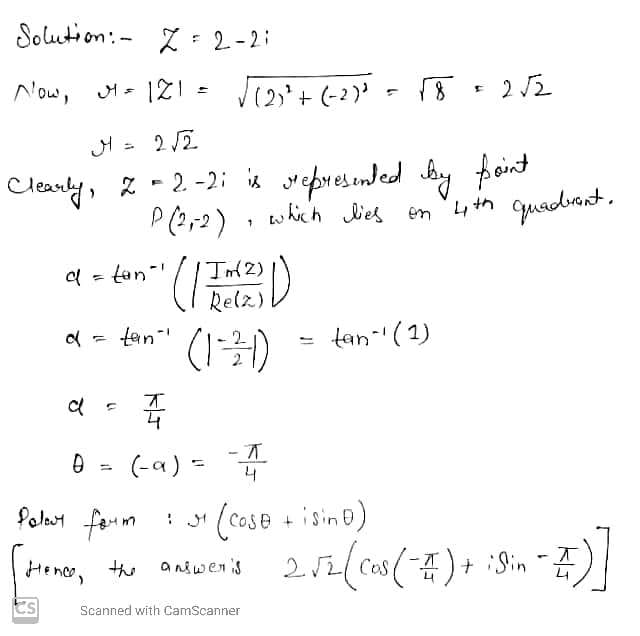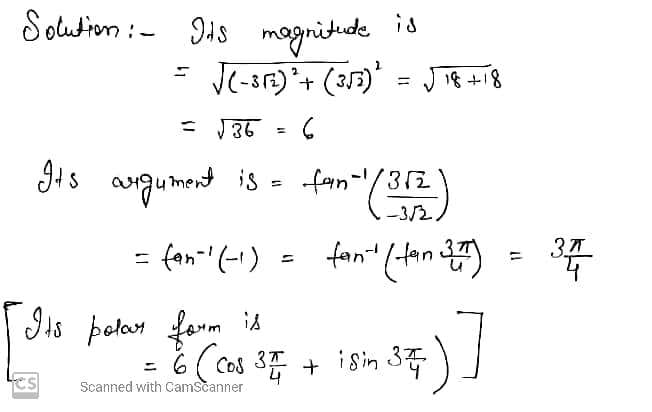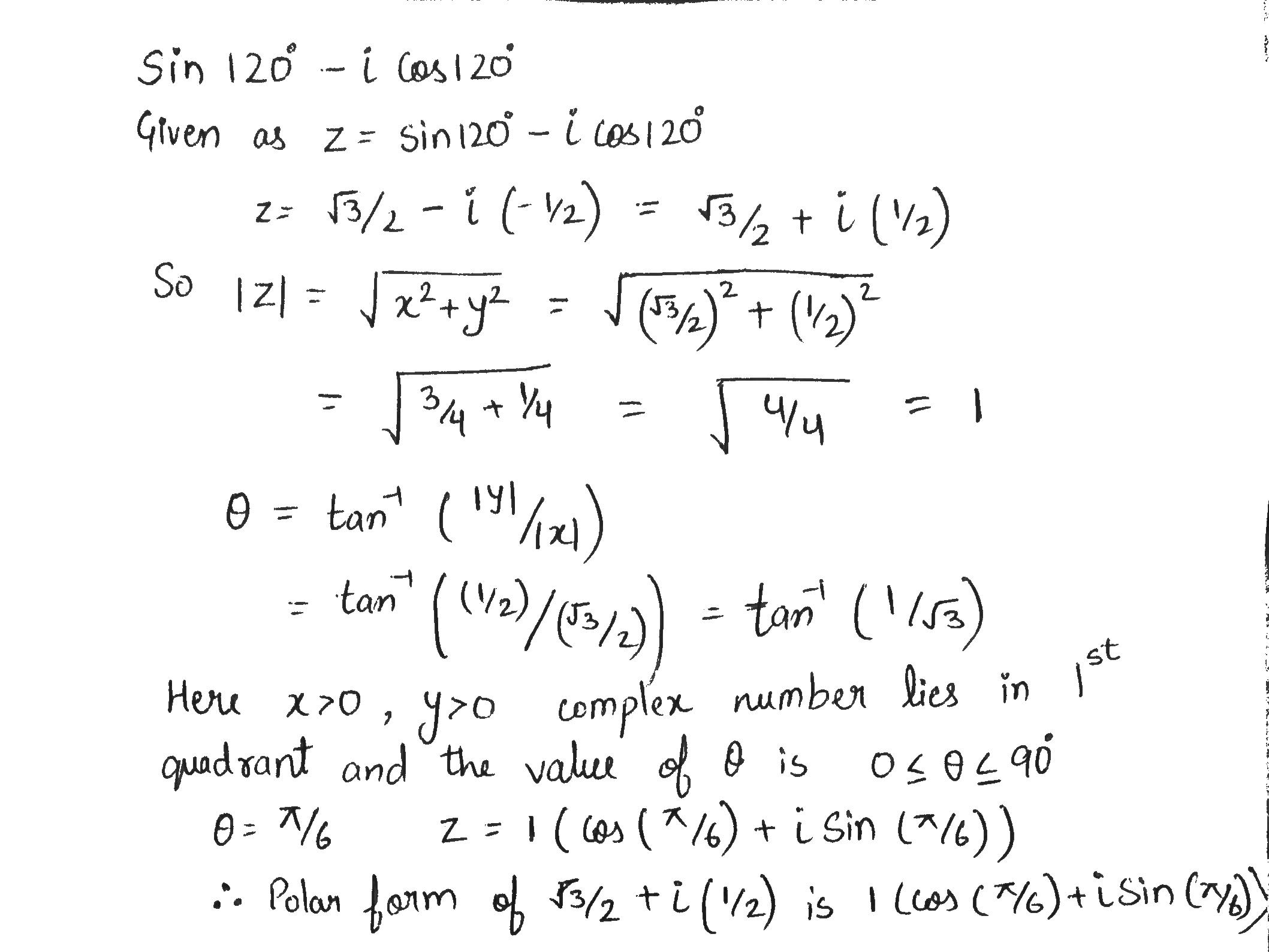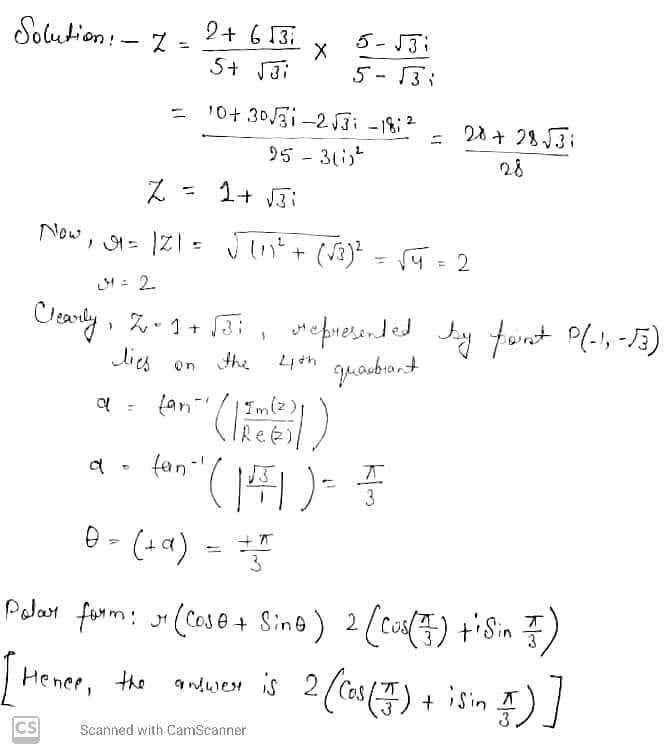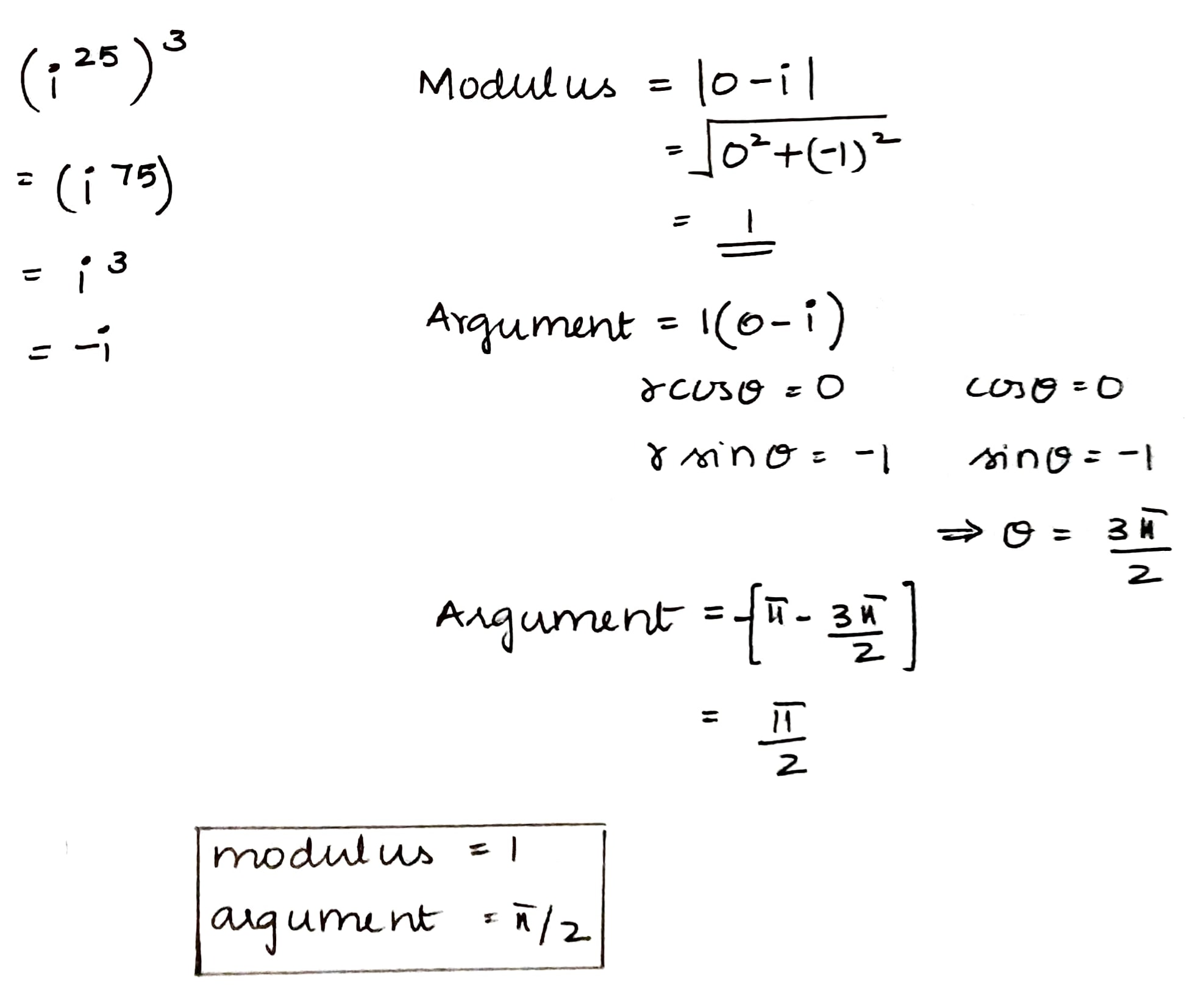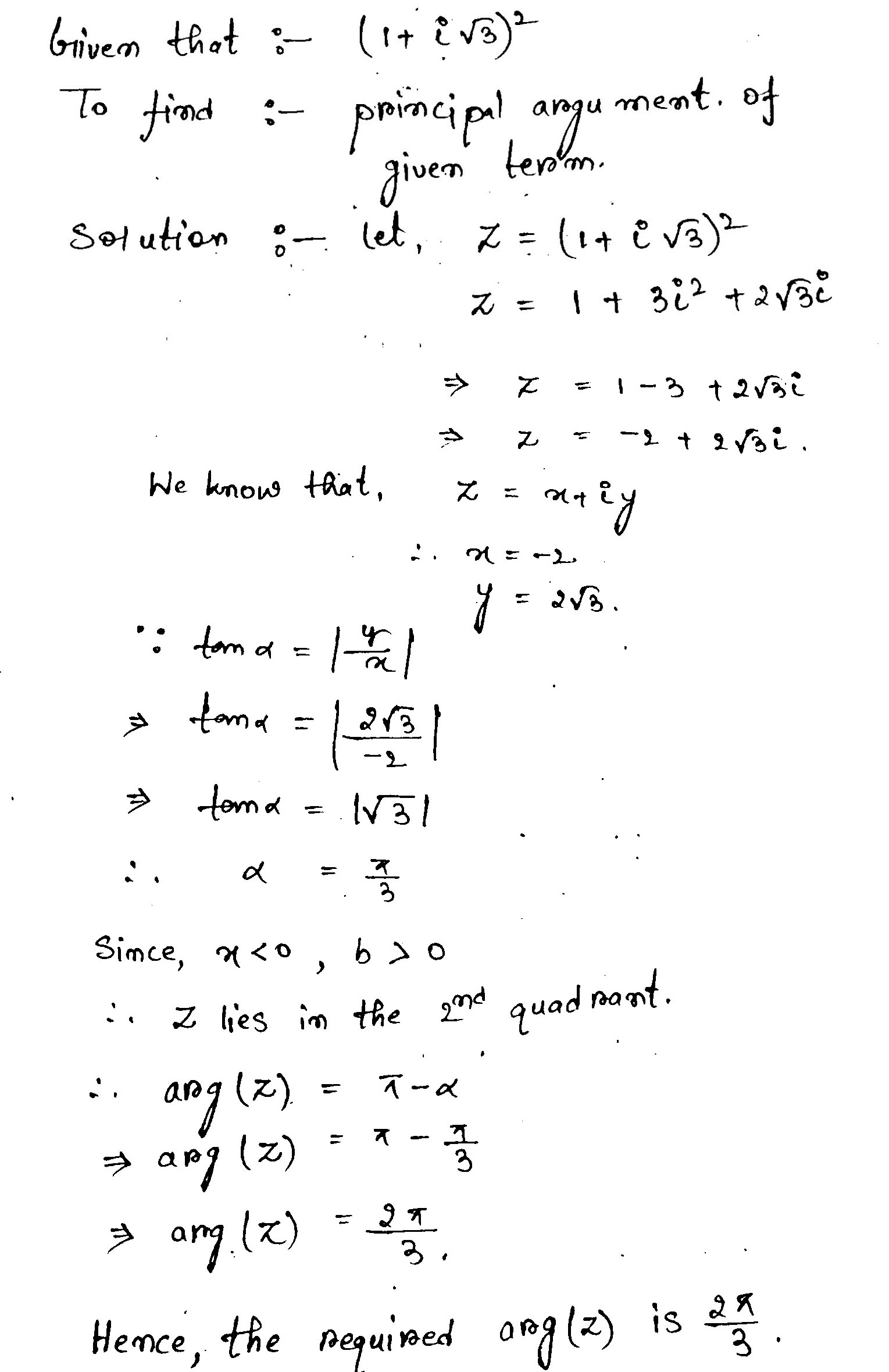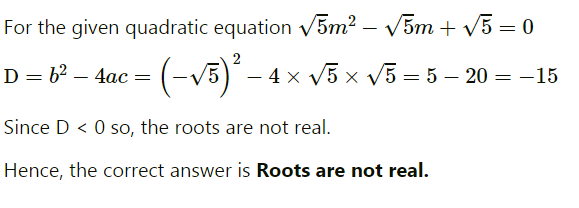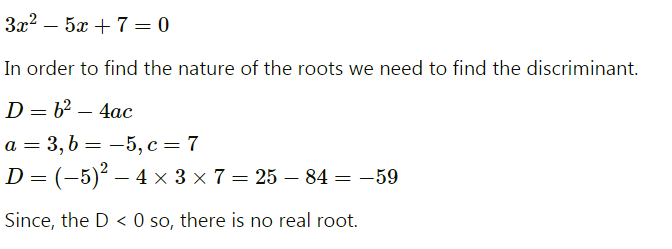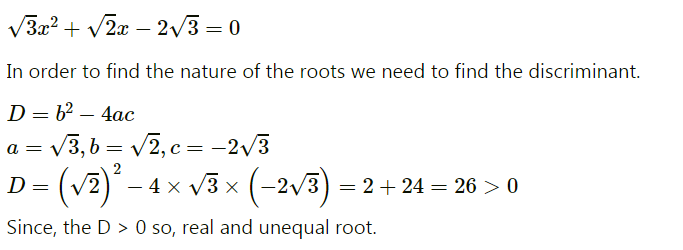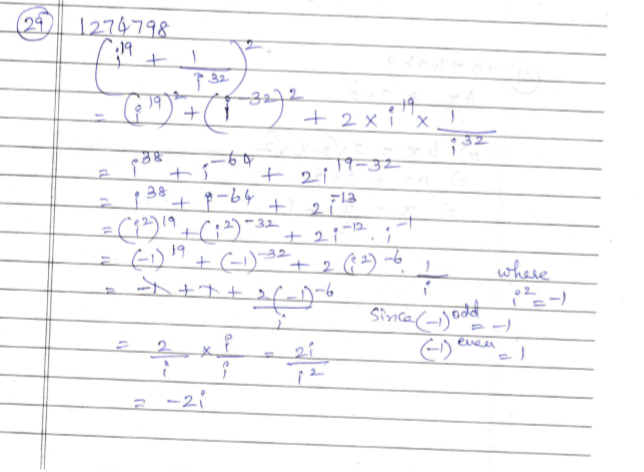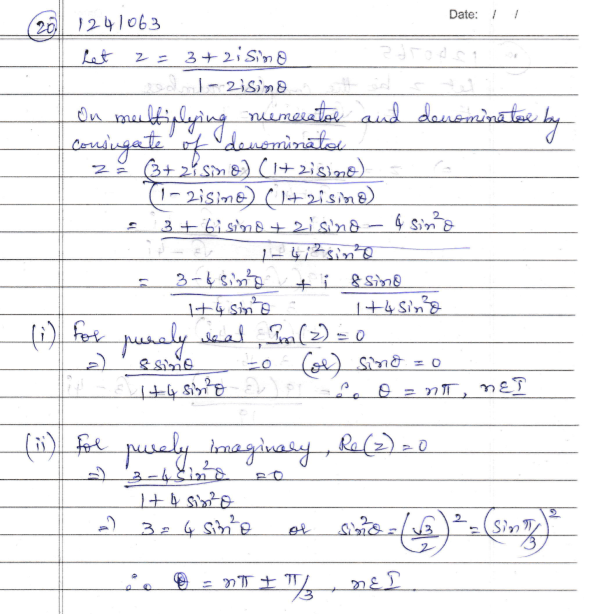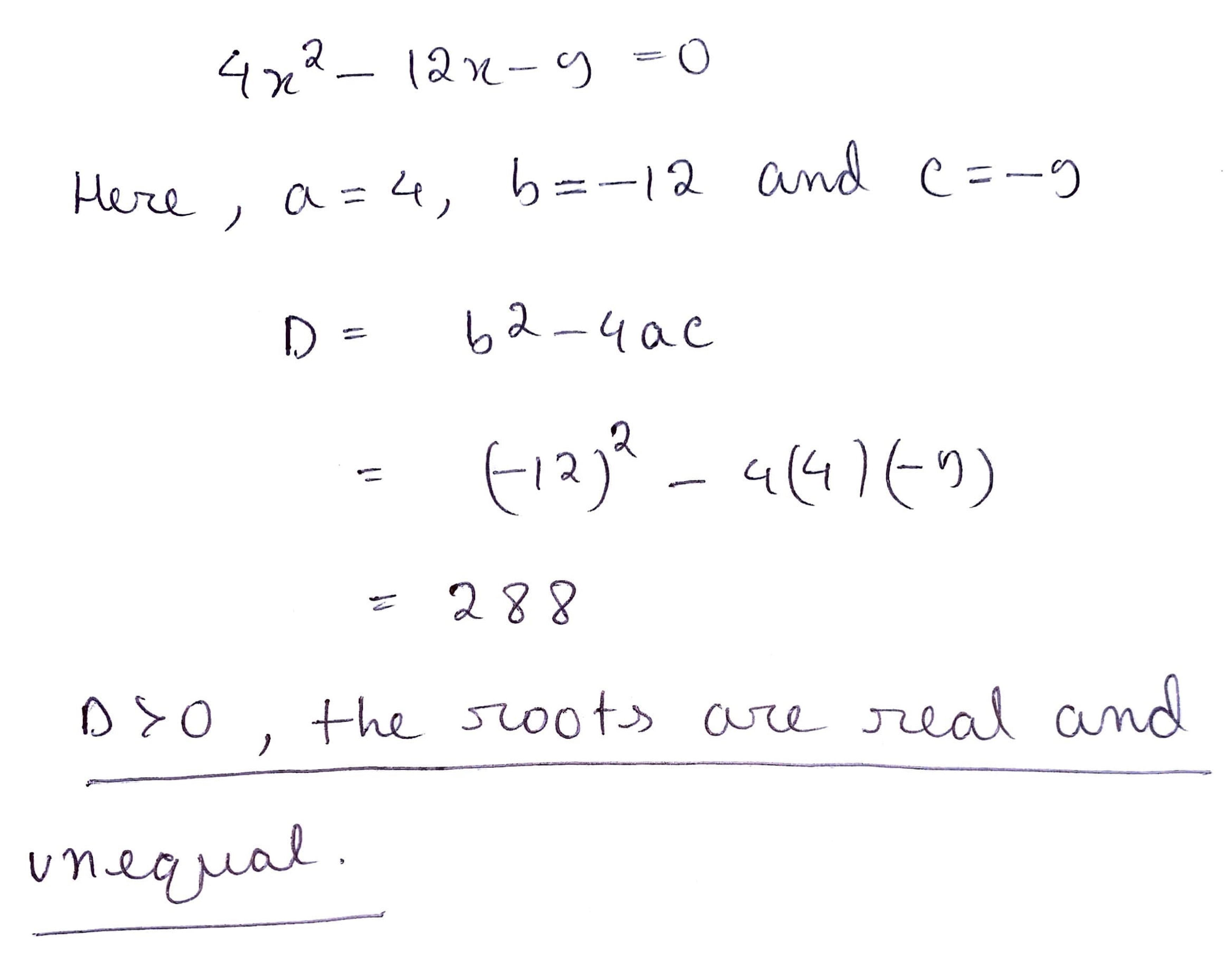Complex Numbers And Quadratic Equations - Class 11 Engineering Maths - Extra Questions
Number of roots of the quadratic equation $$\displaystyle 8\sec ^{2}x-6\sec x+1= 0$$ is/are:
$$\left | z \right |\leq 5$$ & $$Arg\left ( z-1-i \right )> \pi /6$$
$$Arg \left ( z-1-i \right )\geq \pi /3$$
Multiply $$2\sqrt { -3 } +3\sqrt { -2 } $$ by $$4\sqrt { -3 } -5\sqrt { -2 } $$
If the value of the discriminant of the quadratic equation $$a{ x }^{ 2 }+bx+c=0$$ is less than $$0$$, then the nature of the roots is ____
If $${Z}_{1}=-1$$ and $${Z}_{2}=i$$, then find $$Arg\left( \cfrac { { Z }_{ 1 } }{ { Z }_{ 2 } } \right) $$
Write an example for a quadratic polynomial that has no real zeroes.
Without solving the following quadratic equation, find the value of $$m$$ for which the given equation has real and equal roots.
$$x^2+2(m-1)x+(m+5)=0$$
Calculate $$\displaystyle \sqrt{i}$$
What is $$cis\ 0$$?
Find the value of $$k$$ so that the following equation has equal roots.
$$2x^{2} - (k - 2) x+1 = 0$$
Calculate $$\displaystyle \sqrt[3]{- \, i}$$
Represent $$(-1-\sqrt 3i)$$ in the polar form.
For the real numbers x and y, if $$(x-iy)(3+5i)$$ is the conjugate of $$-6-24i$$ then find the value of $$x$$ and $$y$$.
Indicate the point of the complex plane $$z$$ which satisfy the following equation.
$$\displaystyle z^2 \, + \, | \, \overline{z} \, | \, = \, 0$$
Find the values of p for which the quadratic equation $$4x^2+px+3=0$$ has equal roots.
Find the modulus of the complex number $$2-5!$$.
Determine the nature of the roots of the following quadratic equation
$$2x^2+ 6x + 3 = 0$$
Find the length of the segments connecting the points represented by the following pairs of numbers :
3, -4i
locate the point representing the complex numbers $$z$$ on the Argand diagram for which
$$\left| z \right| \ge 3,$$
Simplify the following :
$$\dfrac{3 \, - \, i}{2 \, + \, i} \, + \, \dfrac{3 \, + \, i}{2 \, - \, i}$$
Find the length of the segments connecting the points represented by the following pairs of numbers :
-1 - i, 2 + 3i
$$x \, +\, i \sqrt x^\, 4 \, +, x^2 \, +\, 1$$
Find the discriminant of the following quadratic equations and hence determine the nature of the roots of the equation :
$${x^2} = 9$$
What is value of $$(-i)^{12}$$
In the given, determine whether the given quadratic equation has real roots and if so, find the roots.
$${ x }^{ 2 }+5x+5=0$$
Determine the nature of the roots of the given quadratic equation
$$2{ x }^{ 2 }+x-1=0$$
Determine the nature of the roots of the given quadratic equation
$$4{ x }^{ 2 }-4x+1=0\quad $$
Solve$$z = \left( {2 + i} \right)+\left( {1 - 3i} \right)$$
Find the modulus of: (i) $${{21} \over 5} - {{12} \over 5}i$$ (ii) 3+4i
Find the value of $$(1+i)(1+{i}^{2})(1+{i}^{3})(1+{i}^{4})$$.
Find the amplitude and modulus of following(i) $$\displaystyle {{21} \over 5} - {{12} \over 5}i$$ (ii) $$3 + 4{\rm{ i}}$$
Express the given complex number $$3(7+i7)+i(7+i7)$$ in the form $$a+ib$$,
Find the amplitude of $$-4$$.
Find modulus and argument of $$i$$
Write the nature of roots of the quadratic equation $$5x^2-2x+3=0$$.
Write the argument of $$(1+\sqrt {3})(1+i)(\cos \theta+i\sin \theta)$$.
The values of $$x$$ and $$y$$ satisfying the equation $$\dfrac{(1+i)x - 2i}{3+ i} + \dfrac{(2 -3i)y + i}{3 - i} = i$$, are
Solve for $$x$$ : $$4\sqrt 3 x^{2} + 5x-2\sqrt 3 = 0$$ Write about the nature of roots.
Express $$(1-i)-(1+i6)$$ as $$a+ib$$
If $$\dfrac {a-ib}{a+ib}=\dfrac {1+i}{1-i}$$, then prove that $$a+b=0$$
Solve the equation $$\left| z \right| + z = 2 + i$$
Convert the given complex number into the polar form:$$z = -3$$
If $${z_1} = 1 + i = \sqrt 3 + i$$, then the principle arg $$\left( {\frac{{{z_1}}}{{{z_2}}}} \right)$$
If $$a+ib=\cfrac { { (x+i) }^{ 2 } }{ 2{ x }^{ 2 }+1 } $$, prove that $${ a }^{ 2 }+{ b }^{ 2 }=\cfrac { { (x+i) }^{ 2 } }{ { (2{ x }^{ 2 }+1) }^{ 2 } } $$.
Solve the problem:-
$$\left( {\frac{1}{5} + i\frac{2}{5}} \right) - \left( {4 + i\frac{5}{2}} \right)$$
For what value of $$k$$, the equation $$kx^2 - 6x - 2 = 0$$ has equal roots.
Evaluate: $$\left[i^{18}+\left(\dfrac{1}{i}\right)^{25}\right]^3$$.
If $$z=x+iy$$ and $$z_1=1+2i$$, determine the region in the complex plane represented by $$1 < |z-z_1 |< 3$$. Represent it on the Argand plane.
Determine the nature of roots of the following quadratic equation :$$2x^2+5x+5=0$$
If $$z_1=2-i, z_2=1+i$$, find $$\left|\dfrac{z_1+z_2+1}{z_1-z_2+i}\right|$$.
Find the values of the following:
$${ \left( 1+i\sqrt { 3 } \right) }^{ 3 }$$
Solve $$(3-7i)+(-2+4i)$$.
If $$\alpha$$ and $$\beta$$ are the zeroes of the equation $$6{x^2} + x - 2 = 0$$, find $$\dfrac{\alpha }{\beta } + \dfrac{\beta }{\alpha }$$
$$\dfrac{2+5i}{3-2i}+\dfrac{2-5i}{3+2i}$$.
Write principal argument of $$\dfrac {-\sqrt {11}i}{17}$$.
Find the modulus:
$$-4-4i$$
If $$a=\frac { -1+\sqrt { 3i } }{ 2 } ,b=\frac { -1-\sqrt { 3i } }{ 2 }$$ then show that $${a}^{2}=b$$ and $${b}^{2}=a$$.
Represent following complex numbers $$z_1=1+2i$$ and $$z_2=5-7i$$ by points in Argand's diagram and determine their amplitudes approximately.
If $$g\left( x \right) ={ x }^{ 4 }{ -x }^{ 3 }+{ x }^{ 2 }+3x-5$$, find $$g(2+3i)$$
What will be the nature of roots of the quadratic equation $$2{x^2} + 4x + 7 = 0$$.
Find the modulus of $$\dfrac {3 -4i}{5 + 7i}$$.
Write the nature of roots of quadratic equation $$4{ x }^{ 2 }+6x+3=0$$
Find the amplitude of $$ 1 + i \sqrt{3}$$.
Find the modulus of the complex number $$z=2+3i$$.
Find discriminant of the equation $$5x - 6 = \dfrac{1}{x}$$.
If $$a+ib=\dfrac{c+i}{c-i}$$, where $$c$$ is a real number, then prove that : $$a^{2}+b^{2}=1$$ and $$\dfrac{b}{a}=\dfrac{2c}{c^{2}-1}$$.
Write the nature of roots from the given values of the discriminants and complete the activity.
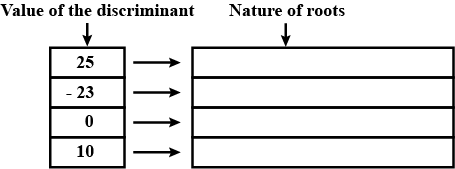
Find the modulus and amplitude of $$4+3i$$.
Write (i) $$-1 -i$$ (ii) $$1 - i$$ in polar form.
Simplify and hence find the modulus and argument $$ \dfrac {(3 + i)(3 - i)}{2 + i} $$.
In $$-3+3i$$, find amplitude and modulus
If the discriminant is 13, how many solutions and of what type?
Express $$\dfrac{-1+i}{\sqrt{2}}$$ in the polar form
If $$z=(\cos \theta, \sin \theta))$$, find $$\left(z-\dfrac{1}{z}\right)$$
Find the nature of roots of the quadratic equation $${ y }^{ 2 }-7y+2=0$$.
Simplify: $$\left(\dfrac{1}{3}+3i\right)^{3}$$
If $$\omega =\frac { Z }{ \bar { Z } } $$, then $$|\omega |=$$
If $$z_1=5+3i\\z_2=2-3i$$ Find $$z_1+z_2$$
$$3 \sqrt { 2 } x ^ { 2 } - 2 \sqrt { 6 } x + 2$$ find the nature of roots.
Check whether the following equation will have two distinct real or imaginary or two real equal roots.$$x^2-3x+5=0$$.
Prove that the roots of the following quadratic equation has two real distinct roots.$$2x^2-6x+3=0$$.
Find the condition for which the roots of the equation $$ax^{2}+bx+c=0$$ be real and distinct.
Find the value of $$\displaystyle \sum^{100}_{n=0}i^{n!}$$ $$(where, i=\sqrt {-1})$$
Check whether the roots of the following quadratic equations are real or not?$$3x^2-4\sqrt{3}x+4=0$$.
Evaluate : $$i^{373}$$
Simplify:$$\left(14+ 2i\right)\left(7 + 12i\right)$$ where $$i=\sqrt{-1}$$
Find the modulus of $$ \dfrac{1+i}{1-i}-\dfrac{1-i}{1+i}$$
Express the complex number $$1 + i \sqrt{3}$$ in modulus amplitude form.
Simplify the following
$$(2-5i)+(-3+4i)+(8-3i)$$
Find z if , $$\left| z \right| = 4$$ and arg (z ) = $${{5\pi } \over 6}$$
$$ x^{2}-2x-1=0$$Find the nature of roots
Evaluate $$\dfrac{1}{i^{78}}$$
Determine the nature of root of the quadratic equation.
$$m^{2} + 2m + 1 = 0$$
Find the modulus of the following ;
$$ -2-3i $$
If $$-5$$ is a root of the quadratic equation $$2{x}^{2}+px-15=0$$ and the quadratic equation $$p({x}^{2}+x)+k=0$$ has equal roots, then find the value of $$k$$.
For what value of $$k$$, is $$3$$ a root of the equation $$2{x}^{2}+x+k=0$$?
Evaluate : $$i^{-50}$$
Find the nature of the roots of the following quadratic equation. If the real roots exist, find them:
$$3{x}^{2}-4\sqrt { 3x } +4=0$$
Find the values of $$k$$ for which the quadratic equation $$9{x}^{2}-3kx+k=0$$ has equal roots.
Find the nature of the roots of the following quadratic equation. If the real roots exist, find them:
$$2{x}^{2}-6x+3=0$$
Find the modulus of the following ;
$$ (4+i) $$
If $$a$$ and $$b$$ are real, then show that the principal value of arg $$a$$ is $$0$$ or $$\pi$$ according to $$a$$ is positive or negative and that of arg $$b$$ is $$\pi$$/2 or $$-\pi$$/2 according to $$b$$ is positive or negative.
If $$ z = 4 + i\sqrt{7}$$, then find the value of $$|z^3 - 4z^2 - 9z + 91|$$.
The number of complex numbers $$z$$ satisfies $$Re(z^2) = 0, \left|z\right| = \sqrt{3}.$$
If Arg $$(z + i)\, -$$ Arg $$(z - i)$$ $$= \dfrac{\pi}{2}$$, then $$z$$ lies on a circle.
If statement is True, enter $$1$$, else enter $$0$$
Prove that he expression $$\displaystyle \frac{\sqrt{(1 + m)} +i \sqrt{(1 - m)}}{\sqrt{(1 + m)} - i\sqrt{(1 - m)}} - \frac{\sqrt{(1 - m)} + i \sqrt{(1 + m)}}{\sqrt{(1 - m)} -i \sqrt{(1 + m)}} (m \in R)$$ simplifies to 2m.
Write the correct letter from column II against the entry number in column I in your answer book, z $$\neq$$ 0 is a complex number
If $$x = a + bi$$ is a complex number such that $$x^2 = 3 + 4i$$ and $$x^3 = 2 + 11i$$, where $$i = \sqrt{-1}$$, then $$(a+ b)$$ equal to
Let z and w be two nonzero complex numbers such that $$\left|z\right| = \left|w\right|$$ and $$arg(z) + arg(w) = \pi$$. Then prove that $$z = -\overline{w}$$.
Solve $$\displaystyle \sin 2x+ \cos 4x=2$$
Solve the equation $$ { 5 }^{ 2x }-24.{ 5 }^{ x }-25=0$$
find the number of roots .
State true or false:$$\displaystyle \sqrt{-2}.\sqrt{-3}= \sqrt{\left ( -2 \right )\left ( -3 \right )}= \sqrt{6}$$.
For false type 0 and for true type 1
Let $$k$$ be the value of $$\lambda $$ for which the given equation will have equal roots : $$\displaystyle x^{2}+2\left ( 3\lambda +5 \right )x+2\left ( 9\lambda ^{2}+25 \right )=0$$.Find $$6k$$ ?
What is the square of the modulus of the complex number 2+3$$i$$
The equation $$\displaystyle ax^{2}+bx+c=0$$ where a, b, c are real numbers connected by the relation 4a+2b+c= 0 and ab > 0 has real roots.If you think this is true write 1 otherwise write 0 ?
Find the value of the sum $$\displaystyle \sum_{n=1}^5(i^n+i^{n+2})$$, where $$i=\sqrt {-1}$$
Find the modulus and the argument of the complex number $$\displaystyle z=-1-i\sqrt { 3 } $$
Convert the given complex number in polar form : $$\displaystyle -1+i$$
Convert the given complex number in polar form: $$i$$
Convert the given complex number in polar form : $$\displaystyle 1-i$$
If $$\displaystyle \alpha $$ and $$\displaystyle \beta $$ are different complex numbers with $$\displaystyle \left| \beta \right| = 1$$, then find $$\displaystyle \left| \frac { \beta -\alpha }{ 1-\bar { \alpha } \beta } \right| $$.
Find the modulus and argument of the complex number $$\displaystyle \frac { 1+2i }{ 1-3i } $$
Find the modulus and the argument of the complex number $$\displaystyle z=-\sqrt { 3 } +i$$
Find the modulus of : $$\displaystyle \frac { 1+i }{ 1-i } -\frac { 1-i }{ 1+i } $$
Find the nature of the roots of the following quadratic equations. If the real roots exist, find them:
(i) $$\displaystyle 2{ x }^{ 2 }-3x+5=0$$
(ii) $$\displaystyle 3{ x }^{ 2 }-4\sqrt { 3 } x+4=0$$
(iii) $$\displaystyle 2{ x }^{ 2 }-6x+3=0$$
Find the values of k for each of the following quadratic equations, so that they have two equal roots.
(i) $$\displaystyle 2{ x }^{ 2 }+kx+3=0$$
(ii) $$\displaystyle kx\left( x-2 \right) +6=0$$
Represent the complex number $$2 + 3i$$ in argand plane
If $${ b }^{ 2 }-4ac> 0$$ in $$a{ x }^{ 2 }+bx+c=0$$, then what can you say about roots of the equation? ($$a\ne 0$$)
Show that the roots of the equation $${x}^{2}-2px+{p}^{2}-{q}^{2}+2qr-{r}^{2}=0$$ are rational.
Show that the equation $$2{x}^{2}-6x+7=0$$ cannot be satisfied by any real values of $$x$$.
Simplify equation: $$\quad \cfrac { 1 }{ x } -\cfrac { 1 }{ (x+1) } =\cfrac { 1 }{ (x+2) } -\cfrac { 1 }{ (x+4) } $$ to get a quadratic equation. Find the nature of roots. Solve the equation using the formula.
Simplify $$\dfrac { 2 }{ i } +\dfrac { 3 }{ { i }^{ 3 } } +\dfrac { 4 }{ { i }^{ 4 } } +\dfrac { 5 }{ { i }^{ 5 } }$$ in the form of $$a+ib$$ & represent graphically & find modulus & amplitude.
Find the value of the principal argument of the complex number $$z = \dfrac {(1 + i\sqrt {3})^{2}}{(1 - i)^{3}}$$.
Indicate the point of the complex plane $$z$$ which satisfy the following equation.
$$\displaystyle z^2 \, + \, | \, z \, | \, = \, 0$$
Indicate the point of the complex plane $$z$$ which satisfy the following equation.
Im $$z^2 = 0$$
Indicate the point of the complex plane $$z$$ which satisfy the following equation.
$$\displaystyle | \, z \, |^3 \, + \, z \, = \, 0$$
Indicate the point of the complex plane $$z$$ which satisfy the following equation.
$$\displaystyle Re \, z^2 \, = \, 0$$
Indicate the point of the complex planea) $$1+2i$$b)$$2-3i$$c)$$-2-4i$$
Calculate $$\displaystyle \sqrt[3]{- \, 1}$$
Calculate, $$\displaystyle \sqrt[4]{- \, 1 \, \frac{1}{2} \, - \, i \, \frac{\sqrt{3}}{2}}.$$
Indicate the point of the complex plane $$z$$ which satisfy the following equation.
$$\displaystyle | \, z \, | \, + \, z \, = \, 0$$
Find the values of $$k$$ for which the given quadratic equation has real and distinct roots
$$kx^2 + 2x + 1 = 0$$
Prove the following inequalities:
$$ \left| z-1 \right| \le \left| \left| z \right| -1 \right| +\left| z \right| \left| \arg\ z \right|$$
(a) For any two non-zero complex numbers $${z}_{1}$$ and $${z}_{2}$$ if $$\left| { z }_{ 1 }+{ z }_{ 2 } \right| =\left| { z }_{ 1 } \right| +\left| { z }_{ 2 } \right|$$, then prove that $$arg\ {z}_{1}-arg\ {z}_{2}$$ is zero.
(b) Prove the above result if we have$$\left| { z }_{ 1 }-{ z }_{ 2 } \right| =\left| { z }_{ 1 } \right| -\left| { z }_{ 2 } \right|$$
Put the following in the form A + iB :
$$\dfrac{(1 \, + \, i)^2}{3 \, - \, i}$$
Simplify the following :
$$\dfrac{3}{1 \, + \, i} \, - \, \dfrac{2}{2 \, - \, i} \, + \, \dfrac{2}{1 \, - \, i}$$
If a, b, c are real numbers such that ac $$\neq$$ 0, then show that at least one of the equations $$ax^2$$ + bx + c = 0 and - $$ax^2$$ + bx + c = 0 has real roots.
Find the length of the segments connecting the points represented by the following pairs of numbers :
3 - 2i, 3 + 5i
locate the point representing the complex numbers $$z$$ on the Argand diagram for which
$$ \left| z+i \right| =\left| z-2 \right|$$
If $${z}_{1},{z}_{2},{z}_{3}$$ are three complex numbers, prove that
$${ z }_{ 1 }Im\left(\bar { { z }_{ 2 } } { z }_{ 3 } \right) +{ z }_{ 2 }Im\left(\bar { { z }_{ 3 } } { z }_{ 1 } \right) +{ z }_{ 3 }Im\left(\bar { { z }_{ 1 } } { z }_{ 2 } \right) =0$$ where $$Im(w)=$$ imaginary part of $$w,w$$ being a complex number.
Solve the following equations:
x-1= $$\sqrt{a-x^{2}}$$
Among the complex numbers $$z$$ which satisfy the condition $$\left| z-25i \right| \le 15,$$ find the number having the least positive and greatest positive argument.
Locate the complex numbers $$z=x+iy$$ such that
$$ \left| z-i \right| =1,\arg\dfrac { z }{ z+i } =\dfrac { \pi }{ 2 }.$$
locate the point representing the complex numbers $$z$$ on the Argand diagram for which
$$ \left| z-1 \right| =\left| z-3 \right| =\left| z-i \right| ,$$
If $$z_1 \, , \, z_2 \, , \,z_3 \, , \,z_4 $$ be the vertices of rhombus in argand palne and $$\angle CBA \, = \, \pi/3$$ , then prove that
$$2\, z_2 \, = \, z_1(1 \, + \, i\sqrt3) \, + \, z_3(1 \, - \, i\sqrt3)$$
and $$2\, z_4 \, = \, z_1(1 \, - \, i\sqrt3) \, + \, z_3(1 \, + \, i\sqrt3)$$
locate the point representing the complex numbers $$z$$ on the Argand diagram for which
$$\left| z \right| -4=\left| z-i \right| -\left| z+5i \right| =0$$
Find the range of $$k$$ for which the equation $${ x }^{ 2 }-4x+k=0$$ has distinct real roots.
Find the value(s) of $$k$$ for which the equation $${ x }^{ 2 }+5kx+16=0$$ has no real roots.
Determine whether the given quadratic equation has real roots and if so, find the roots.
$$2{ x }^{ 2 }+5\sqrt { 3 } x+6=0\quad $$
If $$p,q,r$$ and $$s$$ are real numbers such that $$pr=2(q+s)$$, then show that at least one of the equations $${ x }^{ 2 }+px+q=0$$ and $${ x }^{ 2 }+rx+s=0$$ has real roots.
For each of the quadratic equations below, convert them into the standard form $$ax^2+bx+c=0$$ and determine the value of '$$b^2-4ac$$. Comment on the nature of roots from the value of '$$b^2-4ac$$
(i) $$5x^2=6x-7$$
(ii) $$4x^2+16=-16x$$
(iii) $$2x^2+6x+3=0$$
Solve$$(\cfrac { 1 }{ 5 } +i\cfrac { 2 }{ 5 } )-(4+i\cfrac { 5 }{ 2 } )$$
Express the following complex numbers in the form $$r\left( {\cos \theta + i\sin \theta } \right)$$ :
1 + i tan$$\alpha $$
What is the value of $${i^i}$$
Where $$i = \sqrt { - 1} $$
Find the discriminant of the following quadratic equations and hence determine the nature of the roots of the equation :
$$5{x^2} - 6x + 2 = 0$$
Given that $$iz^{2}$$ =$$ 1 + \frac{2}{z} + \frac{3}{z^{2}} +\frac{4}{z^{3}} +\frac{5}{z^{4}}+ ....$$ and $$z= n\pm\sqrt{-i}$$, find $$\left \lfloor 100n \right \rfloor$$
Find the discriminant of the following quadratic equations and hence determine the nature of the roots of the equation :
$$x(x - 5) = 36$$
Find modulus of following(i)$$ \pm \left( {4 + 3i} \right)$$ (ii) $$ \pm \sqrt 2 + 0i$$ (iii) $$0 \pm \sqrt 2 i$$
Find the discriminant of the following quadratic equations and hence determine the nature of the roots of the equation :
$$5{x^2} - 4\sqrt 5 x + 4 = 0$$
Find the discriminant of the following quadratic equations and hence determine the nature of the roots of the equation :
$$3{x^2} - 18x + 27 = 0$$
Find the discriminant of the following quadratic equations and hence determine the nature of the roots of the equation :
$${x^2} + x - 3 = 0$$
Find the discriminant of the following quadratic equations and hence determine the nature of the roots of the equation :
$${x^2} + x + {1 \over 4} = 0$$
Find the discriminant of the following quadratic equations and hence determine the nature of the roots of the equation :
$$4{x^2} - 6x + 2 = 0$$
Find the value of $$ i^{i}$$
Find the modulus of $$-15-8i$$.
Find the discriminant of the following quadratic equations and hence determine the nature of the roots of the equation :
$${x^2} - 2x - 15 = 0$$
Simplify $${ \left[ i^{17}+{ \left( \dfrac { 1 }{ i} \right) }^{ 25 } \right] }^{ 3 }$$
Represent the following complex numbers by point in Aegand's dialogram.
$$(i)$$ $$0-2+3i$$
$$(ii)$$ $$2i$$
The number of integral values that $$k$$ can take if $$x^{2}+kx-k^{2}+5k > 0$$ for all $$x \in R$$, is
Find the real values of $$x$$ and $$y$$, if
$$(x+iy)(2-3i)=4+i$$
If $$Arg\left( {\frac{{z + 1}}{{z - 1}}} \right) = \frac{\pi }{6}$$ , then find the locus of z.
Let $$z=x+iy$$ and $$|(2z-3)|=|(z-6)|$$ then prove that $$x^2+y^2=3$$.
Let $$z=x+iy$$. If $$\dfrac{z-1}{z+1}$$ is purely imaginary then prove that $$|z|=1$$.
Evaluate : $$\sqrt { - 16} + 3\sqrt { - 25} + \sqrt { - 36} - \sqrt { - 625} $$
Find the arguments of each of the complex numbers.
$$z = -1 - i\sqrt{3}$$
$$z = -\sqrt{3} + i$$$$z=1+i\sqrt{3}$$
Find the principal argument of the complex number $$\sin \dfrac{6\pi}{5} + i(1 + \cos\dfrac{6\pi}{5})$$
Find the modulus and amplitude for each of the following complex numbers.
i) $$7 - 5i $$ vi) $$\sqrt{3} - i$$
ii) $$\sqrt{3} + \sqrt{2 i}$$ vii) $$3$$
iii) $$-8 + 15 i $$ viii) $$1 + i$$
iv) $$-3 (l - i) $$ ix) $$1 + i \sqrt{3}$$
v) $$-4 - 4i $$ x) $$(1 + 2i)^2 (1 - i)$$
Solve the equation $${z}^{2}+|z|=0$$, where $$z$$ is a complex number.
Find the modulus, argument and the principal argument of the complex numbers.
$$-2(\cos 30^o+i\sin 30^o)$$
Let $$a=\dfrac{1+i}{2}$$ then prove that $$a^6+a^4+a^2+1=0$$.
Find the modulus, argument and the principal argument of the complex numbers.
$$6(\cos 310^o-i\sin 310^o)$$
If $$i{z^3} + {z^2} - z + i = 0$$, then find $$\left| z \right|$$.
Find the number of $$a$$ for which given equation have equal roots$$x^2+3x-(a^2+a-2)=0$$
If $$\dfrac {a+3l}{2+ib}=1-1$$, show that $$(5a-7b)=0$$
Find the modulus of $$\dfrac{{\left( {1 + 3i} \right)\left( {2 - 5i} \right)}}{{\left( {2 - \sqrt 6 i} \right)\left( { - 3 + 2\sqrt 5 i} \right)}}$$
Convert the complex number $$z=\dfrac { i-1 }{ \cos { \dfrac { \pi }{ 3 } +i } \sin { \dfrac { \pi }{ 3 } } }$$ in the polar from and hence find the modulus and the argument of $$x$$.
Find the modulus of $$\dfrac{1+2i}{1-3i}$$
Solve: $$\left(\dfrac{1}{1 - 2i} + \dfrac{3}{1 + i}\right)\left(\dfrac{3 + 4i}{2 - 4i}\right)$$.
If $$Z=\cos \theta+i\sin \theta$$ find the complex representation of $$\dfrac {Z}{1-2Z{}}$$.
Solve:$$\sqrt[4]{-81}$$.
For $$z=x+iy$$ find the real and imaginary part of $$e^z$$.
Let $${x_1}$$ and $${x_2}$$ be two complex numbers such that $$\left| {{x_1} + {x_2}} \right| = \left| {{x_1}} \right| + \left| {{x_2}} \right|$$. show that arg$$\left( {{x_1}} \right) - \arg \left( {{x_2}} \right) = 0$$
find the modulus and argument of the complex numbers.
$$\frac{{2 + 14i}}{{{{\left( {2 - i} \right)}^2}}}$$
For what values of $$a$$, that the roots of the equation $$x^2 + 2 (3a + 5) x + 2 (9a^2 + 25) = 0$$ are complex
Find the modulus and argument of the complex numbers.
$$\dfrac{{5 - i}}{{2 - 3i}}$$
If $$\left| {\dfrac{{z - 5i}}{{z + 5i}} } \right|=1$$, prove that $$z$$ is real.
Find the modulus of the complex number $$\dfrac{i}{1-i}$$.
Number of real roots of $$2\sqrt{2x+1}=2x-1$$
Comment on the nature of the roots of the Quadratic equation $$3\sqrt{3}x^2+10x+\sqrt{3}=0$$.
Find the conjugate and modulus of the following complex numbers.
$$\overline{(2+3i)}+\overline{(5i-4i^3)}+\overline{(6i-7i^4)}$$.
Show that the roots of the equation $${x}^{2}+2(3a+5)x+2(9{a}^{2}+25)=0$$ are complex unless $$a=\cfrac{5}{3}$$
If $$\left| Z \right| =2$$ and $$arg(Z)=\cfrac{\pi}{4}$$ then write $$Z$$.
What is the nature of roots of quadratic equation $$5{x^2} - 7x + 2 = 0?$$
Find the modulus are arguments $$z = -\sqrt{3} + i$$
If $$z_1=6+i$$ $$z_2=3-4i$$ then find $$z_1z_2$$
Find the Modulas and argument of $$\dfrac{1+i}{1-i}$$
If $$z+m=88$$ & $$z-m=z$$, then $$m=______$$
Which terms of the $$8\vec {i},\ 7-4\vec {i},\ 6-2\vec {i}$$,.... is purely imaginary
If z = x + yi and $$\dfrac{\left| z - 1 -i\right| + 4}{3 \left| z - 1 -i\right| -2} = 1$$, show that $$ x^2 + y^2 - 2x - 2y - 7 = 0$$.
Find the values of $$m$$ for which the quadrilateral equation $${x}^{2}-m\left(2x-8\right)-15=0$$ has
(i) equal roots
(ii) both roots positive.
if $$z=r \cos \theta$$ then find the value $$|e^{iz}|.$$
If $$a > 0,|z| =a$$, then find the real part of $$\left ( \dfrac{z-a}{z+a} \right )$$.
In the Argand plane ,the vector $$OP$$,where $$O$$ is the origin and $$P$$ represents the complex number $$z=4-3i$$ ,is turned in the clockwise sense through $${180^ \circ }$$ and streched $$3$$ times. the complex number represented by the new vector is -----.
Solve the equation $$z^{2}=\overline {z}$$
If $$g(x)=x^{4}-x^{3}\div x^{2}+3x-5$$, find $$g(2+3i)$$ ?
If $$1 + \dfrac{1}{i} = A + iB,$$ then find the value of B.
Represent follow complex no. in polar form.
$$z=-1+\sqrt3i$$
Find the real and imaginary part of $$\dfrac{{3 - 2i}}{{7 + 4i}}$$
If the quadratic equation $$(b^2+c^2)x^2-2(a+b)c x+(c^2+a^2)=0$$ has equal roots. Then find a relation between $$a,b,c$$.
Find the modulus of the complex number, $$\sqrt{2}i+\sqrt{-2}i$$.
Find the value of $$\left(\dfrac{2i}{1+i}\right)^2$$
The equation $$(\cos\:p - 1) x^2 +(\cos \: p)x+\sin \:p=0$$ has real roots, then 'P' can take any value in the interval
If $$z = 2 - i \sqrt 7$$, then show that $$3z^3 - 4z^2 + z + 88 = 0.$$
Represent the complex number $$2+5i,2-5i,-2+5i$$ and $$-2-5i$$ in Argand's diagram.
If $$z=\sqrt{20i-21}+\sqrt{21+20i}$$ then principal value of arg z can not be
If $$\alpha , \beta$$ are the roots of $$x ^ { 2 } - 8 x + A = 0$$ and $$\gamma , \delta$$ are the roots of $$x ^ { 2 } - 72 x + B = 0 ,$$ if $$\alpha < \beta < \gamma < \delta$$ are in GP, then find the value of $$A + B .$$
Let $$x-iy=\sqrt{\dfrac{a-ib}{c-id}}$$ then prove that $$(x^2+y^2)^2=\dfrac{a^2+b^2}{c^2+d^2}$$.
If $$a,b,c\ \in\ R^{+}$$ and $$2b=a+c$$, then check the nature of roots of equation $$ax^{2}+2bx+c=0$$.
If $$\pi/2\ and\ \pi/4$$ are respectively the arguments nof $$Z_1 and\ \overline{Z_2}$$, what is the value of arg$$(z_1/z_2)$$
$$x^{2}+6x+9=0$$
$$x=?$$
If the discriminant of $$3x^2+2x+a=0$$ is double the discriminant of $$x^2-4x+2$$, then find the value of a.
Discriminant of $$-x^{2}+\frac{1}{2}x+\frac{1}{2}=0$$ is
If $$z _ { 1 } = 9 + 5 i$$ and $$z _ { 2 } = 3 + 5 i$$ and if $$arg \left( \dfrac { z - z _ { 1 } } { z - z _ { 2 } } \right) = \dfrac { \pi } { 4 }$$ then $$| z - 6 - 8 i | = 3 \sqrt { 2 }.$$
Express: $$Z=\dfrac {i-1}{\cos \dfrac {\pi}{3}+i\sin \dfrac {\pi}{3}}$$ in polar form.
Simplify:$$\left(\dfrac{2i}{1+i}\right)^2$$
If $$a+ib=\dfrac{p+i}{2q-i}$$, prove that $$a^2+b^2=\dfrac{(p^2+1)}{4q^2+1}$$
Simplify and hence find the modulus and argument of $$\frac{{3 + 2i}}{{2 - 5i}} + \frac{{3 - 2i}}{{2 + 5i}}$$ and $$\frac{{(3 + i)(3 - i)}}{{2 + i}}$$.
Simplify : $$\dfrac {(\cos \theta+i\sin \theta)^{4}}{(\cos \theta+i\sin \theta)^{5}}$$
Represent the complex number $$Z = 1 + i$$, $$Z = -1 + i$$ in the Argand's diagram and find their arguments.
For what value of $$k,\left( 4-k \right) { x }^{ 2 }+\left( 2k+4 \right) x+\left( 8k+1 \right) =0$$ is a perfect square:
Locate the complex number $$z$$ such that $$\log_{\cos\dfrac{\pi}{6}}\dfrac{|z-2|+5}{4|z-2|-4}<2$$
Express each of the complex number given in the Exercises $$1$$ to $$10$$ in the form $$a+ib$$.
$$(5i)\left(-\dfrac{3}{5}i\right)$$
Convert the given complex number in polar form: $$- 1 - i$$.
Express :
$$\dfrac{(a+ib)^{2}}{a-ib}-\dfrac{(a-ib)^{2}}{a+ib}$$
in the forum $$x+iy$$
Find the value of P so that the quadratic equation px(x-3)+9=0 has two equal roots.
If $$y=\log { \left( \dfrac { \sqrt { \left( x+1 \right) } -1 }{ \sqrt { \left( x+1 \right) } +1 } \right) } +\dfrac { \sqrt { x } }{ \sqrt { \left( x+1 \right) } } $$ the by using substitution $$x=\tan^{2}\theta,y$$ reduces to
Find the arguments of $${z}_{1}=5+5i,\,{z}_{2}=-4+4i,\,{z}_{3}=-3-3i$$ and $${z}_{4}=2-2i,$$ where $$i=\sqrt{-1}$$
Find the condition on the complex constants $$\alpha ,\beta $$ if $${ z }^{ 2 }+\alpha z+\beta =0$$ has two distinct roots on the line Re(z)= 1.
Find the nature of the roots of the quadratic equation $$4x^{2}-5x+3=0$$.
Let $$z$$ and $$\omega$$ be the complex numbers.If $$Rs\left(z\right)=\left|z-2\right|$$,$$Re\left(\omega\right)=\left|\omega-2\right|$$ and $$arg\left(z-\omega\right)=\dfrac{\pi}{3},$$ find the value of $$Im\left(z+\omega\right)$$
Explain the nature of roots of a quadratic equation $$x^2-x-2=0$$.
Does there exist a quadratic equation whose coefficients are rational but both of its roots are irrational ? Justify your answer.
Find the value of k for which the given quadratic equation $$ x^{2}-4 x+k=0 $$distinct real roots.
Find the nature of the roots of the quadratic equation $$(b-c)x^2+2(c-a)x+(a-b)=0$$.
Simplify: $$\dfrac{1}{i+1} + \dfrac{1}{i-1}$$
Simplify:$$\dfrac{\sqrt{2+3i}}{\sqrt{2-3i}}$$
Compare the quadratic equation $$\sqrt 3 {x^2} + 2\sqrt 3 = 0\,\,to\,\,a{x^2} + bx + c = 0$$ and find the value of discriminant and hence write the nature of the roots.
For what value of $$k$$ are the roots of the quadratic equation $$kx^{2}+1=-4x$$ equal and real?
If $$a=\dfrac{1+i}{\sqrt{2}}$$ then show that $$a^6+a^4+a^2+1=0$$.
If the roots of the quadratic equation $$kx\left(x+2\right)+6=0$$ are real and equal.then find the value of $$k$$
Find the value of $$k$$ for the quadratic equation $$3{y}^{2}+ky+12=0$$ has two equal roots.
$$\dfrac { 3\sqrt { -2 } +2\left( -5 \right) }{ 3\sqrt { -2 } -2\sqrt { -2 } } $$
Express the following in the form of a = ib, a,b$$\epsilon$$R $$i = \sqrt{-1}$$. State the values of a and b.$$(1+i)^{3}$$
Express the following in the form of a = ib, a,b$$\epsilon$$R $$i = \sqrt{-1}$$. State the values of a and b.
If $$a=\dfrac { -1+i\sqrt { 3} }{ 2 } ,b=\dfrac { -1-i\sqrt { 3 } }{ 2 } $$ then show that $${ a }^{ 2 }=b $$ and $${ b }^{ 2 }=a.$$
Write the real and imaginary part of $${ (i-\sqrt { 3 } ) }^{ 3 }$$.
1) Express the following in the form of a = ib, a,b$$\epsilon$$R $$i = \sqrt{-1}$$. State the values of a and b. $$(2+3i)(2-3i)$$
Show that $$\dfrac{\sqrt 5 + i\sqrt 2}{\sqrt 5 - i\sqrt 2} + \dfrac{\sqrt 5 - i\sqrt 2}{\sqrt 5 + i\sqrt 2}$$ is real.
Show that $$\dfrac{\sqrt 7 + i\sqrt 3}{\sqrt 7 - i\sqrt 3} + \dfrac{\sqrt 7 - i\sqrt 3}{\sqrt 7 + i\sqrt 3}$$ is real.
Simplify: $$\left( -\sqrt { 3 } +\sqrt { -2 } \right) \left( 2\sqrt { 3 } -i \right) $$
Find the value of $$p$$ if the following quadratic equation has equal roots :
$${ 4x }^{ 2 }-(p-2)x+1=0$$
Find the modulus of $$\dfrac{{i + 1}}{{1 - i}}$$.
$$\left( 3k+1 \right) { x }^{ 2 }-2\left( k+1 \right) x+1=0$$ has equal and real roots.
If arg$$\left(z\right)<0$$ then find arg$$\left(-z\right)-$$arg$$\left(z\right)$$
The modulus and amplitude of $$(1+i\sqrt { 3 } )^{ 8 }$$ are respectively.
Express the following complex numbers in the standard from $$ a+ib$$ :
$$ \dfrac{2+3i}{4+5i}$$
Evaluate the following:
$$ \dfrac{1}{i^{58}}$$
Find the modulus of $$(1-i)^{10}$$
Find the least positive integral value of n for which
$$ \left ( \dfrac{1+i}{1-i} \right )^{n}$$ is real.
Give three examples from your environment of Points.
Find the modulus and argument of the following complex numbers and hence express each of them in the polar form:
$$\dfrac{-16}{1+i\sqrt{3}}$$
Find the real values of $$ \theta $$ for which the complex number $$ \dfrac{1+i\, cos \,\theta}{1-2\, i\, cos \, \theta }$$ is purely real.
Find the modulus of the following complex number
$$\sin\, 120^{\circ}-i\, \cos\, 120^{\circ}$$
Find the modulus and argument of the following complex numbers and hence express each of them in the polar form:
$$\sqrt{3}+i$$
Evaluate : $$(\sqrt{-1})^{30}$$
Evaluate : $$i^{62}$$
Evaluate : $$(\sqrt{-1})^{192}$$
Evaluate $$i^{19}$$
Evaluate : $$i^{-131}$$
Evaluate : $$\left(i^{41}+\dfrac{1}{i^{71}}\right)$$
Evaluate : $$i^{-9}$$
Evaluate : $$(\sqrt{-1})^{93}$$
Evaluate : $$\left(i^{53}+\dfrac{1}{i^{53}}\right)$$
Find the modulus and argument of the following complex numbers and hence express each of them in polar form:
$$2i$$
Prove that:
$$1+i^{2}+i^{4}+i^{6}=0$$
Find the modulus and argument of the following complex numbers and hence express each of them in polar form:
$$\sqrt 3+i$$
Prove that:
$$(1+i^{10}+i^{20}+i^{30})$$ is a real number.
Find the modulus and argument of the following complex numbers and hence express each of them in polar form:
$$4$$
Find the modulus and argument of the following complex numbers and hence express each of them in polar form:
$$1-i$$
Prove that:
$$\dfrac{1}{i}-\dfrac{1}{i^{2}}+\dfrac{1}{i^{3}}-\dfrac{1}{i^{4}}=0$$
Prove that:
$$6i^{50}+5i^{33}-2i^{15}+6i^{48}=7i$$
Find the modulus and argument of the following complex numbers and hence express each of them in polar form:
$$-1+\sqrt 3 i$$
Find the modulus and argument of the following complex numbers and hence express each of them in polar form:
$$-2$$
Find the modulus of the following :
$$(3+\sqrt {-5})$$
Find the modulus of the following :
$$(7+24i)$$
Find the modulus and argument of the following complex numbers and hence express each of them in polar form:
$$\dfrac{1+i}{1-i}$$
Find the modulus and argument of the following complex numbers and hence express each of them in polar form:
$$\dfrac{1-3i}{1+2i}$$
Find the modulus and argument of the following complex numbers and hence express each of them in polar form:
$$-4+4\sqrt 3 i$$
Find the modulus of the following :
$$(-3-4i)$$
Find the modulus and argument of the following complex numbers and hence express each of them in polar form:
$$\dfrac{1+3i}{1-2i}$$
Find the modulus and argument of the following complex numbers and hence express each of them in polar form:
$$\dfrac{5-i}{2-3i}$$
Find the modulus and argument of the following complex numbers and hence express each of them in polar form:
$$2-2i$$
Find the modulus and argument of the following complex numbers and hence express each of them in polar form:
$$-3\sqrt 2+3\sqrt 2 i$$
Find the modulus of the following :
$$5$$
Evaluate $$(i^{57}+i^{70}+i^{91}+i^{101}+i^{108})$$
Find the modulus and argument of the following complex numbers and hence express each of them in polar form:
$$-\sqrt 3-i$$
Find the modulus of the following :
$$\dfrac {(3+2i)^2}{(4-3i)}$$
Find the modulus of the following :
$$3i$$
Find the modulus of each of the following :
$$(1+2i) (i-1)$$
Find the modulus of the following :
$$\dfrac {(2-i)(1+i)}{(1+i)}$$
Find the modulus and argument of the following complex numbers and hence express each of them in polar form:
$$(\sin 120^o-i\cos 120^o)$$
Find the modulus and argument of the following complex numbers and hence express each of them in polar form:
$$\dfrac{2+6\sqrt 3 i}{5+\sqrt 3 i}$$
Find the modulus and argument of the following complex numbers and hence express each of them in polar form:
$$(i^{25})^3$$
Write the principal argument of $$(1+i\sqrt{3})^{2}$$
Evaluate $$\left(\dfrac{i^{180}+i^{178}+i^{176}+i^{174}+i^{172}}{i^{170}+i^{168}+i^{166}+i^{164}+i^{162}}\right)$$
Find the sum $$(i^{n}+i^{n+1}+i^{n+2}+i^{n+3})$$, where $$n\in N$$
Evaluate $$(i^{40+1}-i^{4n-1})$$
Find the principal argument of $$(-2i)$$
Find the value of $$p$$ for which the quadratic equation
$$\left( 2p+1 \right) { x }^{ 2 }.\left( 7p+2 \right) x+\left( 7p-3 \right) =0$$ has equal roots. Also find these roots.
Find the value(s) of p for which the equation $$2 x^{2}+3 x+p=0$$ has real roots.
If 'a' is a complex number such that $$\mid a \mid$$ = 1, find arg(a), so that equation $$az^2 + z + 1 = 0$$ has one purely imaginary root.
State whether the following quadratic equation has two distinct real roots. Justify your answer.
$$ 2x^2 - 6x + \dfrac{9}{2}= 0$$
Convert the following in the polar form:
$$\dfrac{1+7i}{(2-i)^{2}}$$
Convert the following in the polar form:
$$\dfrac{1+3i}{1-2i}$$
Convert the given complex number in polar form : $$\sqrt 3+i$$
Find the modulus and argument of the complex number $$\dfrac {1 + 2i}{1 - 3i}$$.
State whether the following quadratic equation has two distinct real roots. Justify your answer.
$$2x^2 + x - 1 = 0$$
Find the modulus of $$\dfrac{1+i}{1-i}-\dfrac{1-i}{1+i}$$
Find whether the following quadratic equations have a repeated root: $$16y^2-40y+25=0$$
Find whether the following quadratic equations have a repeated root: $$x^2+6x+9=0$$
Find whether the following quadratic equations have a repeated root: $$y^2-6y+6=0$$
Find whether the following quadratic equations have a repeated root: $$9x^2+4x+6=0$$
Examine whether the following quadratic equations have real roots or not: $$x^2-10x+2=0$$
Find whether the following quadratic equations have a repeated root: $$9x^2-12x+4=0$$
Examine whether the following quadratic equations have real roots or not: $$x^2+x-1=0$$
Examine whether the following quadratic equations have real roots or not: $$7x^2+8x-1=0$$
Examine whether the following quadratic equations have real roots or not: $$2x^2+3x+4=0$$
Examine whether the following quadratic equations have real roots or not: $$x^2-12x-16=0$$
Without solving, determine whether the following equations have real roots or not.If yes,find them: $$2x^2-4x+3=0$$
Without solving, determine whether the following equations have real roots or not.If yes,find them: $$y^2-\dfrac{2}{3}y+\dfrac{1}{9}=0$$
Comment upon the nature of roots of the following equations: $$x^2+10x+39=0$$
Without finding the roots,comment upon the nature of roots of each of the following quadratic equations : $$2x^2-5x-3=0$$
Comment upon the nature of roots of the following equations: $$4x^2+7x+2=0$$
Without finding the roots,comment upon the nature of roots of each of the following quadratic equations : $$2x^2-6x+3=0$$
Find the value of k for which the following quadratic equation has equal roots.$$9x^2+8kx+16=0$$
Find the value of k for which the quadratic equation $$4x^2-2(k+1)x+(k+4)=0$$ has equal roots.
If -5 is root of the quadratic equation $$2x^2+2px=15=0$$ and the quadratic equation $$p(x^2+x)+k=0$$ has equal roots,find the value of k.
Define the addition of two complex numbers.
Determine the nature of roots of the following quadratic equation.
$$2y^{2} - 7y + 2 = 0$$
Determine the nature of roots of the following quadratic equation.
$$m^{2} + 2m + 9 = 0$$
Determine the nature of roots of the following quadratic equation.
$$x^{2} - 4x + 4 = 0$$
Choose the correct answer for the following question.
$$\sqrt{5}m^{2} - \sqrt{5}m + \sqrt{5}$$ which of the following statement is true for this given equation?
Real and unequal roots
Real and equal roots
Roots are not real
Three roots
Define a complex number.
Determine the nature of root of the quadratic equation.
$$3x^{2} - 5x + 7 = 0$$
Determine the nature of root of the quadratic equation.
$$\sqrt{3}x^{2} + \sqrt{2}x - 2\sqrt{3}= 0$$
Find the values of k,for which the given equation has real roots: $$kx^2+4x+1=0$$
Define purely real and purely imaginary numbers.
Define multiplication numbers.
Define the division of two complex numbers.
Define the modulus of a complex number.
Write down the modulus of $$(-1-i)^3$$
Find the modulus and the arguments of the following:
1
Write down the modulus of $$3+\sqrt{-3}$$
Define the difference of two complex numbers.
Find the modulus and the arguments of the following:
-3
Write down the modulus of i
Find the modulus of $$z=\dfrac{1+i}{1-i}-\dfrac{1-i}{1+i}$$
Find the modulus and the arguments of the following:
$$\dfrac{1+2i}{1-3i}$$
Find the modulus and the arguments of the following:
i
Find the modulus and the arguments of the following:
$$\dfrac{1+i}{1-i}$$
Find the modulus and the arguments of the following:
$$ -8 i $$
Write the formula to find the nature of roots?
Find the modulus and the arguments of the following:
$$ -\sqrt{3}+i $$
Find the modulus and the arguments of the following:
$$ 1+\mathrm{i} $$
Find the modulus and the arguments of the following:
$$\dfrac{1}{1+i}$$
Find the modulus and the arguments of the following:
$$ \sqrt{3}-i $$
Find the modulus and the arguments of the following:
$$ -1-i \sqrt{3} $$
Find the modulus of the following ;
$$ \dfrac1{(3-2i)}$$
Find the arguments of the following numbers :
$$ \frac { 1 + i}{ 1 - i} $$
Write the principle argument of $$ -2 $$
Find the arguments of the following numbers :
$$ \frac { 5 + i \sqrt {3} }{4 - i 2 \sqrt {3} } $$
Find the arguments of the following numbers :
$$ -1+ \sqrt {3} i $$
Let $$z = 9 + bi$$, where $$b$$ is nonzero real and $$i^2 = -1$$. If the imaginary part of $$z^2$$ and $$z^3$$ are equal, then find the value of $$\dfrac{b}{3}$$.
Solve the following equation for x $$ { \left( 15+4\sqrt { 14 } \right) }^{ t }+{ \left( 15-4\sqrt { 14 } \right) }^{ t }=30$$ where $$ t={ x }^{ 2 }-2\left| x \right| $$
find the number of roots of the equation.
show that: The modulus and argument of the complex number $$\displaystyle z_{1}=z^{2}-z,\space$$ if $$z=\cos \phi +i\sin \phi .$$ is $$2|\sin \phi/2|, \left (\displaystyle \dfrac{3\pi+3\phi }{2} \right )$$.
Express the complex number $$\dfrac {(1 + \sqrt {3}i)^{2}}{\sqrt {3} - i}$$ in the form of $$a + ib$$. Hence, find the modulus and argument of the complex number
Find the modulus, argument and the principal argument of the complex numbers.
$$\dfrac{2+i}{4i+(1+i)^2}$$
Convert the complex number $$\dfrac {-16}{1+i\sqrt {3}}$$ into polar form.
Find the modulus and argument of the complex number:
$$\dfrac{1+i}{1-i}$$
Express the complex number given in the form $$a+ib$$.
$$i^{-39}$$.
Express the complex number given in the form $$a+ib$$.
$$i^9+i^{19}$$.
Find the modulus and argument of $$z=\dfrac{3+2i}{-2+i}$$.
Prove that the equation $${x}^{2}+px-1=0$$ has real and distinct roots for all real values of $$p$$.
If $$(2+i)(2+2i)(2+3i).....(2+ni)=x+iy$$ then the value of $$5.8.13.....(4+n^2)$$.
Real numbers $$x$$ and $$y$$ satisfy the equation
$$\dfrac{x}{1+i}+\dfrac{y}{1-i}=\dfrac{148}{12+2i}.$$
What is the value of $$xy$$ ?
Evaluate : $$ [i^{19}+(\frac {1}{i}^{32}]^2 $$
Find the real value of $$\theta$$ such that $$\dfrac{3+2i\sin{\theta}}{1-2i\sin{\theta}}$$, where $$i=\sqrt{-1}$$ is $$(i)$$purely real$$(ii)$$ Purely imaginary.
Find the value of $$k$$ for which the equation $$x ^ { 2 } + k ( 2 x + k - 1 ) + 2 = 0$$ has real and equal roots.
What is the nature of the roots of the quadratic equation $$ 4 x^{2}-12 x-9=0? $$
Class 11 Engineering Maths Extra Questions
- Binomial Theorem Extra Questions
- Complex Numbers And Quadratic Equations Extra Questions
- Conic Sections Extra Questions
- Introduction To Three Dimensional Geometry Extra Questions
- Limits And Derivatives Extra Questions
- Linear Inequalities Extra Questions
- Mathematical Reasoning Extra Questions
- Permutations And Combinations Extra Questions
- Principle Of Mathematical Induction Extra Questions
- Probability Extra Questions
- Relations And Functions Extra Questions
- Sequences And Series Extra Questions
- Sets Extra Questions
- Statistics Extra Questions
- Straight Lines Extra Questions
- Trigonometric Functions Extra Questions
